TASTE OF TORAH
February 6, 2026
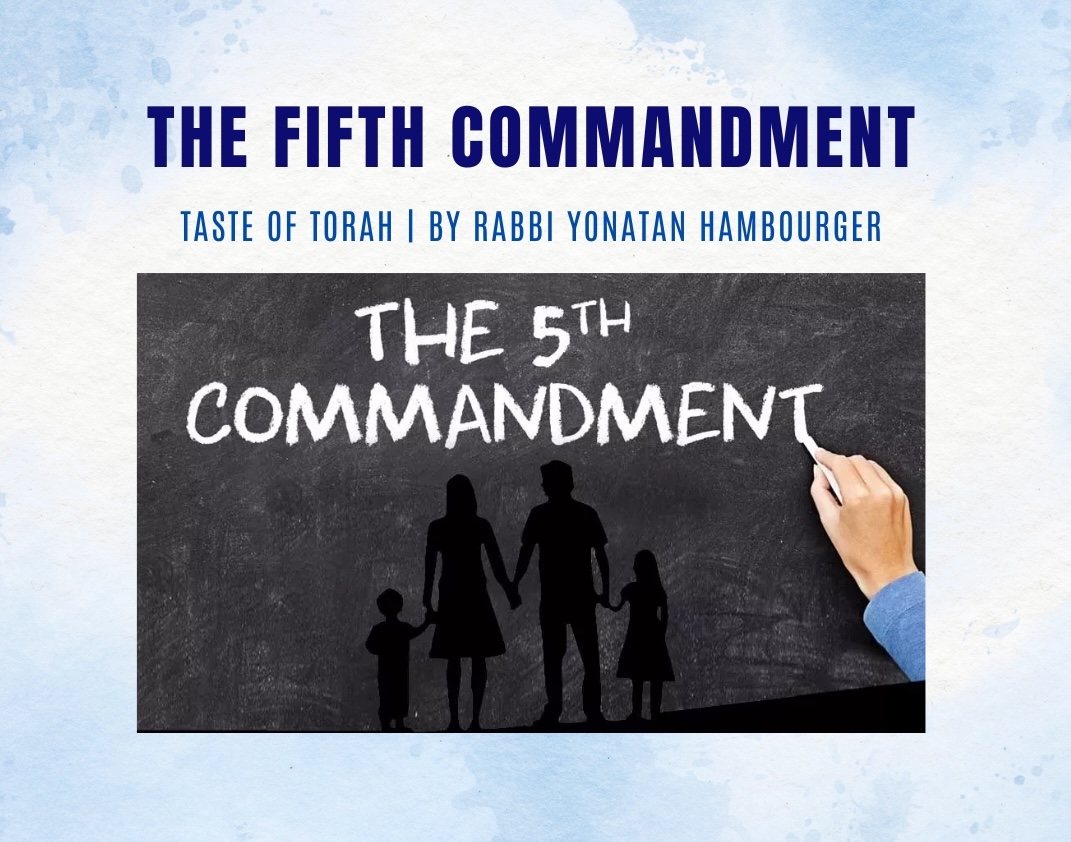
The Fifth Commandment
What do we owe the people who gave us life—especially when the relationship is complicated or imperfect?
“Honor your father and your mother, so that your days may be long upon the land that the Lord your G-d gives you.” (Exodus 20:12)
This commandment appears in this week’s Torah reading, Parshat Yitro, at one of the most dramatic moments in the Bible: the revelation at Mount Sinai, where the Ten Commandments are given. Thunder, fire, and a trembling mountain frame principles meant to shape not only religious life, but moral civilization itself.
And yet, amid laws about faith and responsibility, the Torah pauses to speak about family.
That placement is striking. Honoring parents often feels like a private value, perhaps even a deeply personal one. But the Torah places it among the Ten Commandments, alongside laws that speak directly about our relationship with G-d. Jewish tradition has long understood this as intentional. Honoring parents is not merely good manners. It is a moral foundation.
Our parents are the first people through whom we encounter care, sacrifice, and responsibility. Long before we form beliefs or articulate values, we learn what it means to receive something we did not earn. In that sense, honoring parents trains us to recognize that life itself is a gift—not a possession.
I once heard someone remark that they only began to understand their parents’ choices after finding themselves awake late at night, worried about a child of their own. Nothing dramatic changed—just a quiet recognition of how much effort had once gone unnoticed. That moment of clarity came not from perfection, but from perspective.
The Torah does not assume that family relationships are simple. It does not ask us to deny pain or rewrite difficult histories. Honoring parents does not require pretending everything was ideal. Rather, it asks us to acknowledge origin without sentimentality. Gratitude, here, is not emotional gloss—it is humility.
Classical Jewish teachers explain that to honor parents is to recognize that we did not create ourselves. Our lives rest on foundations laid by others, often quietly and imperfectly. A traditional metaphor compares honoring parents to respecting the roots of a tree. Branches may grow unevenly or even break, but without roots, no growth is possible at all.
This teaching feels especially relevant in a culture that celebrates independence and reinvention. We praise self-made success while overlooking how much it relies on inheritance—language, values, opportunity, even care itself. The Torah’s commandment offers a gentle correction. Before we demand rights, we practice gratitude. Before we shape the future, we acknowledge the past.
That may be why honoring parents stands among the Ten Commandments. The Torah suggests that a society capable of moral clarity must first learn humility. When we recognize what we have received, we become more responsible for what we pass on.
At the moment of revelation, the Torah reminds us that reverence for G-d and respect for our origins are not separate values. They are part of the same moral vision—one that begins with gratitude and leads to a sense of responsibility.
I wish you a good week and Shabbat Shalom,
Rabbi Yonatan Hambourger
January 29, 2026
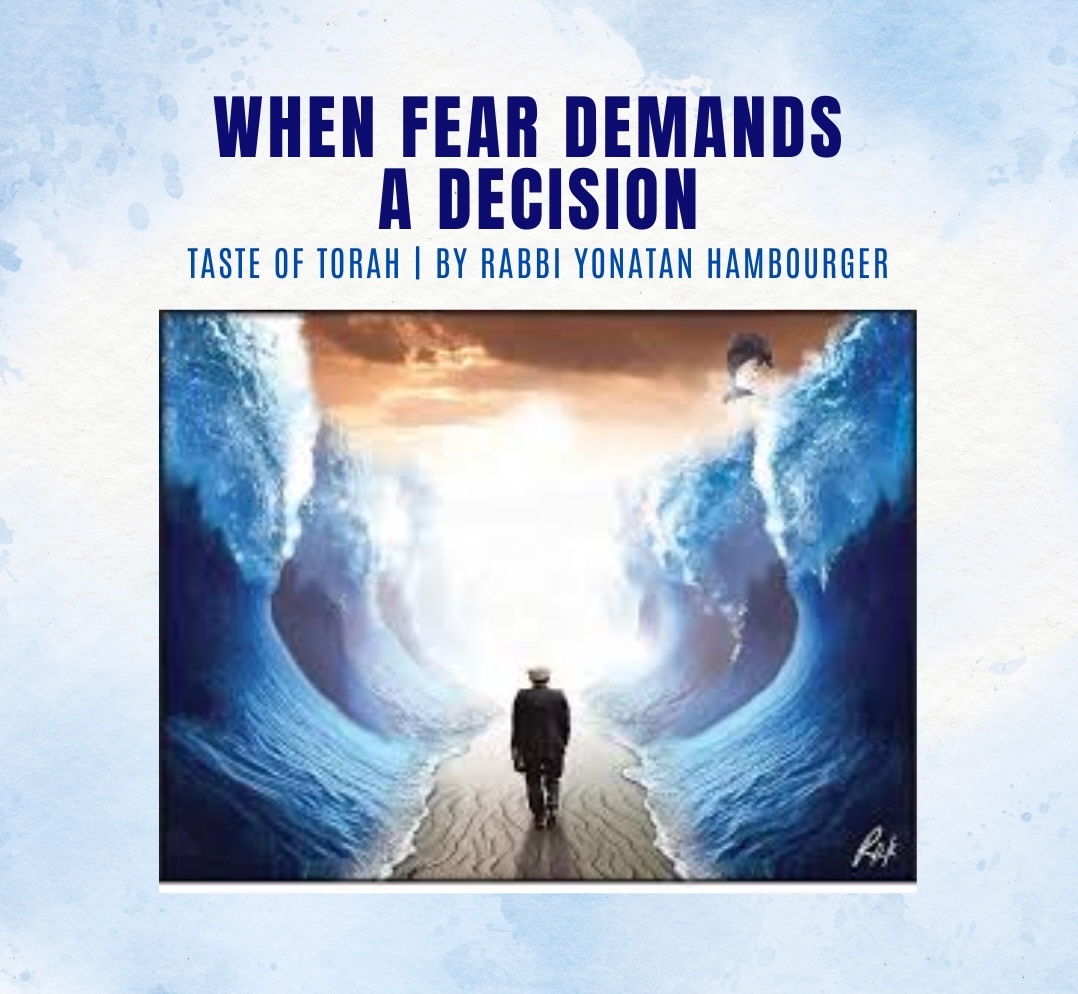
When Fear Demands a Decision
Have you ever faced a moment where every option felt wrong, every path blocked, and fear grew louder than clarity itself?
“Why are you crying out to Me? Speak to the Israelites and let them journey forth! As for you, lift your staff…” (Exodus 14:15–16)
The Israelites stand trapped—sea before them, Egyptians behind. The Mechilta and Rashi describe four responses: one group urging surrender, one preparing to fight, one lost in prayer, and one ready to leap into the sea. These categories are ancient, yet instantly recognizable. Most of us know what it feels like when our inner life fractures under pressure: one part craving escape, another spoiling for a fight, another waiting for rescue, and another ready to give up.
But G-d redirects all four: “Let them journey forth.” Step. Move. Begin—even before the path is clear.
Still, how do you walk into a sea? How do you act when the world ahead looks like a wall?
The Midrash answers with a person: Nachshon ben Aminadav. He walked in first—ankle-deep, then knee-deep, then waist-deep. The water was cold and endless, but he kept going until it touched his neck. Only then did the sea split. His act did not follow a miracle; the miracle followed him.
Classical commentators describe this as faith becoming courage. Chassidic philosophy adds a quieter insight: within every person is a spark of divine strength, like an ember beneath ash. Movement—however shaky—stirs that spark back to flame. As the sages teach, miracles respond not to perfect confidence, but to movement.
Maimonides echoes this balance: we pray as though everything depends on G-d, and act as though everything depends on us. Moses lifts his staff; the people take a step; G-d parts the sea. Redemption unfolds through partnership.
We meet our own “Reed Sea” moments more quietly:picking up the phone to repair a strained relationship,writing an apology we’ve avoided,making a difficult appointment,facing a diagnosis,or choosing honesty in a conversation that scares us.
Stepping forward rarely feels bold. Often it feels awkward, trembling, uncertain. But the Torah does not ask for certainty—only courage in motion. The size of the act matters less than its honesty. What matters is simply that you move.
Even small steps break the power of paralysis: a five-minute prayer, a journal entry that names the truth, seeking guidance from someone wise, or committing to one act that nudges life toward wholeness. These are our Nachshon steps—small, steady awakenings of the light inside.
Nachshon teaches us that the sea does not split before we enter it.It splits because we do.
What is the next small step waiting for you?And what might shift if you choose courage over certainty—acting even before the path is fully clear?
May we be blessed with the strength to wade in,and may we discover that even the deepest waterscan part before us.
I wish you a good week and Shabbat Shalom,
Rabbi Yonatan Hambourger
January 22, 2026
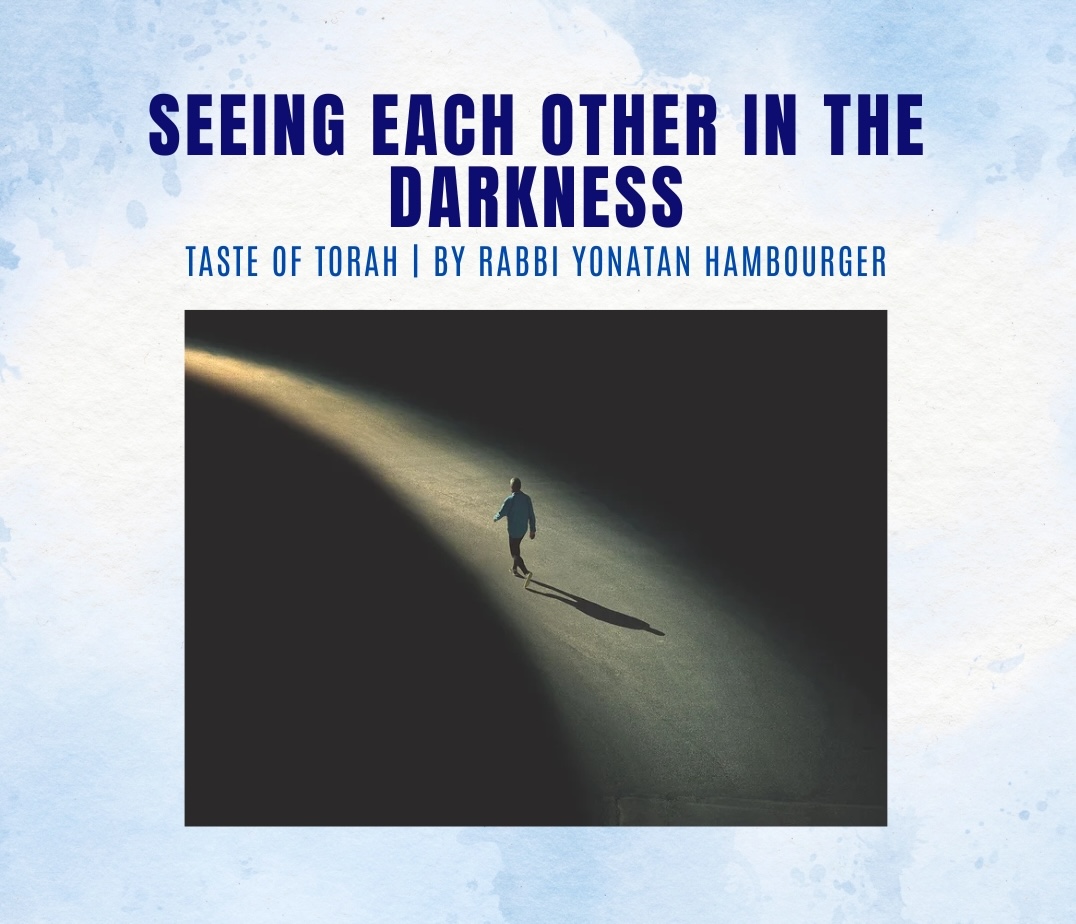
Seeing Each Other in the Darkness
Have you ever stood in the same room as someone else, only to realize you’re living entirely different experiences—one in light, the other in darkness?
“No one could see anyone else or move about for three days. Yet all the Israelites had light in the places where they lived.” (Exodus 10:23)
This week’s reading describes a darkness unlike anything earlier in the plagues. It does not break objects or bodies. It breaks connection. The Egyptians cannot see one another; they cannot move toward one another. The Torah hints at a blindness deeper than eyesight—an isolation that freezes the human heart.
The Israelites, however, “had light in all the places where they lived.” As the commentator Or HaChaim notes, the Torah doesn’t say they had stronger vision—it says they had light. Their illumination was not merely physical; it was relational. They could see and be seen.
Jewish tradition deepens this contrast. The Midrash describes Egypt’s darkness as spiritual blindness—an inability to perceive another person’s humanity. And the Beit HaMikdash in Jerusalem offers a counter-image: its windows were narrow on the inside and wide outside, built not to draw in light but to shine it outward. True spiritual light begins within a person or a community, then radiates outward.
Chassidic philosophy echoes this idea with a teaching from the Talmud (Chagigah 12a): that there is a form of light “not dependent on the sun”—an inner radiance that comes from awareness of the divine spark within every human being. When a person sees others through that lens, their presence becomes a kind of light for those around them.
Darkness, in this sense, is not the absence of daylight but the absence of attention. When people stop noticing one another, they begin living in separate worlds, even while standing side by side.
We experience this today in quieter forms:Walking past a colleague lost in your own worries.Missing the loneliness behind a friend’s polite smile.Failing to see the exhaustion on the face of a parent, child, or spouse.
It is entirely possible to share space yet live in different emotional weather—one in dusk, the other in daylight.
This isn’t just ancient history. Our own inwardness can create its own Egypt. And our capacity to attend to one another—to look up, look in, and look out—creates light “in the places where we live.”
The parable of the Temple windows offers a path forward. If inner light is meant to shine outward, then small acts of presence become spiritual architecture:A phone call to someone who’s been unusually quiet.A warm message sent without an occasion.Meeting a loved one’s eyes and really listening.
Even when we feel unseen, offering light to others can soften the darkness within us. Light, the sages teach, grows by being shared.
Chassidic teaching adds this gentle reassurance: you don’t need to fix the whole room. Even a narrow window lets light through.
Where in your life is someone waiting to be seen?And what single gesture of attention could bring a little more light into their world—and yours?
May our attention create light for others, and may we discover that in brightening someone else’s world, new light quietly returns to our own.
I wish you a good week and Shabbat Shalom,
Rabbi Yonatan Hambourger
January 15, 2025

Breaking the Shell
Why is it so hard to change—even when we know exactly what needs to change?
“But when Pharaoh saw that there was relief, he remained obstinate, paying no heed to them, just as G-d had said.” (Exodus 8:11)
This week’s Torah reading describes a pattern that repeats plague after plague: Pharaoh softens for a moment under pressure, but as soon as the suffering eases, his heart closes again. The simple meaning of the text reveals something familiar. Pharaoh’s resistance appears precisely when change becomes possible. When the crisis lifts and choice returns, he retreats into what he already knows.
Jewish tradition explores this stubbornness. The medieval commentator Ramban explains that after resisting again and again, Pharaoh eventually lost the inner freedom to respond differently. His heart grew heavy—weighted down by fear, pride, and habit.
Chassidic philosophy adds another layer. The Tanya, an 18th-century foundational work, describes the klippa, a spiritual shell that conceals a person’s inner light. This shell forms from old wounds, limiting beliefs, and the comfort of familiar patterns. All of us carry some klippa—places where we stay stuck even when our soul longs to grow.
Consider a seed. It looks small, hard, lifeless. Buried in dark soil, it seems forgotten. Yet moisture begins to soften its shell—just as a kind word, a moment of reflection, or even discomfort can soften our resistance. Pressure builds until the husk cracks. What looks like breaking is actually beginning. Transformation often starts with the unsettling feeling that something familiar is falling apart.
Pharaoh shows the opposite process. Each time his shell cracks—each time suffering shakes him awake—he quickly reinforces it. He rebuilds his defenses, so he won’t have to change. His tragedy is not only that he harmed others, but that he refused the invitation to grow.
In quieter ways, we do this too.We know we should ask for help or release a hurt.We know we should speak a truth we’ve avoided or step toward a healthier habit.But when the pressure lifts, old anxieties return. Change exposes us, and the familiar feels safer—even when it limits us.
Chassidic philosophy teaches that every sincere effort weakens the shell: a moment of prayer, a pause before reacting, an honest journal line, a conversation with someone we trust. Even a few quiet minutes with this week’s reading can open a crack where light enters. And sometimes we rebuild the shell. That isn’t failure. It’s part of the cycle.
The goal is not to eliminate resistance, but to outgrow it—to meet it with patience rather than shame, and to keep leaning toward the person we’re meant to become.
Where in your life do you feel that hidden “shell” resisting change?And what small, sincere step could soften it this week—so something new and beautiful has room to break through?
May your effort, however small, bring softness to what feels hardened, and may a quiet new beginning take root within you.
I wish you a good week and Shabbat Shalom,
Rabbi Yonatan Hambourger
January 8, 2025
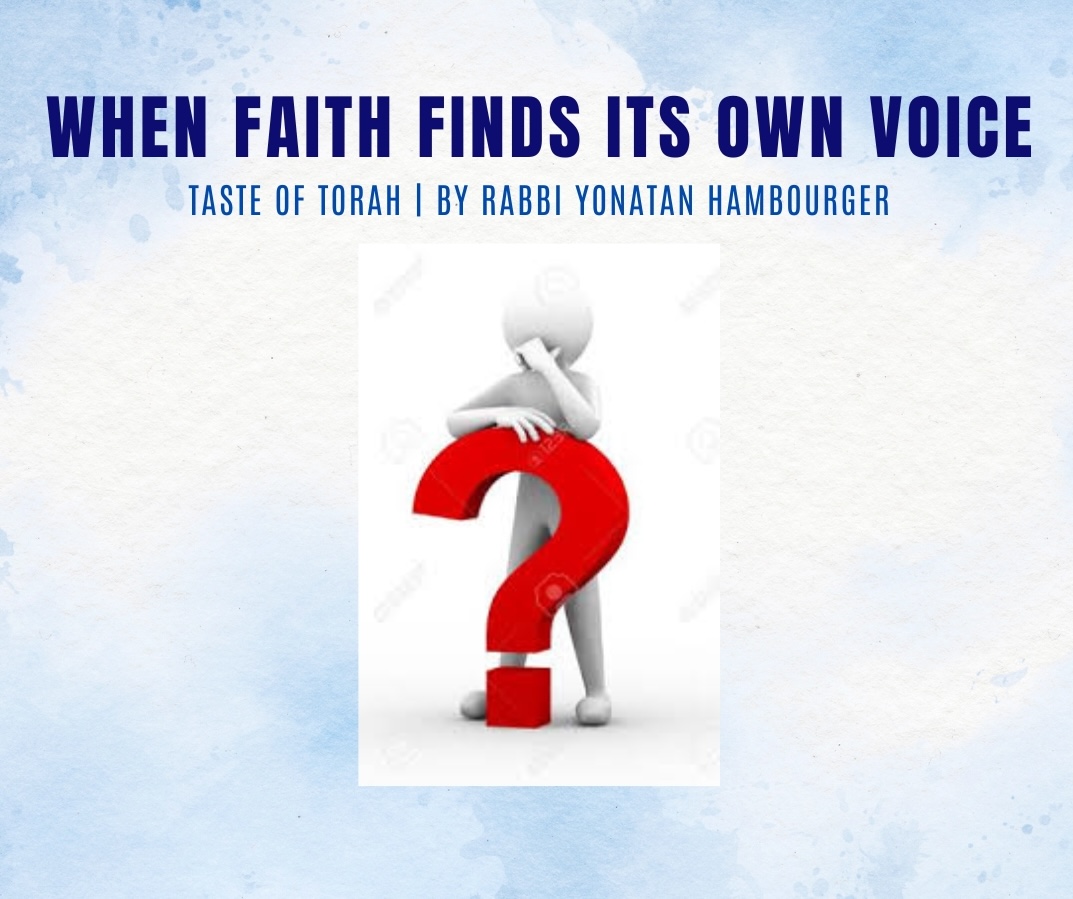
When Faith Finds Its Own Voice
Have you ever tried to do the right thing and watched everything get worse—and wondered why you were sent into that moment at all?
“Moses returned to G-d and said, ‘Why have You brought harm upon this people? Why did You send me?’” (Exodus 5:22)
This scene unfolds after Moses delivers G-d’s message to Pharaoh. Instead of relief, the suffering intensifies. Straw is taken away, quotas remain, and the people blame Moses for making their slavery even harsher. The seeming point is simple and devastating: Moses obeys, and things collapse. His first act of leadership is walking back to G-d in bewilderment.
Classical commentators note that this is bold. Rashi explains that Moses speaks “with a troubled heart,” not defiance. Sforno adds that Moses was trying to understand how increased suffering aligned with the promise he was sent to deliver. His question is not rebellion—it is relationship.
Chassidic thought deepens this. The Baal Shem Tov, founder of the Chassidic movement, taught that there is inherited faith—the kind passed from ancestors—and then there is earned faith, shaped in the places where our understanding frays. Moses is stepping into his own voice, discovering faith not as certainty but as willingness to bring confusion directly to G-d rather than letting it harden into silence.
G-d’s reply is strikingly sparse: “Now you will see what I will do…” (Exodus 6:1). No justification. No explanation. Just a promise that the next chapter is already in motion. Some commentators see comfort in this; others see a challenge. G-d does not answer Moses’ why—He answers his where now. Redemption begins before clarity arrives.
A simple metaphor may help. A child walks with her father down a dark path. The shadows frighten her. “Why are we here?” she asks. The father doesn’t map the entire journey; he simply tightens his grip. The fear doesn’t vanish, but it loses authority. Some questions are met not with explanations, but with presence.
Many readers struggle with the idea of questioning G-d. But Torah does not silence honest anguish. Abraham argued for justice. Jeremiah lamented suffering. Moses cries out here. Jewish tradition sees sincere questioning as a form of faith, not its opposite. It means we still trust G-d enough to stay in the conversation.
Our own lives contain moments that echo Moses’ cry:when a sincere decision backfires,when doing the right thing isolates rather than strengthens,when we step into a calling and immediately feel overwhelmed.
Staying in dialogue with G-d can take many forms: a whispered prayer, a journal page filled with raw honesty, a conversation with a mentor, showing up in community even when clarity feels distant. These small acts keep the heart from shutting down. They keep us connected to the One who walks beside us, even when we don’t yet understand the road.
As this chapter opens and the long story of redemption begins, Moses learns that leadership does not start with answers. It starts with courage—the courage to bring questions forward, not bury them.
Where in your life is faith asking you not for certainty, but for conversation?And may you find, in that conversation, the quiet strength to take the next step even before the path becomes clear.
I wish you a good week and Shabbat Shalom,
Rabbi Yonatan Hambourger
January 1, 2025
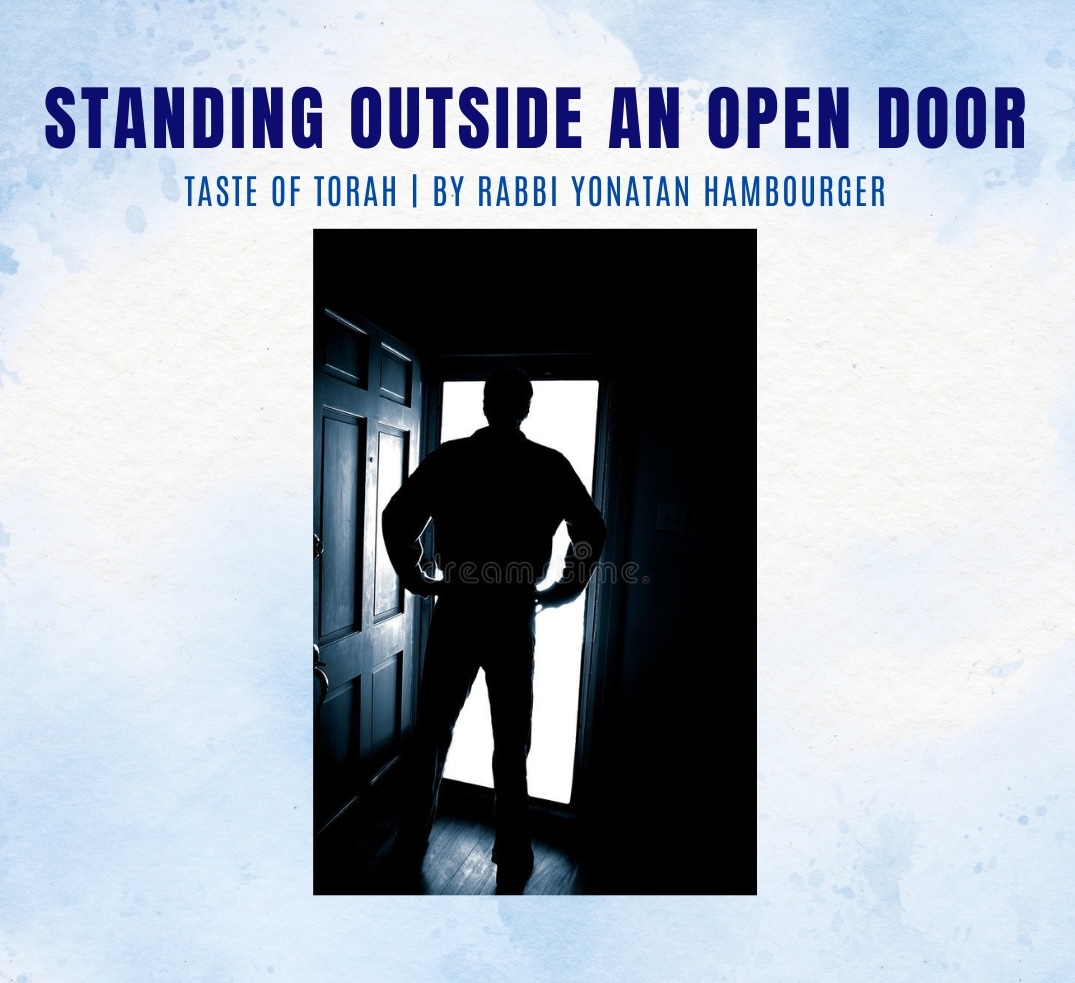
Standing Outside an Open Door
Have you ever been forgiven by someone—and still found it hard to believe?Have you ever carried guilt long after the other person laid it down?
“Please forgive the transgression of your brothers and their sin…” (Genesis 50:17)
This moment unfolds just after Jacob’s burial—a fragile hour when mourning and memory collide. The brothers fear Joseph’s kindness was only for their father’s sake. With Jacob gone, they imagine old resentments will resurface. Desperate, they send a message claiming Jacob commanded Joseph to forgive them—something Jacob never actually said. Their words come not from truth, but from fear.
What they cannot see is that forgiveness already happened seventeen years earlier. Joseph embraced them, spoke kindly, brought them to Egypt, and sustained their families. Yet their guilt kept whispering a different story. The past still had them by the collar.
At this point in the narrative, the question is no longer whether Joseph forgives them, but whether the brothers can trust forgiveness that has long been given. When they speak, Joseph weeps. His tears reflect a deeper sorrow: they cannot see themselves as he sees them.
Chassidic teaching notes that guilt can take two forms. One softens the heart and leads to growth. The other becomes a trap—convincing a person they are forever defined by a moment long gone. The Baal Shem Tov taught that a person may stand outside the gates of forgiveness even when those gates have already been opened—simply because they cannot believe they belong inside.
A simple image helps. Imagine someone who apologizes again and again, long after you’ve moved on. The relationship is whole, yet they replay the guilt as if it were yesterday. They’re not doubting you, but their own worthiness to return.
Joseph answers their fear with gentleness: “Do not be afraid… I will sustain you.” He not only absolves them; he offers safety. He invites them to trust the relationship’s wholeness. In doing so, Joseph becomes—not the source of forgiveness, but the messenger of a mercy already at work.
As Genesis ends, the family stands at the edge of a new chapter—one soon to become the story of a nation. To step into that future, they must learn not just to forgive, but how to live as people who have been forgiven.
This Torah portion invites us to notice where we resemble Joseph’s brothers:a mistake we still carry years later,a relationship we assume cannot fully heal,a moment of failure that echoes louder in our minds than anyone else’s.
Sometimes the work is not forgiving—but allowing ourselves to be forgiven.To stop living in the shadow of an old story.To trust that reconciliation can be real.To walk through the door that is already open.
Joseph didn’t need to forgive his brothers again; he needed them to believe they were forgiven.Where might forgiveness already be waiting in your life—unclaimed?And what step this week could help you finally walk through that open door?
I wish you a good week and Shabbat Shalom!
Rabbi Yonatan Hambourger
December 18, 2025
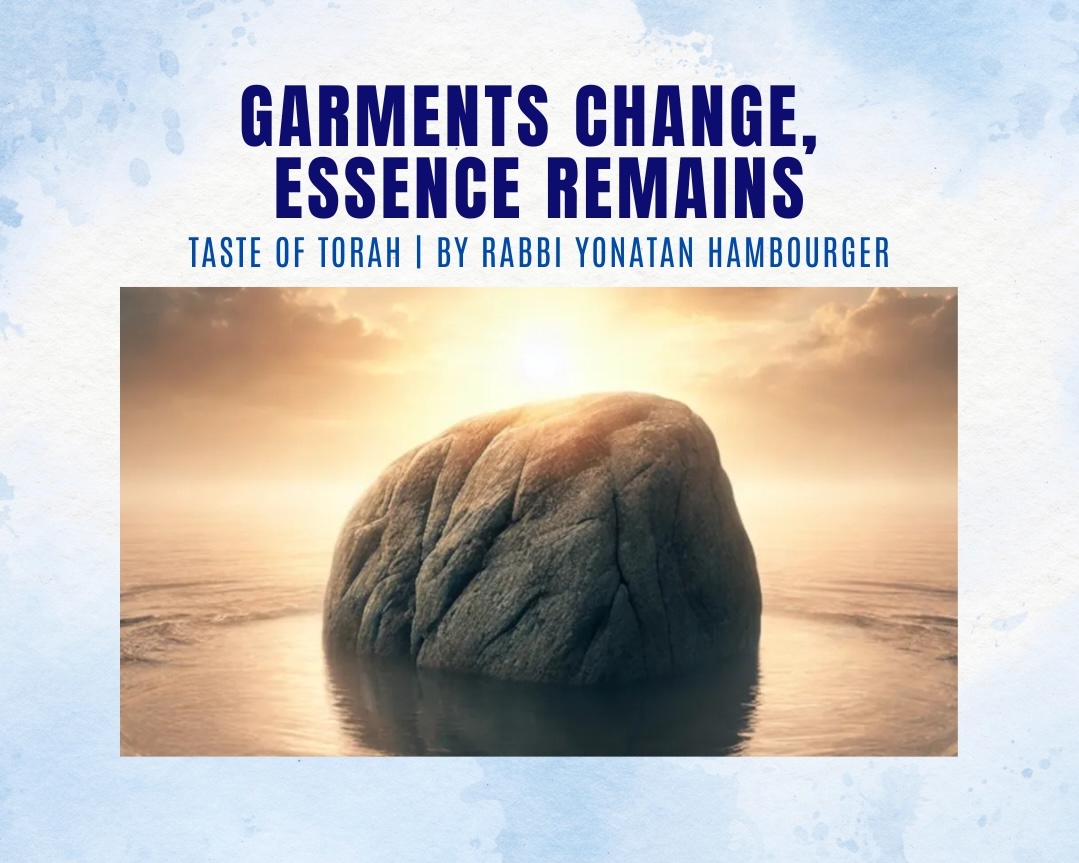
Garments Change, Essence Remains
Have you ever stepped into a moment that demanded a totally different version of you—so quickly your soul could barely keep up?
"Pharaoh sent and called Joseph, and they rushed him from the dungeon; he shaved, changed his clothes, and came before Pharaoh." (Genesis 41:14)
After years in prison, Joseph is suddenly brought before the most powerful ruler on earth. The Torah pauses over the physical details: rushed, shaved, dressed. These aren't incidental. The Hebrew roots hint at more than logistics: vayiratzuhu (“they rushed him”) conveys pressure and disorientation; vayegalach (“he shaved”) is rare in Torah, signaling a sharp break from his past; vayechalef simlotav (“he changed his garments”) suggests a new role and identity.
Why pause for such details? The text wants us to notice the inner cost of outward change. Transitions aren’t just logistical—they’re disorienting, sometimes even threatening to our sense of self. Here, Joseph is being re-made from the outside in.
The Midrash (Bereishit Rabbah 87:3) notes that Joseph “entered and exited with dignity” even in exile. Chassidic teaching expands this: Joseph could alter speech, dress, and demeanor as needed, but the flame within him didn’t flicker. His exterior adapted; his interior stayed anchored.
This was Joseph’s greatness. He lived in a world that changed constantly—pit, palace, prison, palace again—yet he never surrendered the quiet center that held him upright.
And life asks the same of us. We move between roles, pressures—work, family, community, shifts in health, loss, aging, seasons when everything familiar seems to slip away. The world demands that we “change garments.” Survival often demands it, too. But Joseph reminds us: adaptation isn’t the same as losing yourself.
When life becomes overwhelming, it’s tempting to let core values slide—to think, “I’ll get back to kindness when things settle,” or “I’ll hold onto honesty when the pressure lifts.” But Joseph teaches that it’s exactly in those rushed, unsettled seasons that staying anchored matters most. Integrity isn’t the prize for calm times; it’s the compass that guides us through storms.
Joseph’s leap from prison to palace also reveals a spiritual truth: Sometimes God prepares us for transformation long before doors open. Years of humiliation trained Joseph’s patience and compassion, and when the moment came, he didn’t stand before Pharaoh as a frightened prisoner, but as someone who knew who he was beneath the changed garments.
That is the question Mikeitz presses on us:When life changes quickly around you, what remains unchanged within?Is it your faith? Compassion? Moral clarity? Sense of purpose?
The world will insist you adapt, changing garments more times than you can count. But Joseph shows us that the deepest part of you—etched by God, shaped by faith—does not have to change.
What is one way, this week, you can stay anchored, no matter how your surroundings shift?
That’s the quiet strength Joseph carried from dungeon to throne room. And it’s the strength this parsha calls us to nurture in ourselves.
I wish you a good week and Shabbat Shalom,
Rabbi Yonatan Hambourger
December 11, 2025
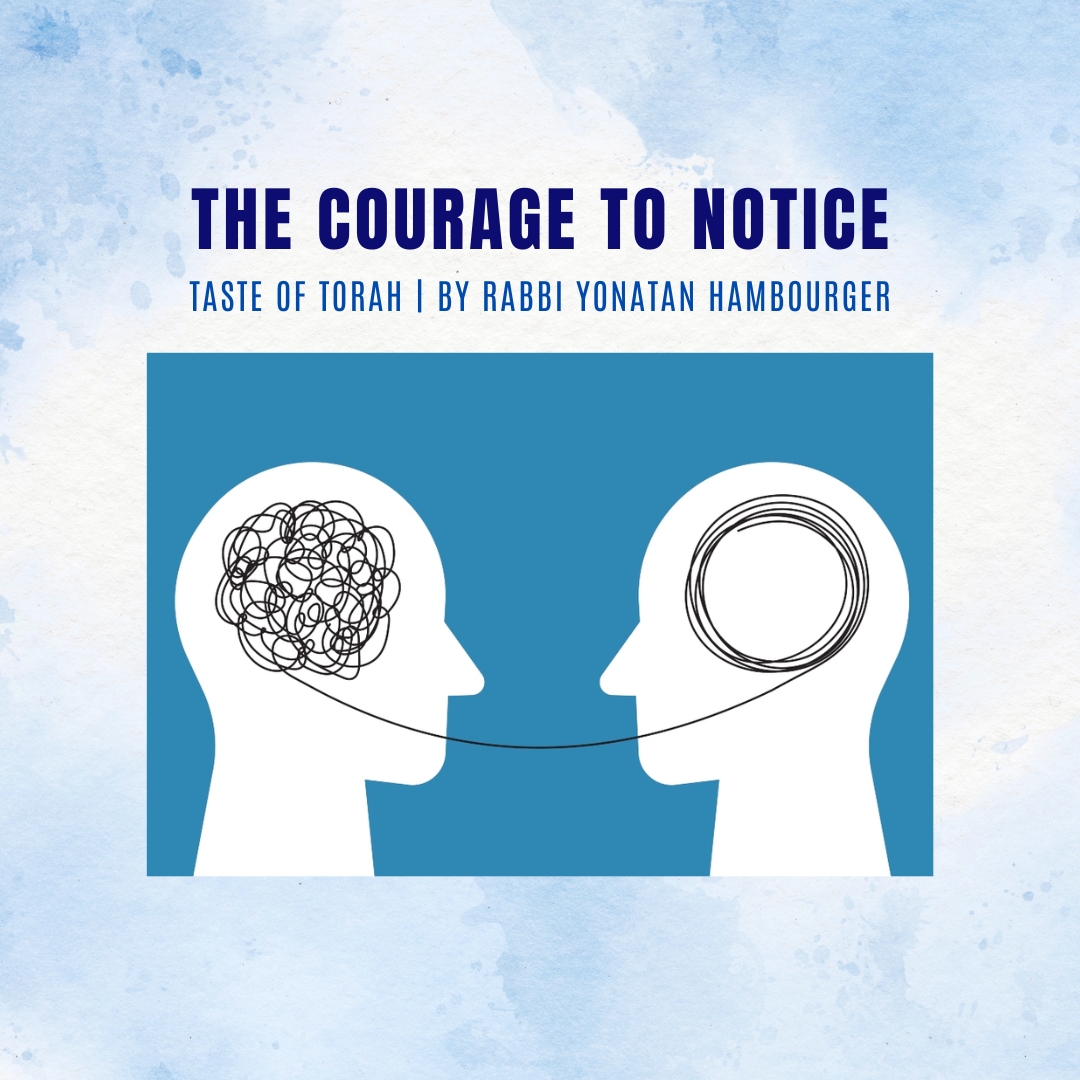
The Courage to Notice
Have you ever been so weighed down by your own worries that you barely noticed the people around you?
“When Joseph came to them in the morning, he saw that they were troubled. He asked Pharaoh’s courtiers, ‘Why are your faces downcast today?’” (Genesis 40:6–7)
It’s a simple question, but it changed history.
Joseph had every reason to turn inward. Betrayed by his brothers, sold as a slave, falsely accused, and now imprisoned in a foreign dungeon—he could have shut down emotionally, focused only on survival. Instead, he looked up, saw two strangers in distress, and asked how they were. That one act of compassion set in motion the chain of events that would lead him from confinement to Pharaoh’s palace, and from despair to redemption.
The Midrash (Bereishit Rabbah 84:10) teaches that Joseph viewed every encounter as divinely arranged. To him, no moment was random. Each meeting, even in the darkness of a prison, was a thread in G-d’s larger tapestry. When the butler and baker shared their dreams, Joseph listened with humility, saying, “Do not interpretations belong to G-d?” (Genesis 40:8). His gift of understanding was not an act of pride but of service—a channel for something greater than himself.
Chassidic teaching highlights something remarkable: Joseph is the first person in the Torah described as a successful man. When? Not in his father’s home, nor in Pharaoh’s court, but as a slave and a prisoner. The Tolna Rebbe explains that Joseph’s true success was his refusal to let hardship define him. Even when stripped of power, he chose dignity. Even when confined, he chose faith. His greatness was not that he escaped suffering but that he transformed it into purpose.
Of course, noticing others when we’re struggling isn’t easy. When life presses hard, even kindness can feel like another burden. Joseph’s question—“Why are your faces downcast today?”—isn’t the reflex of a man untouched by pain; it’s the choice of someone who refuses to let pain make him numb. Compassion, for him, wasn’t an extra—it was how he stayed human.
Think about how different our lives might look if we carried Joseph’s awareness into our daily routines. It might mean noticing the cashier who looks exhausted and saying something kind. Or texting a friend who’s gone silent. Or pausing long enough to really listen when someone begins a story you don’t have time for. These small, almost invisible gestures may not change the world, but they can change a person’s day—and sometimes that’s where redemption begins.
Faith in Providence doesn’t mean accepting everything that happens; it means meeting each moment with presence, trusting that even small acts can carry eternal weight. Every kindness, every word of comfort, every time we lift our eyes beyond ourselves, we become co-authors of redemption.
True success, Joseph teaches, isn’t measured in power or comfort but in how we respond to struggle—with humility, empathy, and hope.
What would it look like this week to lift your gaze from your own troubles long enough to notice someone else’s? Like Joseph, you might discover that the path to freedom often begins with the courage to care.
Wishing you a good week and Shabbat Shalom,
Rabbi Yonatan Hambourger
December 4, 2025
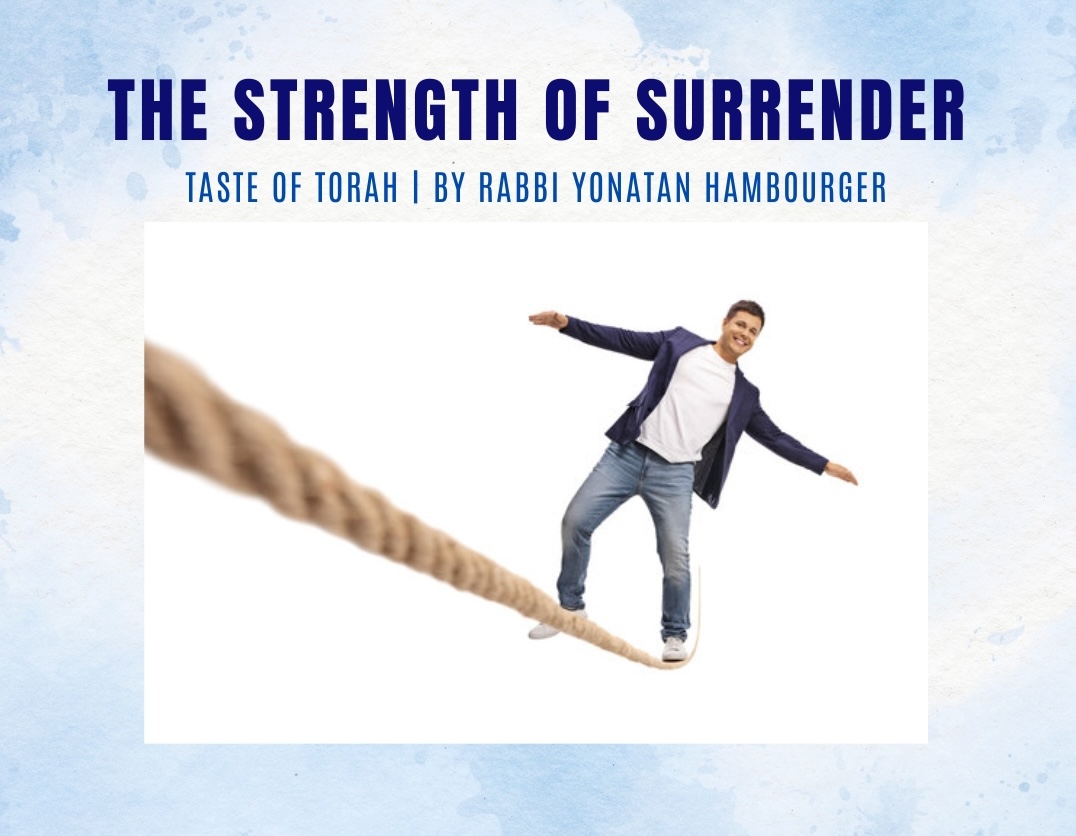
The Strength of Surrender
Have you ever faced a moment when you had done everything right, yet still felt powerless to control what came next?
“Then Jacob was greatly afraid and distressed; and he divided the people who were with him, and the flocks and herds and camels, into two camps.” (Genesis 32:7)
Jacob knows that feeling. After years of struggle, he learns that his brother Esau is approaching with four hundred men. The wound between them has never healed, and fear floods him. Though Jacob carries G-d’s promises, he still prepares for the worst—dividing his camp, sending gifts, and finally, turning to prayer.
“I am not worthy of all the kindness and faithfulness You have shown me.” (Genesis 32:10)
I wonder sometimes whether Jacob’s prayer was faith or panic—maybe both. I’ve known both. We pray because we believe, but also because we’re desperate. Jacob had done everything he could, yet the future still lay beyond his reach. His prayer was not weakness—it was the courage to admit he could no longer control the outcome.
The Midrash teaches that Jacob prepared in three ways: with gifts, with strategy, and with prayer. Chassidic teaching adds that this prayer was not merely for safety but a turning point. Jacob realized that strength built on control is brittle, but strength grounded in faith can bend without breaking.
That night, he wrestles with an angel until dawn. He refuses to let go until he receives a blessing, but the blessing comes with a wound. When morning breaks, Jacob limps forward, renamed Israel—“one who struggles with G-d.” Was the blessing worth the limp? Did he win, or merely survive? The Torah doesn’t say. Maybe that’s the point. Some blessings are so entwined with pain that we spend a lifetime learning what they meant. The man who once reached for blessings with his hands now carries one etched into his soul.
A tightrope walker offers a modern image. High above the ground, she feels the wire tremble beneath her. Instinct urges her to grip harder, to fight the wind. But balance comes only when she softens her stance, trusting the wire’s tension itself. Jacob’s story teaches the same truth: sometimes we find balance not by clinging, but by letting go.
Surrender doesn’t mean inaction. Jacob still bows before Esau and sends gifts—but now his actions rise from humility rather than fear. Faith isn’t the absence of effort; it’s the refusal to believe we’re the only ones steering.
Most of us have lived this story in our own way—a family rift that resists repair, a decision we can’t undo. Like Jacob, we plan, we prepare, and then we face the moment where preparation ends and trust begins.
Jacob limps toward Esau expecting confrontation and finds, instead, an embrace—arms where he braced for blows, forgiveness where he feared revenge. But the limp remains. Maybe faith doesn’t steady our walk—it just keeps us walking, limp and all.
So perhaps the real blessing isn’t that Jacob survived the night—it’s that he learned how to live with the limp. What would it look like this week to stop fighting the wind and find your balance within it?
Wishing you a good week and Shabbat Shalom,
Rabbi Yonatan Hambourger
November 27, 2025

The Ladder That Won’t Let Us Stand Still
Have you ever looked up from your phone after scrolling for what felt like minutes, only to find an hour gone — and nothing in you had really moved forward? That unsettling feeling of drift is what Jacob faces on his first night away from home.
“Jacob had a dream: a ladder set on the earth, its top reaching toward heaven, with angels ascending and descending.” (Genesis 28:12)
Jacob’s dream comes at a moment of crisis. He is leaving the safety of his parents’ home, fleeing from Esau’s anger, and heading into an uncertain future. Alone, vulnerable, and with nothing but a stone for a pillow, Jacob receives a vision of a ladder connecting earth and heaven. Why Jacob, and why now? Because he is in between — no longer who he was, not yet who he will become. The ladder tells him: even in transition, especially in transition, you are meant to keep climbing.
Chassidic teaching puts it this way: life is never static. Just as a person on a ladder cannot freeze in place without slipping, so too with the soul. We are either moving upward into growth or downward into stagnation. There is no neutral. Jacob needed this reminder because his journey would not be simple. He would face years of exile, conflict, and disappointment. The dream wasn’t just a glimpse of heaven — it was a map for survival.
And it’s not only ladders. Life is more like a down escalator: if you stand still, you’re already moving backward. Or like a treadmill: you can work hard and go nowhere if you’re not aiming forward. The point is the same — drift is dangerous. Only deliberate steps carry us upward.
The angels in Jacob’s dream remind us that growth isn’t steady or smooth. Sometimes we rise in inspiration, sometimes we fall into setback. But G-d tells Jacob, “I am with you.” The climb is uneven, but never lonely.
Think of a young woman learning piano. At first, every wrong note is discouraging. At one recital, she falters so badly she nearly quits. But her teacher tells her, “Every master was once a beginner who stumbled many times.” With practice, her failures become lessons. Slowly, mistakes turn into music. What once felt like failure is revealed as the process itself.
That is how life’s ladders work. Each day offers another rung disguised as a choice: pausing to listen instead of reacting in anger, speaking honestly when it’s easier to shade the truth, reaching out to mend a relationship rather than letting it drift. These are not dramatic leaps, but steady steps — the kind Jacob was called to take on his long journey.
So the question is not whether we have a ladder, but whether we’re moving on it. What would it look like for you, this week, to take one deliberate step upward — to refuse drift and choose growth?
Jacob’s dream still stands: a ladder planted on earth, its top reaching toward heaven, waiting for us to climb.
Wishing you a good week, and Shabbat Shalom,
Rabbi Yonatan Hambourger
November 20, 2025
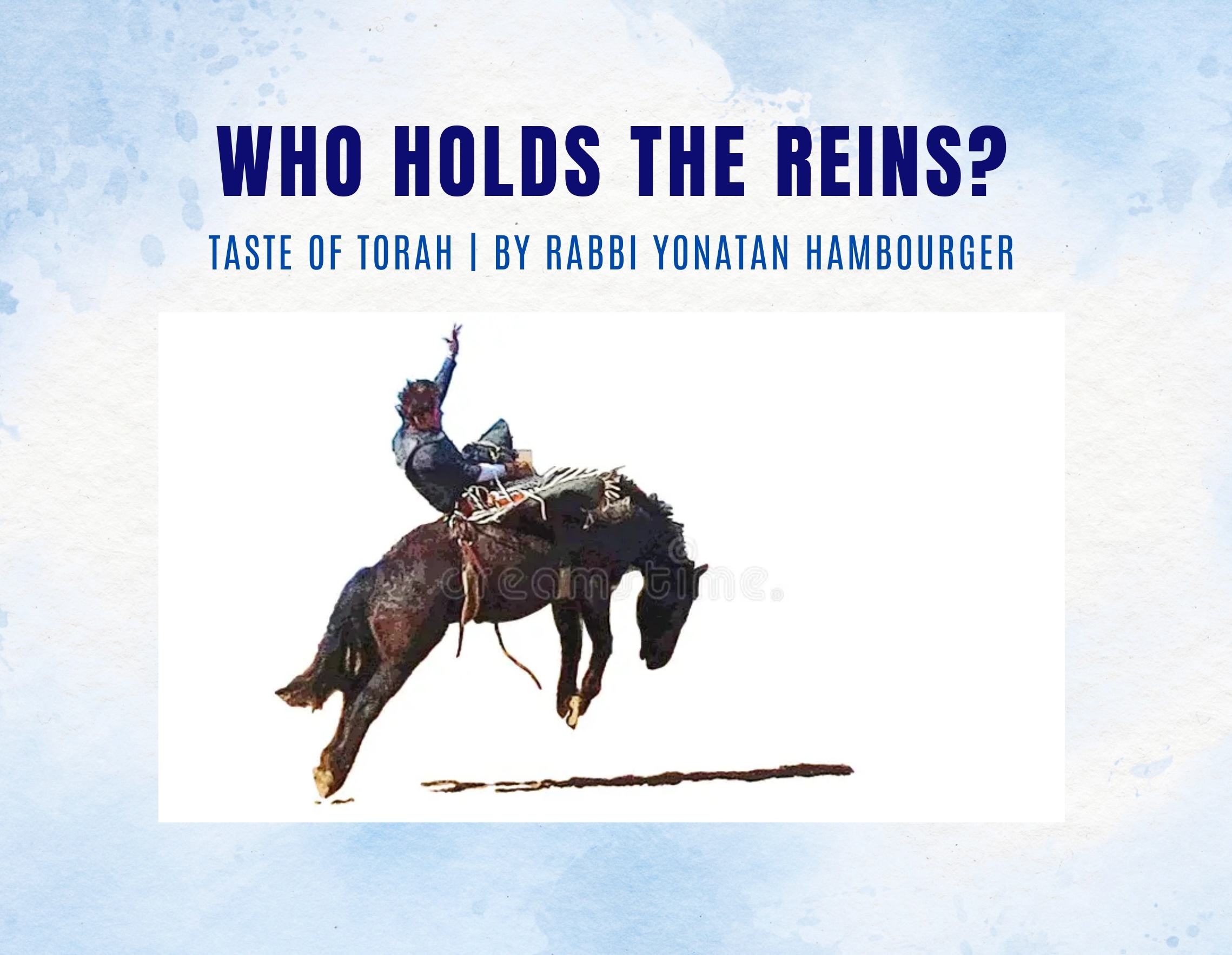
Who Holds the Reins?
Have you ever felt caught between two voices within yourself—one pulling you toward impulse, the other urging you toward something higher?
In the Torah, Jacob and Esau are twins with opposite natures. Esau grows into a rugged hunter, driven by appetite and instinct. Jacob becomes the quieter shepherd, shaped by reflection and spiritual pursuit. Even before their birth, G-d tells Rebekah: “Two nations are in your womb… the elder will serve the younger” (Genesis 25:23). From the start, their struggle embodies two very different ways of living.
Jewish tradition sees in these brothers a mirror of our inner lives. Esau represents our natural, instinctive self—the part of us that wants quickly, feels strongly, and pushes hard. Jacob represents the higher self—conscience, patience, and the desire to live with integrity. Just as Esau was born first, our instincts often rush ahead. But the Torah notes that Jacob’s hand grasped Esau’s heel, a sign that the higher self is meant to guide the lower, not trail behind it.
The Midrash teaches that this struggle is lifelong. Chassidic thought sharpens the picture: we each contain an “animalistic soul” and a “divine soul.” The challenge is not to erase one or the other, but to decide which one leads. Our instincts give us energy and passion, but they need direction.
Think of a powerful horse and its rider. The horse is strong, spirited, and full of drive. Without guidance, it may run wild. But with a steady hand on the reins, that very strength carries the rider far. Our impulses work the same way. Anger can turn into courage for justice. Desire can deepen love and loyalty. Ambition can be reshaped into service. The question is not whether we feel the pull of instinct, but whether we hold the reins.
And this is where life gets real. Who hasn’t blurted out words in anger, only to wish them back? Who hasn’t chased quick comfort, knowing it would leave them empty? We all know the tug-of-war inside. At times, Esau feels stronger. But the Torah promises, “the elder will serve the younger.” Instinct can be harnessed to serve conscience—if we pause long enough to steer.
So what does that look like in practice? It’s not always grand. It might mean swallowing a sharp remark and choosing patience instead. It might mean using ambition to build up others, not just yourself. It might mean letting compassion, not convenience, set your priorities for a day. Each small choice is a hand on the reins, guiding strength toward purpose.
Jacob and Esau are not just figures from the past; they live within each of us. The question is simple but urgent: Who holds the reins? This week, try one experiment. In a moment of temptation—whether to lash out, indulge, or cut corners—pause and ask: What would it look like right now for Jacob to guide Esau? That choice could turn raw energy into lasting strength.
Wishing you a good week and Shabbat Shalom,
Rabbi Yonatan Hambourger
November 13, 2025
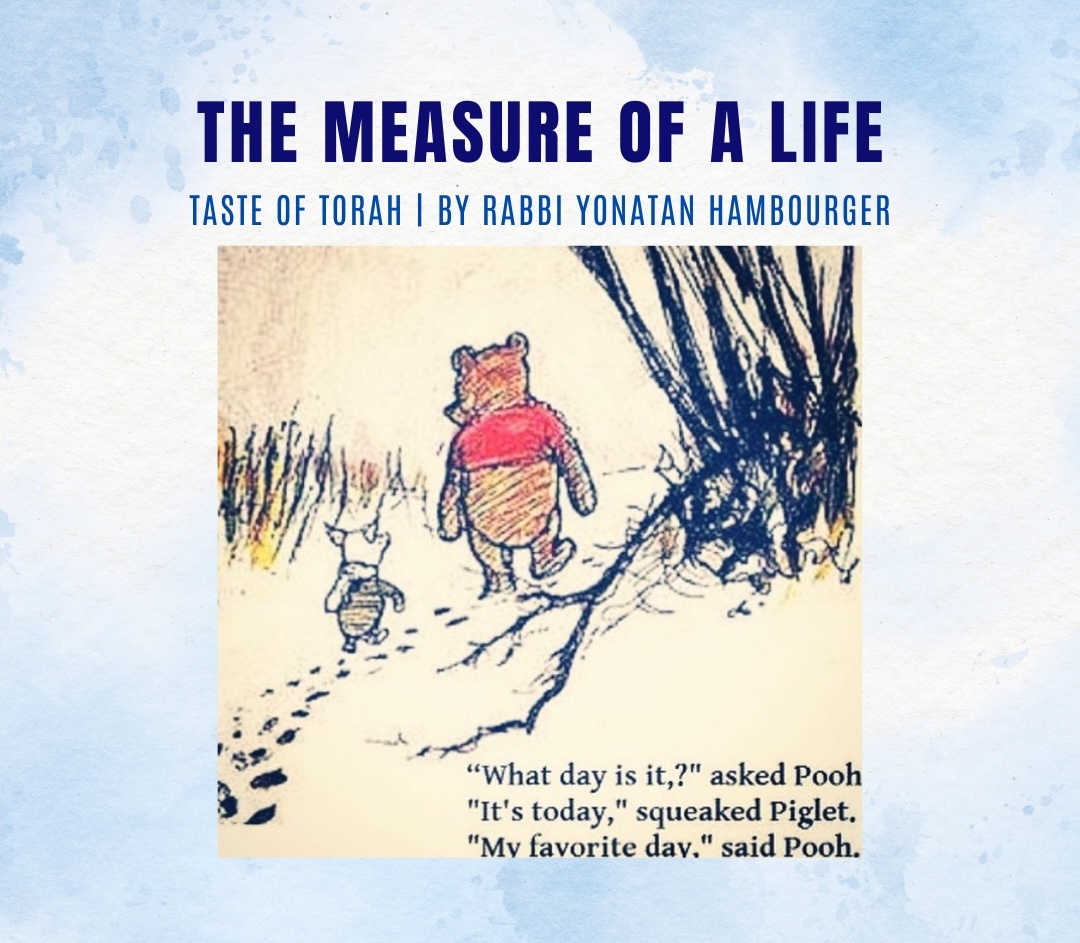
The Measure of a Life
Have you ever looked back on a stretch of time and wondered, “Did I truly live those days, or did they just slip past?”
“Abraham was old, he came in days.” (Genesis 24:1)
At first glance, this phrase sounds like a simple way of saying Abraham had grown old. But the Torah could have said zaken—“aged”—and left it at that. Instead it says ba bayamim—“he came in days.” The Midrash (Bereishit Rabbah 59:1) explains that Abraham’s days were “full.” Unlike someone who drifts through time, his days were accounted for, each one bearing its own weight and meaning. Chassidic thought adds that to “come in days” means to illuminate each day with spiritual light, to fill time with presence and purpose so that no day passes empty.
It’s striking that this phrase comes at a late stage in Abraham’s life. At ninety-nine, he circumcised himself, sealing the covenant that would bind the Jewish people to G-d for all generations. At one hundred, he became the father of Isaac. Later came the binding of Isaac, the supreme test of faith. After Sarah’s death, he purchased the Cave of Machpelah—the first piece of the Promised Land. He ensured Isaac’s future by arranging his marriage to Rebekah. Even then, he remarried and fathered more children. Abraham’s greatest acts came when others might have stepped back.
But if we’re honest, living with that kind of daily purpose is hard. Life easily slips into routine. I remember a season when I looked back at a week and realized I could barely recall a single meaningful thing I had done. The days had blurred together, eaten up by small tasks and distractions. That realization jolted me—it was a reminder that time is not endless, and that drifting is easy, but living with intention takes courage.
So what does it actually look like to “come in days” today? It may not mean grand gestures. It might mean calling a relative you’ve put off for too long, pausing to really listen when your child wants to talk, or offering help to a neighbor instead of rushing past. It could be sitting down to reflect for ten minutes before the day runs away. Each act, however small, transforms another passing day into one that is truly lived.
Even those who seem larger than life admit the struggle. Nelson Mandela spent 27 years in prison, much of it in harsh conditions. He later acknowledged moments of despair. Yet when he emerged, he chose not to drift but to invest his remaining years with intention, using each day to lead toward reconciliation. His story reminds us that vitality in later life is not automatic—it is the fruit of deliberate choices.
Why is it so difficult? Because distraction, fatigue, and grief are real. Because routine lulls us into thinking tomorrow will always be there. The Torah answers with Abraham: zaken ba bayamim—he entered into his days, refusing to let them slip by unmarked.
So what about us? What would it look like to treat tomorrow not as a day to be endured, but as a day to be entered? The measure of a life is not counted only in years but in the fullness we bring into each day.
Wishing you a good week and Shabbat Shalom!
Rabbi Yonatan Hambourger
November 6, 2025
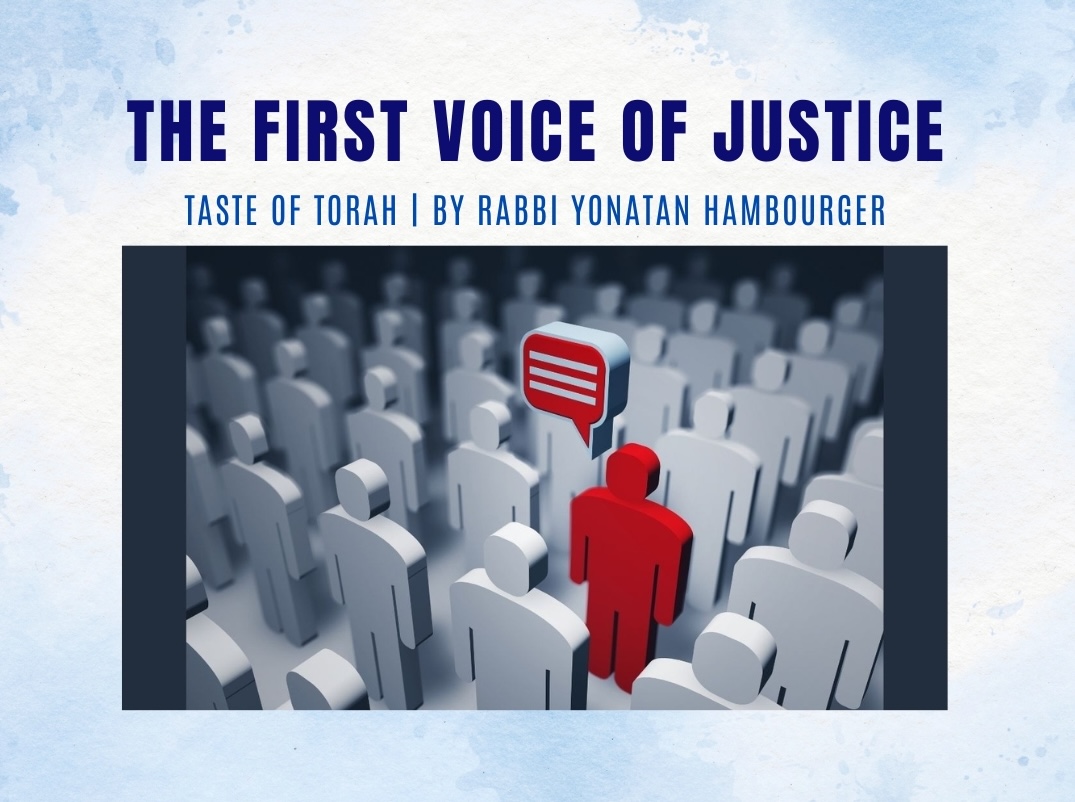
The First Voice of Justice
Have you ever felt the urge to speak up when something was wrong, but hesitated—wondering if your voice would matter? What does it take to raise your voice for others, even when the outcome is uncertain?
“Would You obliterate the righteous along with the wicked?” (Genesis 18:23)
Abraham’s words to G-d are among the boldest in the Torah. He dares to plead not only for the innocent, but for everyone in Sodom and Gomorrah. The Midrash—an ancient Hebrew commentary that offers deeper meaning and new insights beyond the literal text—pictures him standing before G-d like a lawyer before a judge. It is not arrogance, but fierce love for humanity. Chassidic thought adds that Abraham’s defining trait of chesed (lovingkindness) was not quiet or passive; it compelled him to fight for mercy, even for those who seemed beyond saving.
This was radical in its time. In ancient societies, self-preservation and loyalty to one’s own tribe were supreme values. Yet Abraham looked beyond his own circle and risked everything to defend strangers. His willingness to confront injustice, to stand in the uncomfortable place, became a model for moral courage. And even though his plea did not change the outcome, the struggle itself carried lasting meaning: faith demands that we try, even when success is uncertain.
A factory in a small town had been dumping waste into the river for years. The water smelled strange, and fish floated to the surface, but most people stayed quiet. The factory provided jobs, and no one wanted to rock the boat. At a town meeting, silence filled the room as officials prepared to approve another permit. Then a teacher stood up. Her hands trembled as she held a jar of cloudy river water. “This is what my students drink at lunch,” she said. The room stirred. Parents shifted uneasily. “If we poison the water, we poison our children.” For a moment, no one spoke. Then another parent stood beside her, and another. That night, the decision was delayed—and the silence in the town was broken.
We often underestimate how far a single voice can reach. A word in defense of fairness, a refusal to accept cruelty, a protest on behalf of someone overlooked—these moments ripple outward. Abraham’s greatness lay not in persuading G-d to spare the cities, but in showing that moral responsibility begins with the courage to speak.
Abraham’s words still hang in the air: “Would You obliterate the righteous along with the wicked?” His voice echoes in every act of courage today. Justice begins—again and again—whenever someone dares to speak.
Wishing you a good week, and Shabbat Shalom,
Rabbi Yonatan Hambourger
October 29, 2025
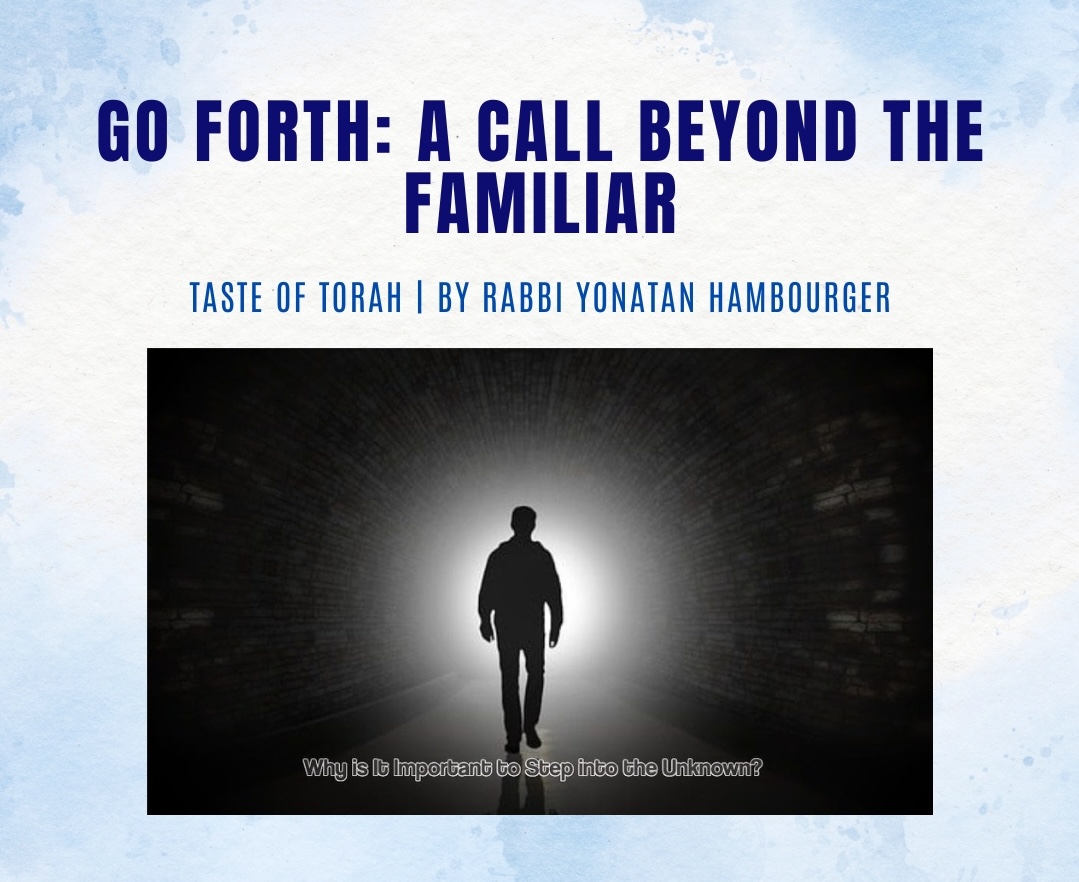
Go Forth: A Call Beyond the Familiar
Have you ever reached a point where the familiar no longer fit—when staying put felt safe, but something inside urged you to begin again? Moments like these raise unsettling questions: What must I leave behind, and who might I become if I step into the unknown?
“The LORD said to Abram, ‘Go forth from your land, your birthplace, and your father’s house, to the land that I will show you.’” (Genesis 12:1)
On the surface, lech lecha means “go forth.” But Chassidic masters taught that it also means “go to yourself.” The Baal Shem Tov explained that these words echo in every soul: leave behind the layers shaped by habit, fear, or environment, and move toward the essence of who you truly are. The Alter Rebbe, in Tanya, described this essence as the nekudah pnimis—literally, the “innermost point” of the soul. It is the core of who we are, untouched by habit, fear, or circumstance, and it is what shines through when we strip away the layers that conceal it.
Notice that G-d does not reveal the destination: “to the land that I will show you.” Growth cannot be mapped in advance. Chassidic thought teaches that this concealment is itself part of the journey. The very obstacles—the uncertainty, the struggle, the discomfort—are what create the conditions for growth. Just as a seed must break apart in darkness before it can take root, so too our challenges become the ground where transformation begins.
A parable tells of a gardener pressing a seed into the soil. To a watching child, it seemed the seed had been buried and lost. But the gardener explained: “The seed must split apart. Its hard shell must decay. Only then can roots reach down and a stem push upward to the light.” What seemed like destruction was the beginning of new life. Our struggles work the same way: when parts of us break open, when the familiar dissolves, space is made for growth that could not happen otherwise.
We know this is true in our own lives. The times we feel most disoriented—after loss, after change, after failure—are often the moments when we discover strength we didn’t know we had. Struggle is not the end; it is the soil from which transformation grows. Abraham’s greatness was not that he had certainty, but that he stepped forward anyway, turning surrender into possibility.
Lech lecha still calls. Like the seed splitting underground, each of us is asked to break open what holds us back—trusting that from the very place of struggle, new life will push through toward the light.
Wishing you a good week, and Shabbat Shalom,
Rabbi Yonatan Hambourger
October 23, 2025
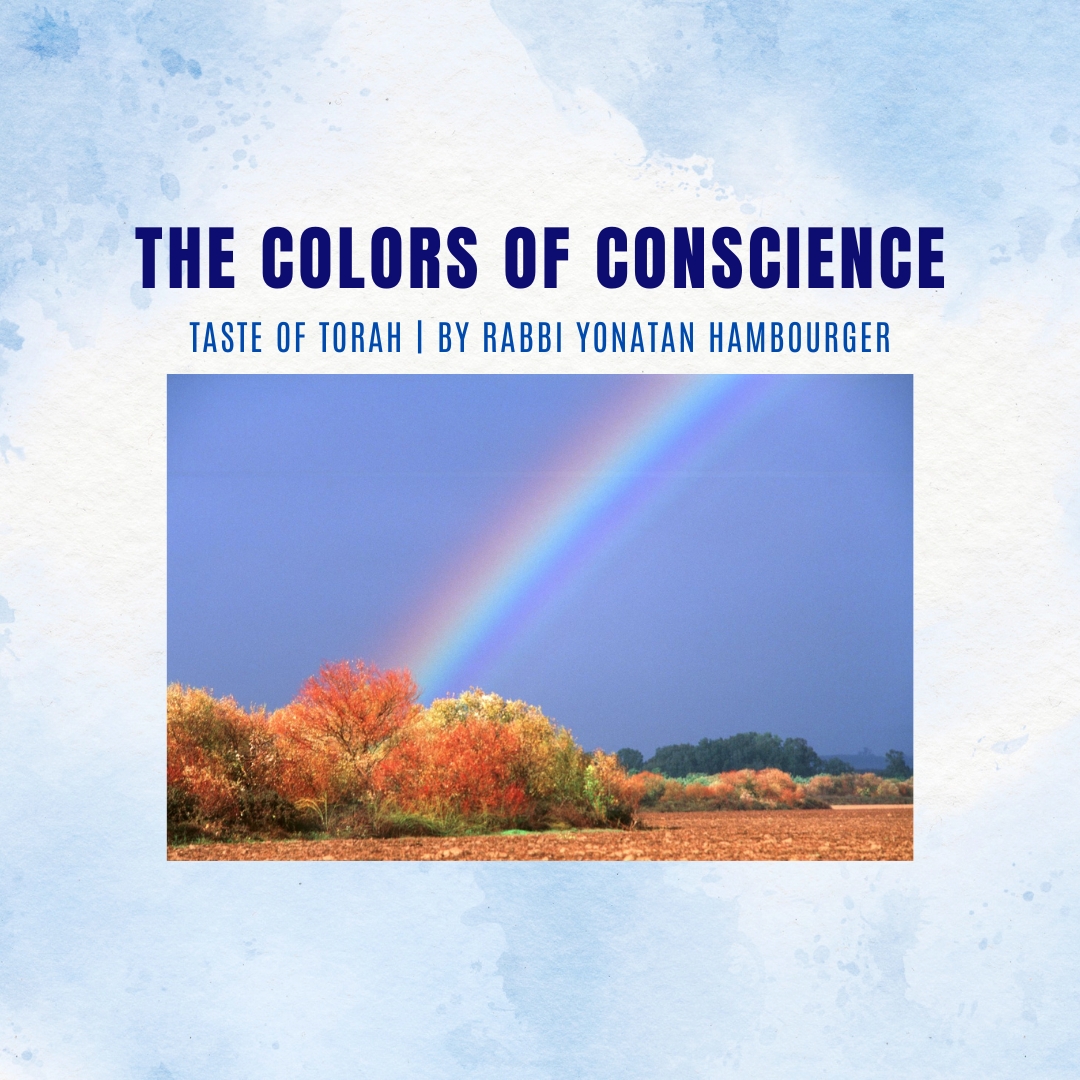
The Colors of Conscience
Have you ever faced a moment when life felt wiped clean—when the familiar was gone, and you had to begin again? It might come after loss, after disappointment, or in a season when the world itself feels unsettled. Starting over is never simple. It brings not just hope, but grief, confusion, and the risk of falling back into old patterns.
“I have set My rainbow in the cloud, and it shall be a sign of the covenant between Me and the earth.” (Genesis 9:13)
When Noah stepped out of the ark, the world was silent, stripped of what had been. The rainbow was more than G-d’s promise that the flood would not return. It was an invitation to try again. Chassidic teaching notes that the rainbow appears only after rain—light refracted through lingering drops of water. In the same way, growth often shines most clearly after hardship. The very storm that nearly undoes us can reveal hidden colors in the soul: kindness, discipline, humility, and compassion.
These virtues are not abstract. Discipline steadies us when grief tempts us to give up. Humility reminds us we can’t rebuild alone, that we need others beside us. Compassion moves us to notice those still struggling and to help them heal. Rebuilding does not just mean putting the pieces back together—it means reshaping life with new choices, often through trial and error.
A parable tells of a grandfather who took his granddaughter outside after a night of storms. She saw a flower blooming in the mud and asked, “Will the storms come back?” He answered, “There will always be storms, but every flower is a promise. If you care for what is good, beauty will return.” Like that flower, the rainbow is not only reassurance—it is a call to take responsibility for the hope we want to see.
G-d’s covenant with Noah asks: will we slip back into the ways that led to ruin, or will we choose differently? Gratitude over bitterness, fairness over favoritism, responsibility over neglect—these choices rarely come easily. Sometimes they come with false starts and faltering steps. But they are the choices that turn survival into renewal.
The rainbow still appears, bridging storm and sunlight. But its colors are waiting for us to carry them into our own lives. Each act of kindness, each moment of integrity, is a flash of light refracted through the storm—adding color to a sky that can shine brighter for everyone.
I wish you a good week and Shabbat Shalom,
Rabbi Yonatan Hambourger
October 17, 2025
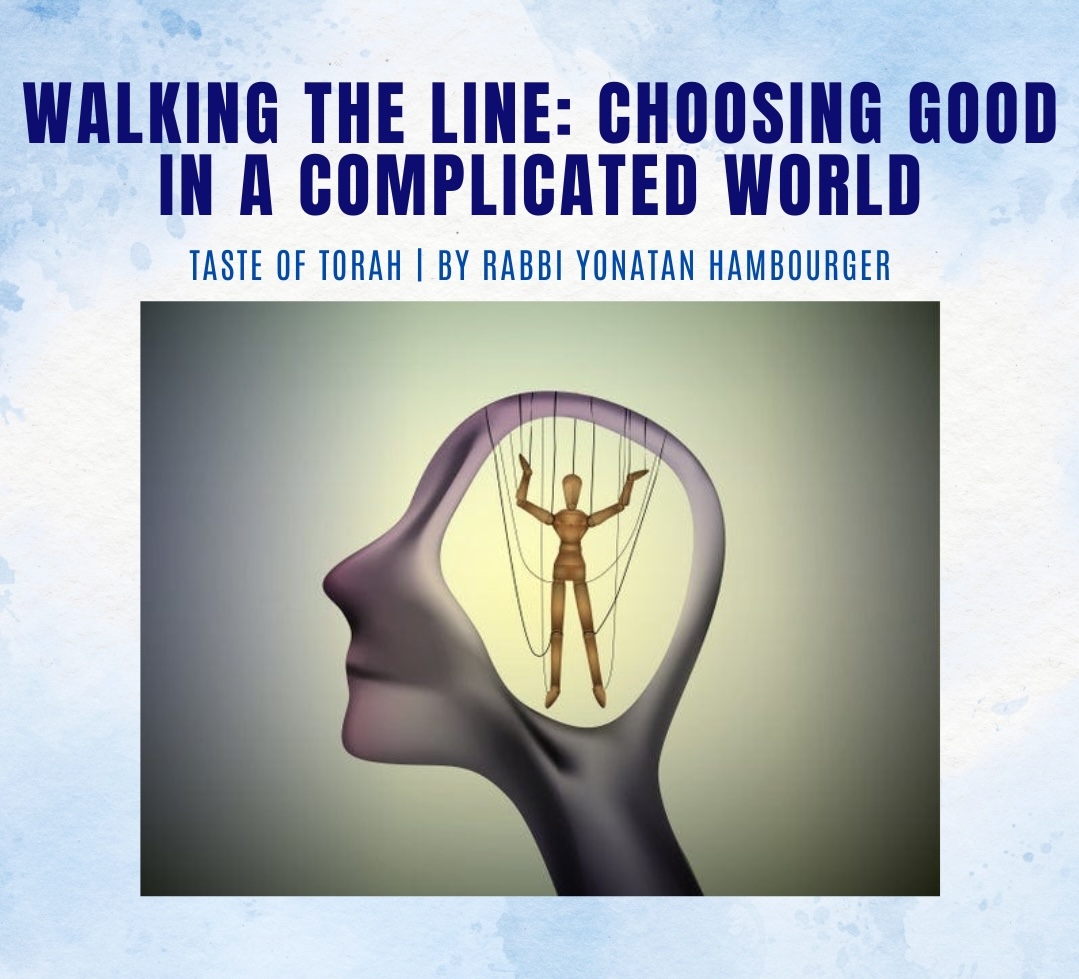
Walking the Line: Choosing Good in a Complicated World
Why is it so hard to make the right choice? We often know what is good, yet our decisions get tangled up in desire, doubt, or convenience. The Torah’s story of Eden is not only about humanity’s first mistake—it’s about the ongoing challenge, and opportunity, of moral choice.
“And the LORD G-d commanded the man, saying, ‘You may freely eat from every tree of the garden; but from the tree of the knowledge of good and evil, you must not eat’” (Genesis 2:16–17).
In Hebrew, the word for “knowledge” is da’at—not just information, but a knowing that binds head and heart. Before Adam and Eve ate from the fruit, good and evil were external and obvious. Once they tasted it, however, the struggle between good and evil became part of our inner lives. Right and wrong were no longer simple to separate; they became woven into human thought, desire, and experience.
The serpent didn’t force Adam and Eve to eat; it only suggested. The real change came when they made that suggestion their own. From that moment on, the human heart became the battleground where good and bad wrestle for expression. As Rambam (Maimonides) later taught, free will is always ours, but clarity is not guaranteed. Choosing the good path now requires vigilance and effort.
The sages sometimes taught through parables to help us see truth in everyday terms. A Chassidic Rebbe once pointed out a wild, overgrown garden outside his window. “When G-d created the world, everything was perfect. But He wanted us to be gardeners—to pull weeds, plant seeds, and bring order out of chaos. If everything stayed perfect, we would never grow. The struggle is what makes us partners in creation. Every time we sort through the tangle and find a little light, we transform ourselves—and the world.”
Adam and Eve’s choice brought us out of innocence and into responsibility. Life is not about avoiding struggle but about engaging with it faithfully. Each choice we make becomes part of the slow work of turning the wilderness back into a garden.
We may wish the path between good and evil were clearer, but our humanity is shaped by wrestling with complexity. Each time we choose honesty over convenience, kindness over indifference, or courage over fear, we are planting seeds. Each small act of clarity transforms the soil of our lives.
With every honest choice, we reclaim a patch of Eden.
Shabbat Shalom,
Rabbi Yonatan Hambourger
October 10, 2025
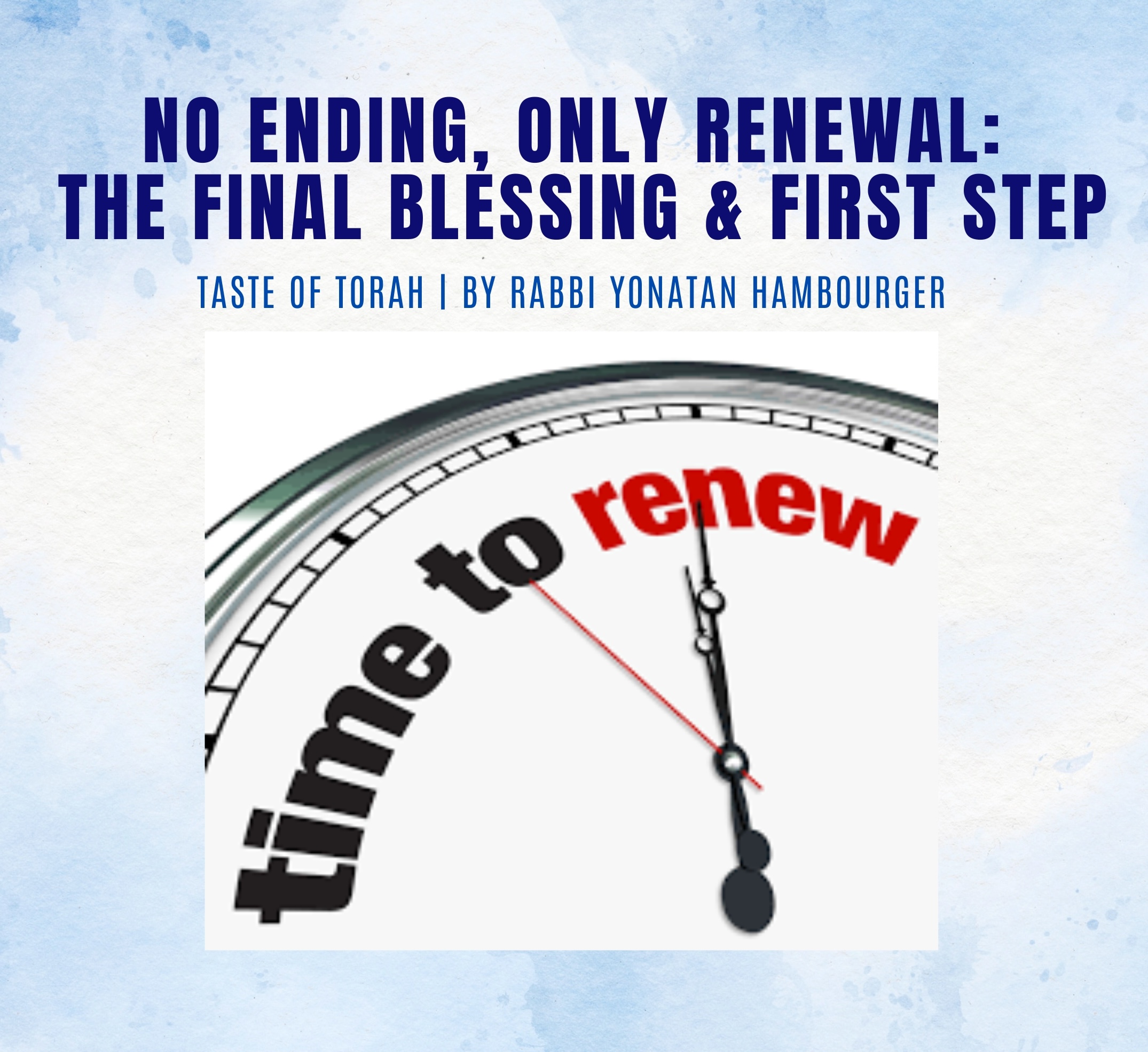
No Ending, Only Renewal: The Final Blessing and First Step
This week’s Torah portion, V’zot HaBerachah (“And this is the blessing”), doesn’t just mark the end of the Torah—it also marks the end of Moses’ journey. As Moses stands at the threshold of his final day, he gathers the tribes and offers them his parting blessings. The Torah says, “He loved the people; all his holy ones were in his hand; and they sat down at his feet; every one receives of your words” (Deuteronomy 33:3). There’s a tenderness in this moment—a sense that Moses’ leadership, anchored in love and hard-won wisdom, isn’t really ending at all. Instead, his voice carries on, woven into the very rhythm of the Torah’s eternal cycle, where every ending quietly gives way to a beginning.
What’s remarkable is that as soon as we read the last words of V’zot HaBerachah, tradition tells us to start over right away—with “In the beginning.” No pause, no time to process. The circle closes and opens in the same breath. This isn’t just a quirk of ritual—it’s a deep teaching: sof ma’aseh b’machshavah techilah, the end is wrapped up in the original intent. Our spiritual journey doesn’t move in a straight line; it loops and returns, always inviting us back to where we started, but with new eyes and a fuller heart. In this sacred circle, every conclusion is just the first step toward something new.
Moses’ blessings for each tribe are more than just words. He names their strengths, their quirks, their responsibilities. In doing so, he reminds us that we too carry gifts—talents, insights, passions—that are meant to be shared and nurtured. Like the tribes, we’re not just passive recipients of tradition; we’re active participants in an unfolding story, called to bring something unique to the world’s healing and renewal. The work is never done, but neither is the opportunity to begin again.
Jewish wisdom doesn’t promise easy progress. The Mishnah asks, “Who is wise? One who learns from every person” (Pirkei Avot 4:1). Growth can be slow, circuitous, even frustrating. Setbacks and struggles aren’t failures; they’re part of the journey, shaping us in ways we can’t always see at the time. Even our detours have value. The Talmud gives us that image of angels whispering to every blade of grass, “Grow, grow” (Berachot 5a). Life itself is urging us forward, nudging us to keep reaching, even on days when progress feels impossible.
So as we reflect on Moses’ legacy and the Torah’s endless loop, maybe the real blessing is this: the chance to start again, and again, and again. To greet each week, each year, each breath as an invitation to renewal. To notice the gifts in ourselves and in each other, and to bring them forward with courage and humility. The story doesn’t end. It just circles back, waiting for us to step in once more.
I wish you a good week and Shabbat Shalom!
Rabbi Yonatan Hambourger
October 03, 2025
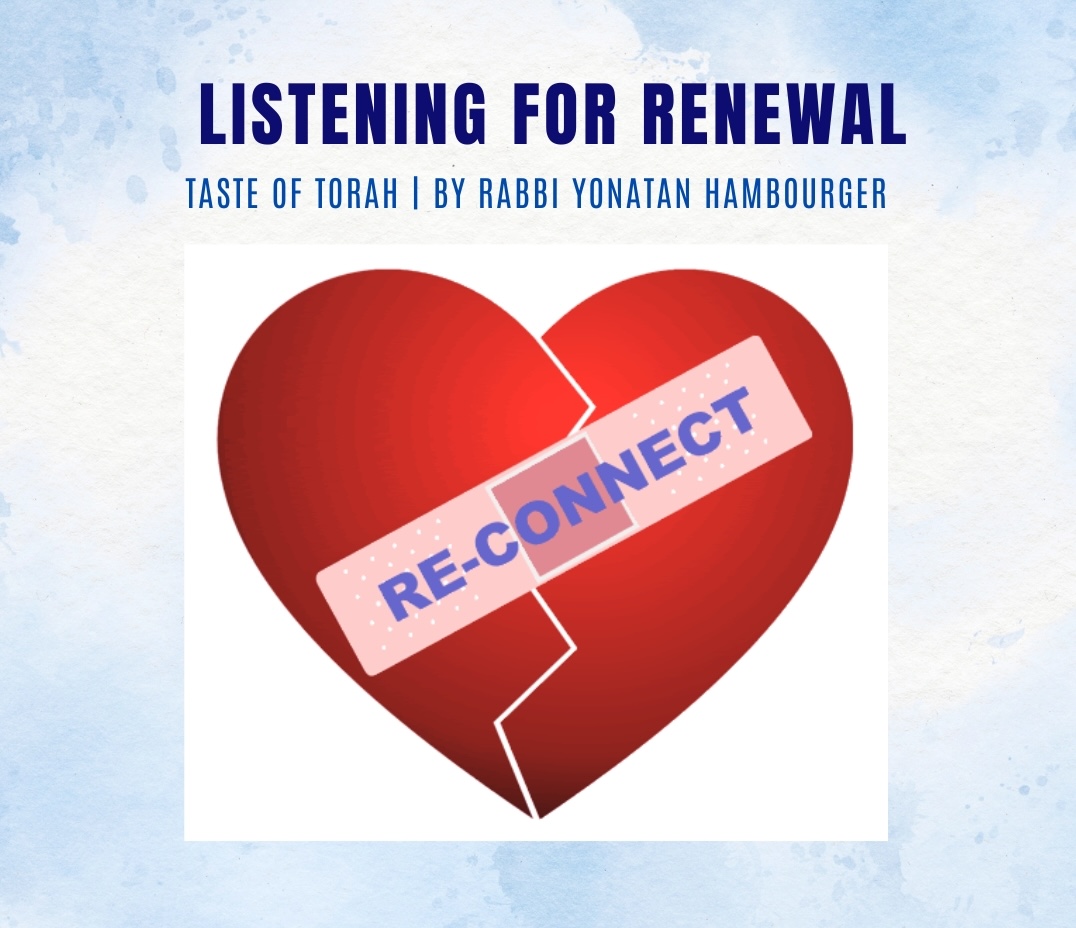
Listening for Renewal
This week’s Torah portion opens with the Hebrew word “Haazinu,” meaning “listen.” It’s more than a call for attention—it’s the beginning of a song Moses offers on his final day. Picture the scene: Moses, after a lifetime of leading, stands before his people, knowing he won’t enter the Promised Land. He pours his heart into this song, hoping his words will steady them for the journey ahead.
There’s something deeply human about this. Moses doesn’t just give a farewell speech—he reaches out in love and urgency, wanting his community to make wise choices after he’s gone. Whatever your faith, it’s easy to relate to wanting the best for those you care about, even if you can’t always walk every step beside them.
This Torah portion is traditionally read near Rosh Hashanah, the Jewish New Year—a season for reflection, renewal, and returning to G-d. This time invites everyone to pause, consider their choices, and reconnect with what matters most. Many can recognize that rhythm: faith as an ongoing journey, wandering and returning, with G-d’s invitation always waiting.
Right after this portion, the Torah reading cycle begins again with Genesis—“In the beginning.” This isn’t just ritual; it’s a reminder that G-d’s story with humanity never truly ends. Every ending is the seed of a new beginning, another chance to listen, return, and grow.
In his song, Moses calls heaven and earth as witnesses and describes G-d as a “Rock”—steady, reliable, unchanging. He uses the image of an eagle lifting its young, capturing both the tenderness and strength of G-d’s care. But Moses also warns that when people lose focus and chase after distractions, they risk losing that sense of shelter and purpose. The song holds this tension—G-d’s unwavering love and our own tendency to stray.
Consider times in your own life when you felt carried through difficulty or found strength you didn’t know you had. Maybe you sensed G-d’s steady presence guiding you, even if you only recognized it later. This song of Haazinu encourages us to give thanks for those moments and let gratitude shape how we live.
Let Moses’ song be a gentle nudge this week: take a breath, look at the path you’re on, and remember you’re not alone. Each day brings a fresh chance to reconnect, to choose what matters, and to walk in gratitude. Trust that G-d, your steady Rock, goes with you—offering strength, shelter, and hope as you move forward. May your journey ahead be filled with purpose and blessing.
Wishing you a good week, and Shabbat Shalom,
Rabbi Yonatan Hambourger
September 25, 2025
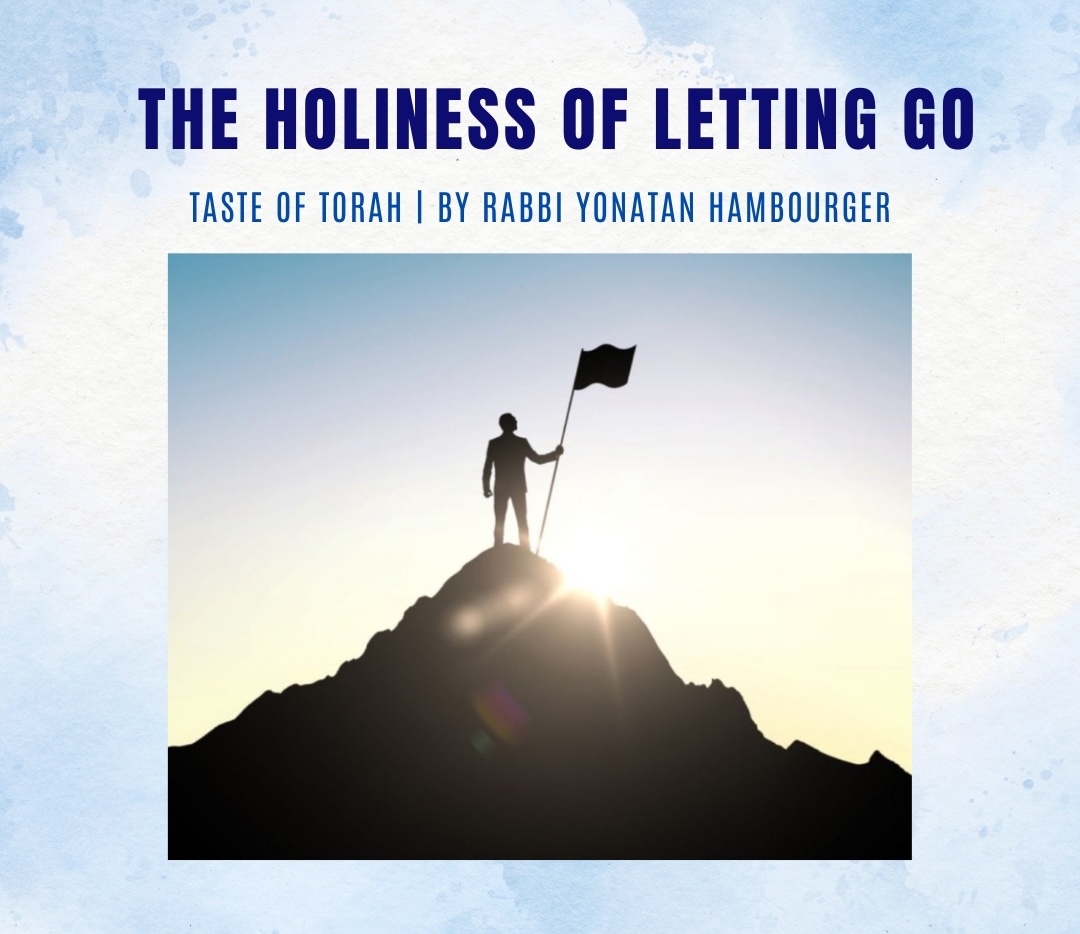
The Holiness of Letting Go
What makes a life truly meaningful? In Parshat Vayelech, Moses stands before the people on the last day of his life and says, “Today I am one hundred and twenty years old. I can no longer go or come, and the Lord said to me, ‘You shall not cross this Jordan’” (Deuteronomy 31:2). At first glance, his words sound like a simple admission of age and frailty. Yet the Torah later tells us, “His eye had not dimmed, nor had he lost his [natural] moisture” (Deuteronomy 34:7)—Moses was still vibrant and strong. So what did he mean by saying he could no longer “go and come”?
Chabad Chassidus offers a profound insight: life is not a flat path, but a journey filled with ups and downs. The Alter Rebbe, founder of Chabad, explains in Tanya and elsewhere that “a descent for the sake of an ascent is not merely to return to where one started, but to rise to a place even higher than before the descent.” The setbacks and struggles we encounter are not simply random obstacles or cycles that leave us unchanged; they are opportunities to propel us to new spiritual heights.
Moses, the ultimate spiritual climber, recognized that as long as there was potential for growth—another ascent after a descent—his mission continued. But on his final day, he sensed that the cycle of rising and falling had come to its natural close. There were no more plateaus to break, no new heights to reach. “I can no longer go and come,” he declared, signaling not weakness, but the holiness of letting go. Moses models for us the sacredness of recognizing when a journey has truly reached its end and accepting it with clarity and peace.
For the rest of us, the lesson is clear: as long as we are alive, G-d is inviting us to keep climbing. Feeling “stuck” or on a plateau is not a sign our story is over, but a call to move forward. Sometimes, a challenge or setback pushes us out of complacency. Though uncomfortable, it is never pointless. The descent is only meaningful if it leads us to an ascent greater than anything we’ve known before.
The Torah’s wisdom is both challenging and comforting: true vitality comes from movement, risk, and resilience. Remaining safe but stagnant is, in a sense, a kind of spiritual death. Only those willing to step off the plateau can discover how much higher they’re meant to climb.
So, if you sense you’ve stopped growing, take it as a gentle push. Life’s journey is not finished yet. Embrace the bumps, drops, and unexpected turns—they may be your invitation to rise higher than you ever imagined.
May this week bring you the courage to leave your comfort zone, the faith to see setbacks as stepping stones, and the strength to keep moving upward—always ascending toward greater light and connection.
I wish you a good week and Shabbat Shalom!
Rabbi Yonatan Hambourger
September 18, 2025
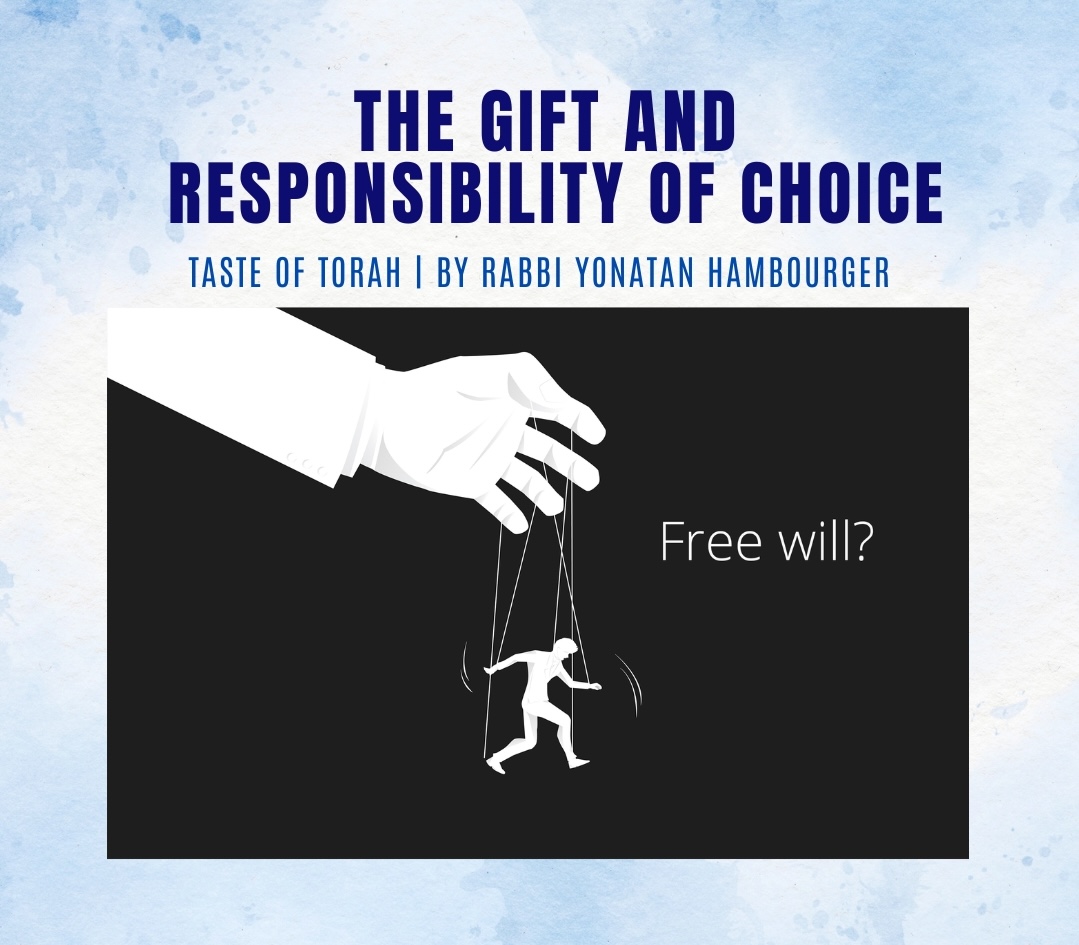
The Gift and Responsibility of Choice
Why does the Torah urge us so passionately to “choose life”? In Parshat Netzavim, as Moses stands before the people, he delivers one of Scripture’s most stirring calls to agency and hope: “Behold, I have set before you life and death, the blessing and the curse. You should choose life, in order that you and your offspring will live” (Deuteronomy 30:19).
At first glance, this seems obvious—who wouldn’t choose life and blessing over death and curse? But the Torah’s message is deeper and more nuanced. G-d is telling us that, in the real world, the path of goodness and the path of evil are not always clearly marked. Sometimes, doing the right thing can be hard, and the rewards aren’t always immediate or obvious. So, G-d reminds us: trust Me, even when things are unclear. I know where your choices lead, and My only desire is for your ultimate good.
Judaism places immense faith in human free will—the capacity to choose between right over wrong, not just because of instinct or circumstance, but from a place of true autonomy. The entire story of the Bible, from Adam and Eve onward, is the story of G-d offering humanity the dignity and risk of freedom. Without free will, the Torah’s instructions, rewards, and warnings would make no sense. As Rabbi Chanina taught, “All is in the hands of heaven, except for the awe of heaven” (Talmud Berachot 33b). Our reverence, our moral choices, are uniquely ours. “This autonomy is a gift, but also a responsibility—because our freedom unfolds within a larger divine framework.”
This freedom is not absolute. We can’t change the laws of nature or rewrite G-d’s ultimate plans. But within the world as it is, we are empowered to choose our role—to bring blessing through our actions and words, to turn back towards our father in heaven when we’ve strayed, and to shape the meaning and depth of our own story.
Remarkably, Jewish thought teaches that G-d created both good and evil, not as equals, but so that our choices would be real and meaningful. Evil exists only because G-d willed it as a backdrop for our freedom; it is through choosing goodness—kindness, justice, honesty—that we connect to the Divine spark within us. When we choose life, we align our will with G-d’s, and in that sacred meeting, we come alive with purpose and hope.
This isn’t always easy. The Torah acknowledges how hard it can be to choose well, especially when the other path seems tempting or effortless. Yet it assures us: you are never stuck. No failure is final. G-d’s faith in you is unshakable, and your power to begin again is real.
May this week grant us the clarity to discern the good, the courage to choose it, and the faith to know that every choice for life brings us closer to G-d, to each other, and to our truest selves.
I wish you a good week and Shabbat Shalom!
Rabbi Yonatan Hambourger
September 11, 2025
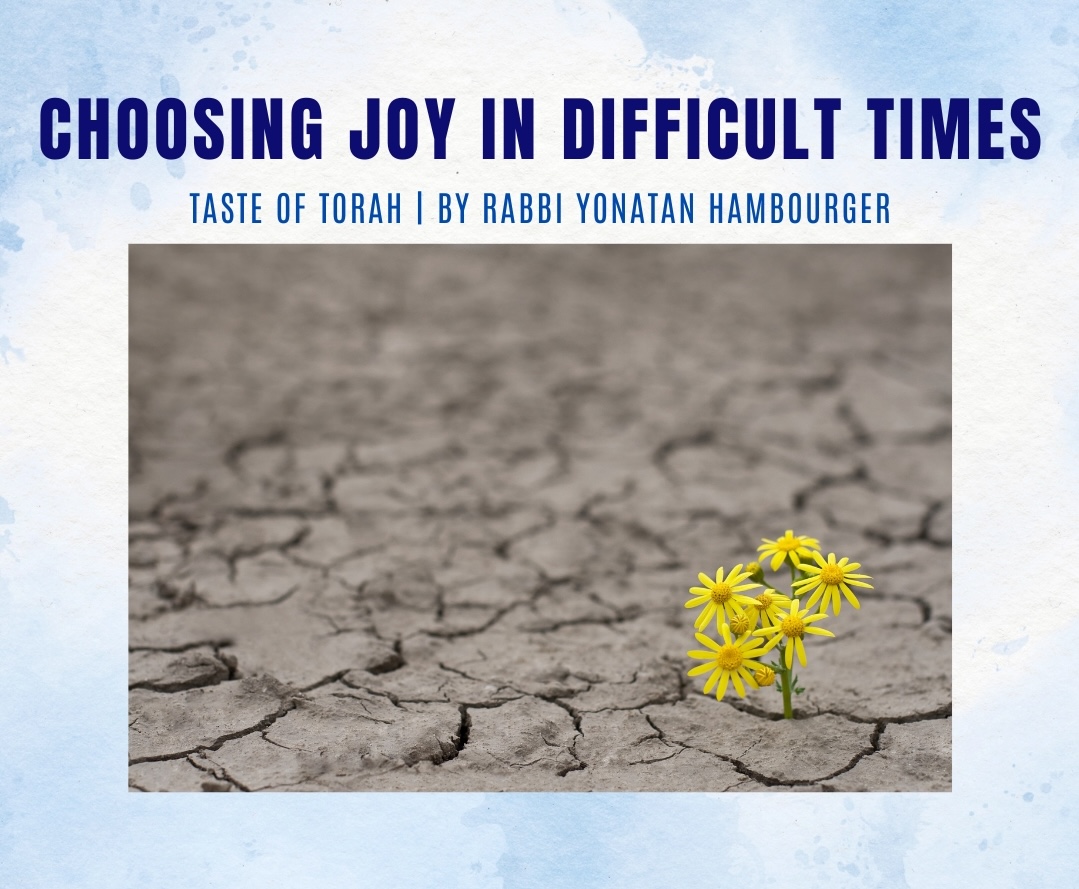
Choosing Joy in Difficult Times
Why does the Torah ask us to serve G-d with joy—especially when joy sometimes feels so out of reach? This question sits at the heart of this week’s reading (Deuteronomy 26:1-29:8), that holds some of the Bible’s most daunting verses. As Moses warns the Israelites of the consequences of turning away from G-d, we read what’s known as the tochachah, “The Rebuke”—forty-five verses of heart-wrenching threats and curses, so intense that they’re still read in a hushed voice in synagogues today.
Yet, within these verses, the Torah quietly reveals the root cause for such hardship:“All these curses will befall you…because you did not serve the Lord, your G-d, with happiness and with gladness of heart, when [you had an] abundance of everything.” (Deuteronomy 28:45–47)
It’s a striking idea. The Torah points not to a lack of ritual or belief, but to a lack of joy. Why would failing to serve G-d with happiness be so significant? After all, joy is an emotion—unpredictable, sometimes elusive. Can we really be expected to summon happiness on command, especially when life is challenging or faith feels distant?
This challenge isn’t new—our sages and mystics have long grappled with the same question. They recognized that for some, joy in spiritual life comes naturally, almost effortlessly. For those attuned to their soul’s yearning, serving G-d with gladness is the most natural thing in the world, as instinctive as cheering for a beloved team or savoring a favorite song.
But what about the rest of us—the times when joy doesn’t come easily, when the heart feels blocked or burdened? Here, Kabbalah offers a radical and hopeful teaching: joy is not only a gift, it’s also a choice. While we might not be able to flip a “happiness switch,” we do have the power to guide our minds and hearts toward joy. By reflecting on the meaning behind our actions—remembering that each act of kindness, each moment of goodness, is a chance to connect with the Divine—we can gently steer ourselves toward gratitude and uplift, even when it feels unnatural at first.
This isn’t about ignoring pain or pretending all is well. Life is complicated, and suffering is real. Rather, the Torah is empowering us to discover the freedom that comes with agency—the ability to shape our inner world, even when the outer world feels overwhelming. We can choose what to focus on, meditate on what is good, and open ourselves to moments of gladness.
So when joy feels distant, consider it an invitation: pause, find something—however small—that brings light, and remind yourself that you have the capacity to let joy in. In doing so, we fulfill the Torah’s call not just to serve, but to serve with a full and grateful heart.
May you find moments of genuine happiness this week, and may those sparks of joy bring blessing to all you do.
I wish you a good week and Shabbat Shalom!
Rabbi Yonatan Hambourger
September 4, 2025
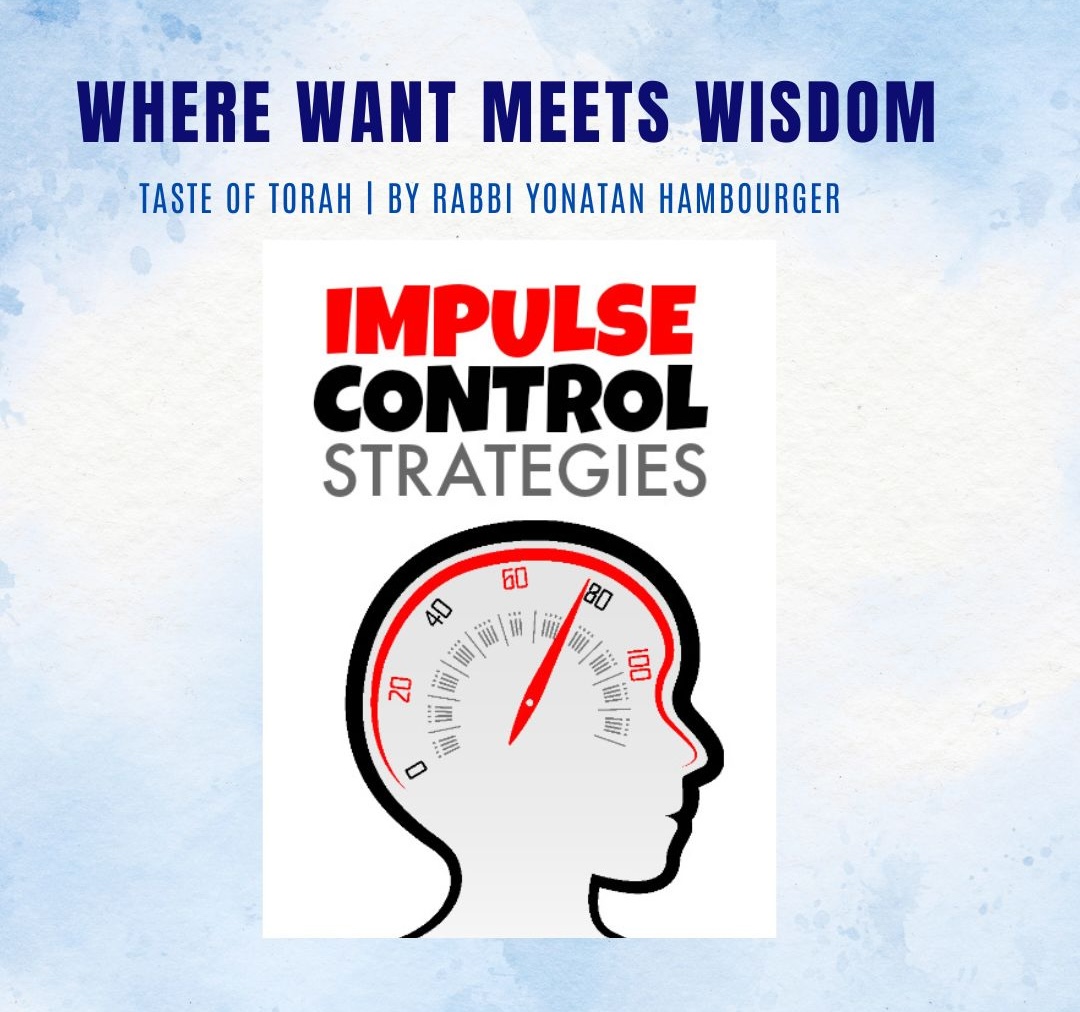
Where Want Meets Wisdom
This week’s Torah reading opens with a striking scene: “When you go out to war against your enemies…” (Deuteronomy 21:10). As the Israelites are preparing to enter the Promised Land, they know that many nations are ready to wage war against them. The Torah doesn’t shy away from the realities of conflict, including what might happen if a soldier encounters a beautiful woman among the captives.
At that time, it was common for Israel’s enemies to send out their women dressed in their finest, hoping to seduce and distract the soldiers and weaken their resolve. The Torah’s response is surprisingly humane. The soldier isn’t allowed to harm her, enslave her, or treat her as a mere prize of war. If he desires her, he must bring her home and wait through a cooling-off period. During this time, she removes her fine clothes and adornments, and she must also agree to become part of the Jewish people of her own free will. The soldier can’t touch her, and if, after this period, he still wants to marry her, he must do so respectfully. If not, he must set her free and make sure she’s compensated for what she’s endured.
By the standards of the ancient world, these rules are remarkably compassionate. And sadly, we know this kind of savagery isn’t only something of the distant past; even today, we see horrors we once thought were relegated to ancient history. The Torah’s insistence on boundaries and respect stands in stark contrast to the brutality that too often surfaces in times of war.
But there’s a deeper message here. The passage isn’t just about a literal battlefield—it’s also about the battles inside each of us. “When you go out to war with your enemies…” can just as easily mean struggling with our own impulses—the urges that nudge us to act impulsively, sometimes at the expense of others.
The Torah’s guidelines serve as a reminder to pause before acting on impulse, in any area of life. Whether it’s desire, anger, jealousy, or the urge to get our way, we’re called to slow down and look beyond the surface. Are we seeing the full humanity in those around us? Are we acting with integrity, even when our emotions are running high?
That’s real strength: not simply doing what we want in the heat of the moment but making choices that protect dignity—our own and others’. It’s a call to respect boundaries, to recognize that just because something is within our grasp doesn’t mean it’s right for us. When we act with restraint and compassion, we help create a world where everyone’s dignity is protected—a goal truly worth striving for.
I wish you a good week, and Shabbat Shalom!
Rabbi Yonatan Hambourger
August 28, 2025
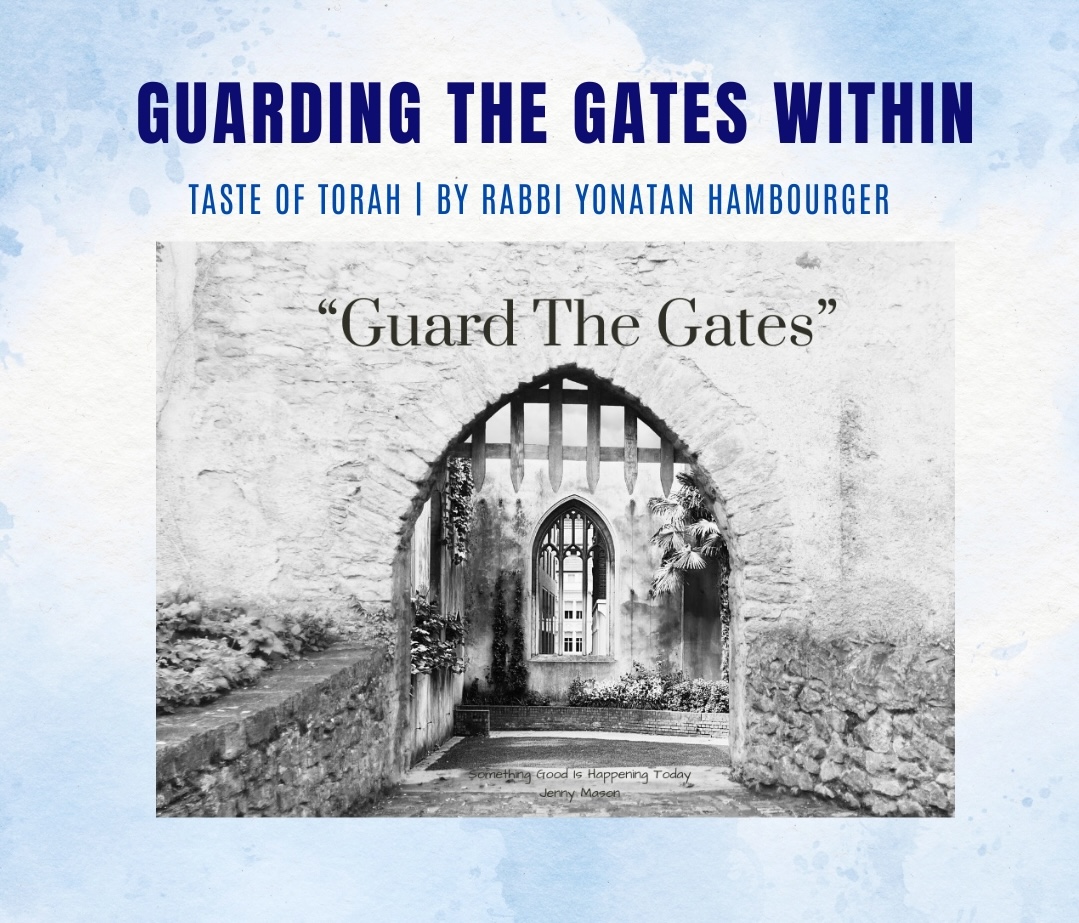
Guarding the Gates Within
Have you ever wondered why some days feel overwhelming, or why a single harsh word or troubling headline can linger long after the moment has passed? The Torah recognizes just how powerfully our environment shapes us. In this week’s portion, Shoftim, Moses directs the people: “You must appoint judges and officers for yourself in all your cities…” (Deuteronomy 16:18). On one level, this is about building a just society. But there’s a deeper layer: the Hebrew word for “cities” (she’arecha) also means “gates,” and Jewish tradition teaches that this refers to the gates of our own body and soul—our senses.
Our “gates” are the senses through which the world enters our minds and hearts—what we see, hear, speak, and even taste. The Chassidic masters invite us to imagine each sense as a gateway that shapes our inner world. Every day, we are bombarded by images, sounds, and influences. Without realizing it, these impressions can cloud our mood, plant seeds of anxiety, or nudge us away from our true selves.
The Torah’s wisdom feels remarkably modern in an age of constant connectivity. When we leave our gates unguarded—scrolling endlessly, listening to negativity, absorbing unfiltered media—we’re left vulnerable to confusion, distraction, and even despair. Just as a city needs wise judges and diligent officers to protect its peace, so too do we need discernment and discipline to protect our spiritual wellbeing. The “judge” within us asks: “Is this nourishing for my soul? Will this help me become who I want to be?” The “officer” is the inner strength to act on those decisions, setting healthy boundaries and habits that support our highest values.
Jewish tradition holds that this inner vigilance is not just about self-protection, but about preparing ourselves for a world of greater wholeness. The prophet Isaiah envisions a future where “your judges will be restored as at first”—but notably omits mention of officers. Chassidic thought explains that in a perfected world, where negativity no longer holds sway, we won’t need to fight so hard to protect our gates; goodness will flow naturally, and our inner world will be at peace.
Until then, our task is to nurture our inner judges and officers—to consciously choose what we allow to shape us, and to gently close the gates against what leads us astray. By doing so, we create space for clarity, peace, and divine connection to flourish in our lives.
May this week grant you the wisdom to judge kindly, the courage to guard your gates firmly, and the grace to let in what uplifts your soul. And as each small, mindful choice accumulates, may you find your days growing brighter, your heart more open, and your spirit at peace.
I wish you a good week and Shabbat Shalom!
Rabbi Yonatan Hambourger
August 21, 2025
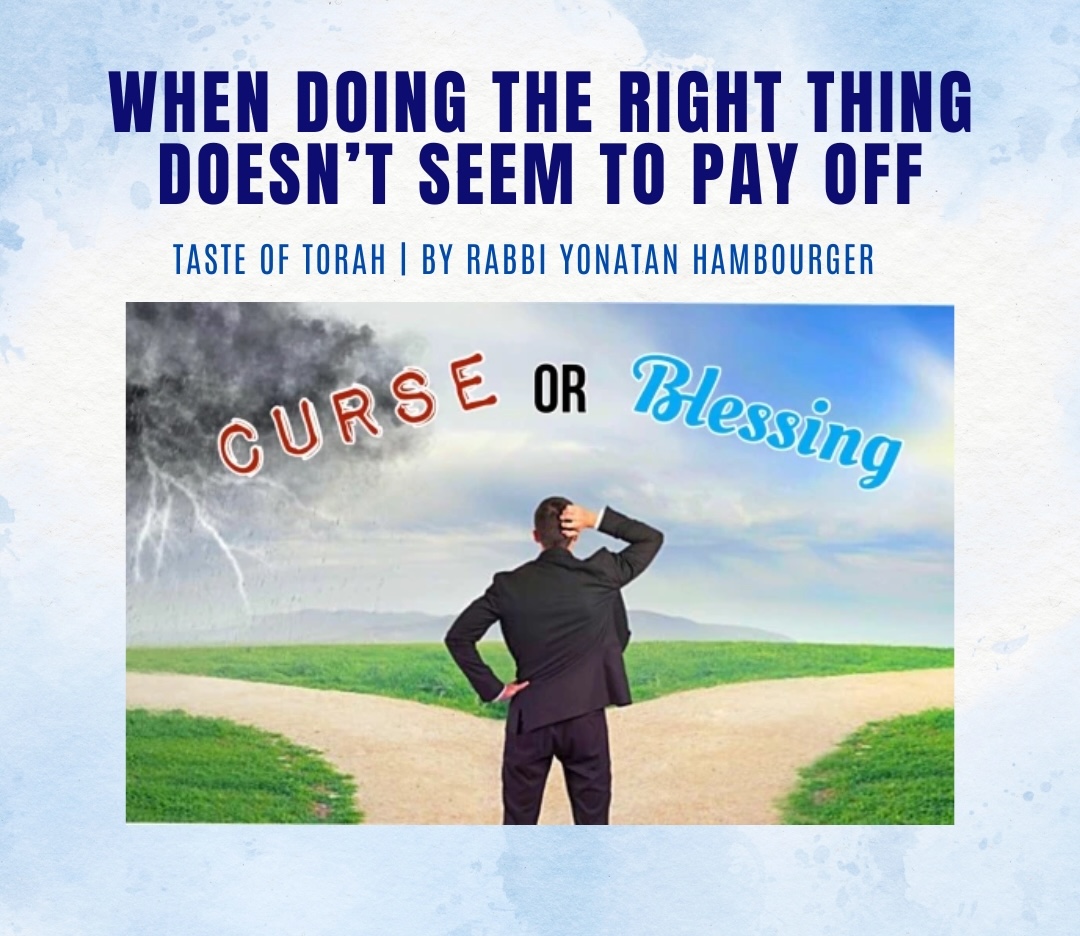
When Doing the Right Thing Doesn’t Seem to Pay Off
Have you ever found yourself wondering why doing the right thing sometimes seems to make life harder, not easier? You try to act with honesty and kindness, but blessings feel distant—or even withheld. This tension sits at the heart of this week’s Torah portion, where Moses tells the Israelites: “See, I place before you today a blessing and a curse…” (Deuteronomy 11:26). It sounds so simple—choose well, and good things follow. But we all know life doesn’t always work out that way.
As Moses concludes his second great address, he urges the people to recognize the power of their choices. Jewish tradition teaches that G-d’s deepest wish is to pour out blessing. The Chassidic masters give us a powerful image: think of sunlight streaming through a window. When our actions—how we treat others, how we live—are honest and good, the glass is clear, and the room fills with light. But when our behavior clouds the glass—through selfishness, cruelty, or neglect—even the brightest blessings can be blocked from reaching us.
But the tradition goes even deeper. Chapter 50 of the Tanya, a foundational Chassidic work, introduces a profound idea: sometimes, what we experience as a “curse” is actually a blessing too powerful to appear in plain sight. In this view, there isn’t true “bad”—only two kinds of good. There’s revealed good, the joys we recognize and celebrate, and there’s concealed good, blessings so lofty they must be delivered in disguise. The Tanya discusses how suffering can sometimes be the result of divine kindness hidden from us, operating on a level we can’t yet understand.
What does this mean for us, practically? It doesn’t mean our choices are meaningless. What we do still matters. Every act of goodness helps clear the glass, allowing more blessing to shine through into our lives and the lives of others. But when hardship or disappointment comes, it’s not always a sign that we’ve failed, or that G-d is absent. Sometimes, the hardest seasons carry blessings in forms we can’t yet recognize—preparing us for growth, depth, or compassion we wouldn’t otherwise reach.
As we listen to Moses’ call to “see,” let’s try to look at our lives with both honesty and trust. May we work to clear our windows with acts of goodness, and also hold faith that even what’s hidden or difficult may carry a deeper good. And may we support each other gently as we seek out the light—both revealed and concealed—that G-d places before us.
Wishing you a week of clarity, courage, and blessings—both seen and unseen.
I wish you a good week and Shabbat Shalom!
Rabbi Yonatan Hambourger
August 14, 2025
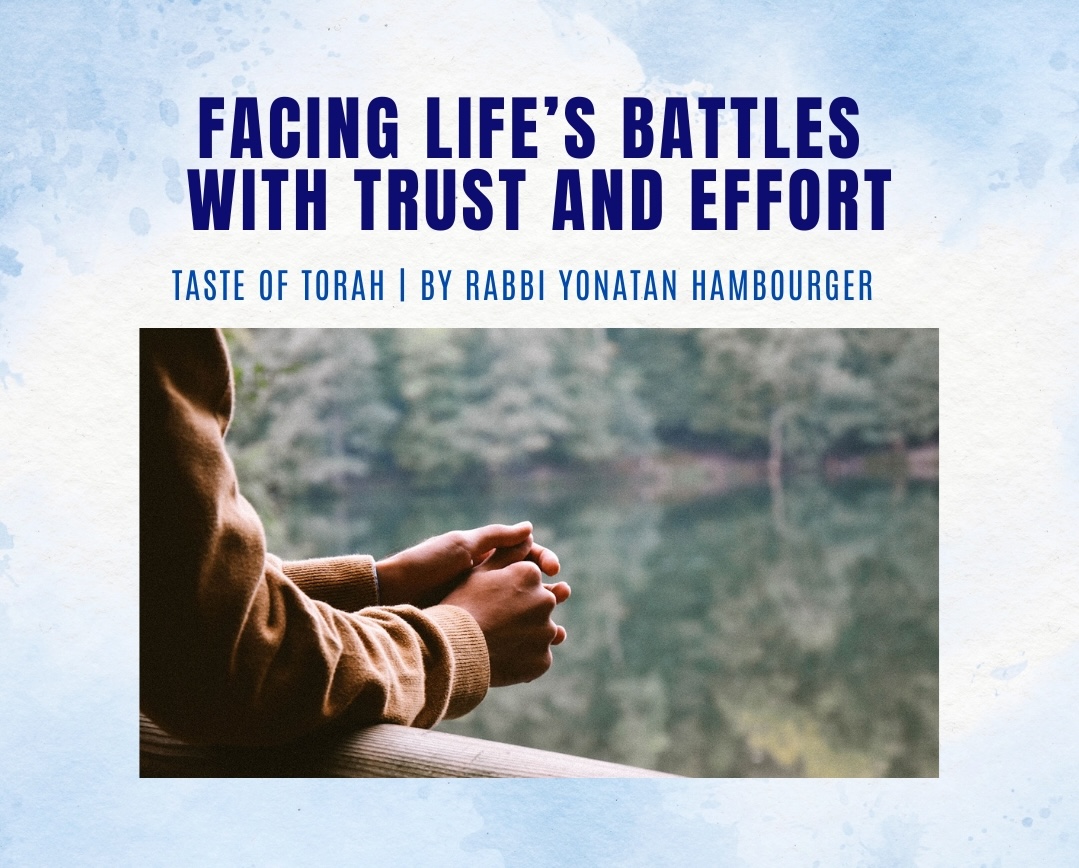
Facing Life’s Battles with Trust and Effort
Have you ever stood at the edge of something big--excited, but scared? That’s exactly where the Israelites find themselves in this week’s Torah portion, Parshat Eikev. After forty years of wandering in the desert, the Israelites stand on the threshold of the Promised Land. For decades, their every need was met through miraculous means, and under Moses’ leadership, they triumphed over their enemies without fail. But now, as they prepare to cross into a new chapter, a sense of fear and uncertainty settles in. The dazzling miracles seem to fade, and the battlefield feels starkly real.
Moses does not sugarcoat the challenge ahead. He acknowledges that the nations they face are formidable, far more numerous and powerful. Yet, his message is clear and resolute: “You shall not fear them… for the L‑rd your G‑d is in your midst and is great and awesome” (Deuteronomy 7:17-21). Moses doesn’t promise a Hollywood-style spectacle of miracles. Instead, he reassures the people that while they must step onto the battlefield and do their part, G‑d is present, orchestrating the outcome in their favor.
This dynamic between human effort and divine support is at the heart of our own struggles. Life often feels like a battlefield where we face overwhelming challenges—whether external pressures or internal impulses that seem impossible to conquer. It’s tempting to feel powerless, to doubt our ability to overcome on our own.
But Moses reminds us of a vital truth: we are never truly alone in these fights. “The L‑rd, your G‑d, will drive out those nations from before you, little by little” (Deuteronomy 7:22). Success may not come overnight, and the process can be slow and arduous. Yet, with steady effort and unwavering determination, we can triumph over our personal “enemies.”
This idea resonates deeply with the teachings of the Alter Rebbe, Rabbi Shneur Zalman of Liadi, founder of Chabad Chassidus. In his Tanya (Iggeret HaKodesh 27), he explains that spiritual growth is a gradual process, with each small victory building upon the last. Even when progress seems slow or difficult, every effort is part of a divine plan moving us forward. This perspective encourages us to persist patiently, knowing that G‑d’s help accompanies our steady steps.
The promise is profound—G‑d desires our active participation, our willingness to struggle and strive. But when we do, He personally guarantees our victory. It’s a partnership of trust and action: we bring our courage and commitment, and G‑d brings the power beyond our reach.
As we stand on the edge of our own battles, may we remember Moses’ words. Let us face challenges not with fear but with faith—in ourselves, in the effort we can make, and in the divine presence guiding us toward victory, little by little.
I wish you a good week and Shabbat Shalom!
Rabbi Yonatan Hambourger
August 7, 2025
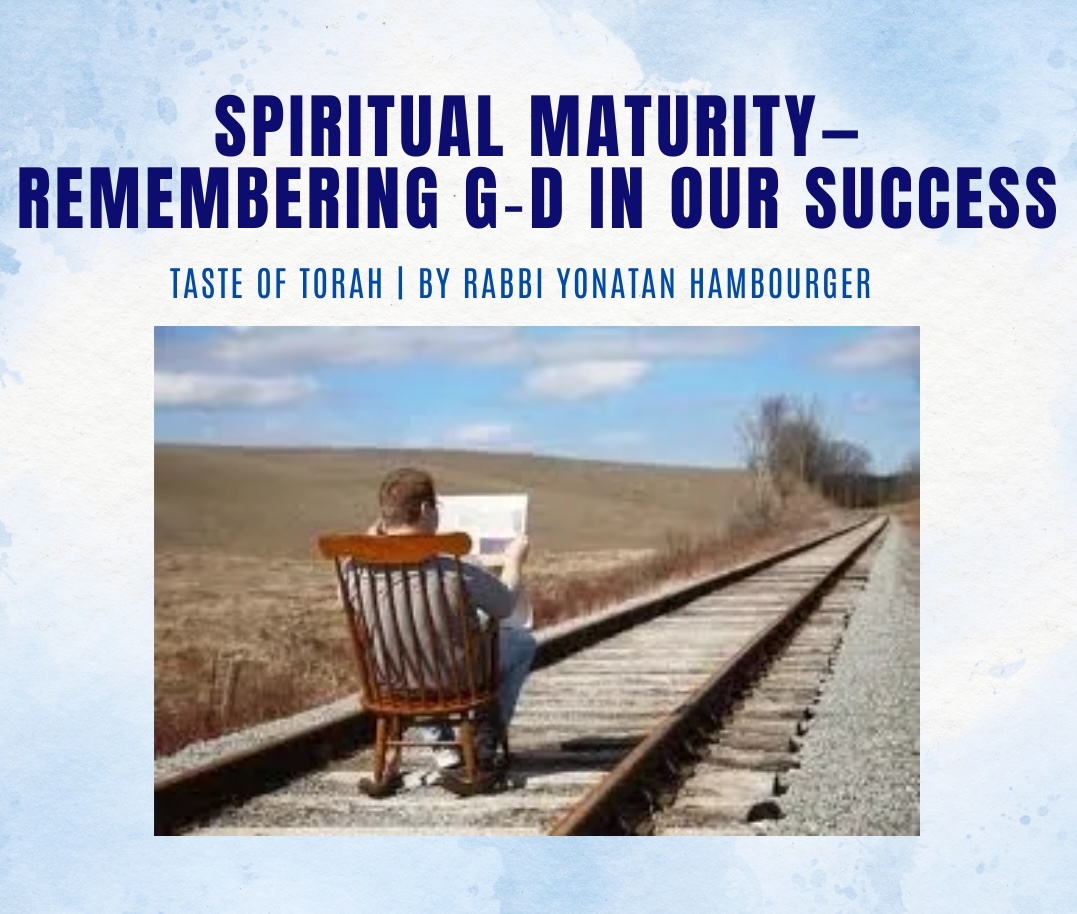
Spiritual Maturity—Remembering G‑d in Our Success
We all know the feeling of accomplishment—that satisfying moment when everything falls into place and life seems to flow effortlessly. But how often do we pause to truly remember the Source behind our success, the unseen hand guiding our steps?
As Moses continues his ethical will to the Children of Israel, which comprises the book of Deuteronomy, he carries the heavy burden of knowing that he will not enter the Promised Land with them. These final words are more than instructions—they are a heartfelt plea for spiritual maturity, a deep call to remember G‑d not only in times of hardship but especially when the road seems smooth and the blessings abundant.
Moses warns the Israelites in Deuteronomy 6:10, “When the L‑rd your G‑d brings you into the land… and you eat and are satisfied, beware that you do not forget the L‑rd who brought you out of Egypt.” It’s a timeless caution against the subtle trap of complacency, when comfort can lull us into forgetting the very Source of our blessing.
Yet Moses is painfully aware of our human nature. As he says in Deuteronomy 4:30, “When you are distressed… then you will return to the L‑rd your G‑d and obey Him.” It’s often in moments of struggle that our hearts open wide, and we reach out with raw sincerity to G‑d. But spiritual growth challenges us to rise above this cycle—to carry that connection into moments of joy and plenty.
Rabbi Schneur Zalman of Liadi, founder of the Chassidic movement, taught that the foundation of serving G‑d is “hakarat hatov”—a deep, heartfelt recognition and appreciation of the good we receive. This awareness softens pride, anchors humility, and guards against the spiritual forgetfulness Moses so feared.
King Solomon, renowned for his wisdom, reminds us that no amount of skill or understanding guarantees success. This teaches us humility—that despite our efforts, we remain dependent on forces beyond ourselves. Like a friend who only reaches out in moments of crisis but stays silent in times of joy, such one-sidedness leaves a relationship unbalanced. Our connection with G‑d calls for balance too—a steady turning to Him not only in hardship but in gratitude for our blessings.
Moses’ ethical will invites us to cultivate this spiritual maturity: to recognize G‑d as the source of every blessing and to nurture a consistent, grateful relationship with Him through every season of life.
May we be granted the wisdom and humility to remember G‑d in our successes as well as our struggles, transforming our lives into a continuous prayer of thanks and a beacon of blessing for ourselves and those around us.
I wish you a good week and Shabbat Shalom!
Rabbi Yonatan Hambourger
July 31, 2025
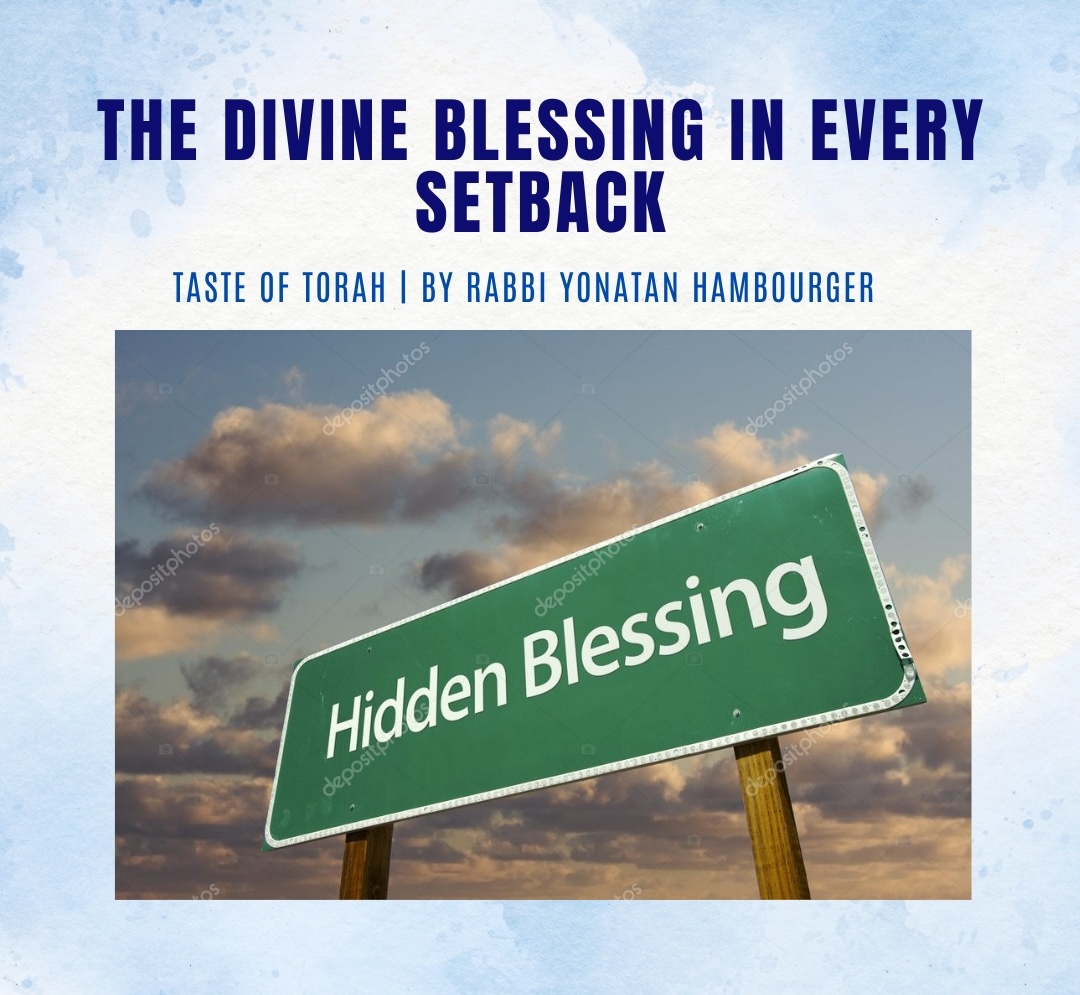
The Divine Blessing In Every Setback
A fundamental teaching in Chassidic thought is the idea of yeridah letzorech aliyah—every descent is meant to lead to an even greater ascent. Like stepping back before a long jump, what feels like a setback is actually the preparation for a bigger leap forward. Since G‑d wants only good for us, apparent setbacks are really divine gifts in disguise, pushing us toward higher achievements.
This week’s Torah portion, Devarim, opens the fifth and final book of Moses’ Torah. Unlike the first four books—spoken directly by G‑d—Deuteronomy is delivered in Moses’ voice, recounting the journey of the Israelites. This marks a shift—not only in who speaks but in purpose. In Chapter 1:8, Moses calls the people to action as they prepare to enter the land promised to their ancestors: “See, I have set the land before you. Come and take possession of the land that G‑d swore to your forefathers.”
This marked a profound transition for the Israelites. In the desert, they experienced spiritual heights rarely matched: direct face-time with Moses and the elders, and miraculous provision of all their physical needs—manna from heaven, and water from the well of Miriam. Their lives were immersed in both divine revelation and material comfort.
Now, they faced the challenge of entering the Holy Land, where they would have to work physically—growing food, preparing meals, earning a living—and confront the daunting war G‑d commanded them to fight. To many, this shift felt like a descent from the sanctuary of the desert’s spiritual and physical miracles.
Another seeming descent is found in the very voice of the Torah. The first four books were spoken directly by G‑d, while Deuteronomy is spoken by Moses himself. This change might seem like a step down, but it holds deep meaning. It teaches that our connection to G‑d must become internalized and personal. The divine message is not just to be heard from afar but to be embraced and lived through our own understanding and actions. Moses’ voice invites us to make the eternal teachings our own, relevant and accessible in everyday life.
So, when life feels like a descent—whether in circumstances or spirituality—remember it’s a divine setup for growth. G‑d invites us to use the material world to elevate the mundane into something sacred.
Just as the Israelites had to descend into real-world struggle to ascend spiritually, we too must enter the imperfect world with the tools of holiness. In today’s fractured world, this teaching calls us to bridge divides with kindness and genuine connection. Let’s start small—one sincere smile, one act of compassion at a time—to build a world where G‑d’s presence truly dwells among us.
Wishing you a good week, and Shabbat Shalom!
Rabbi Yonatan Hambourger
July 24, 2025
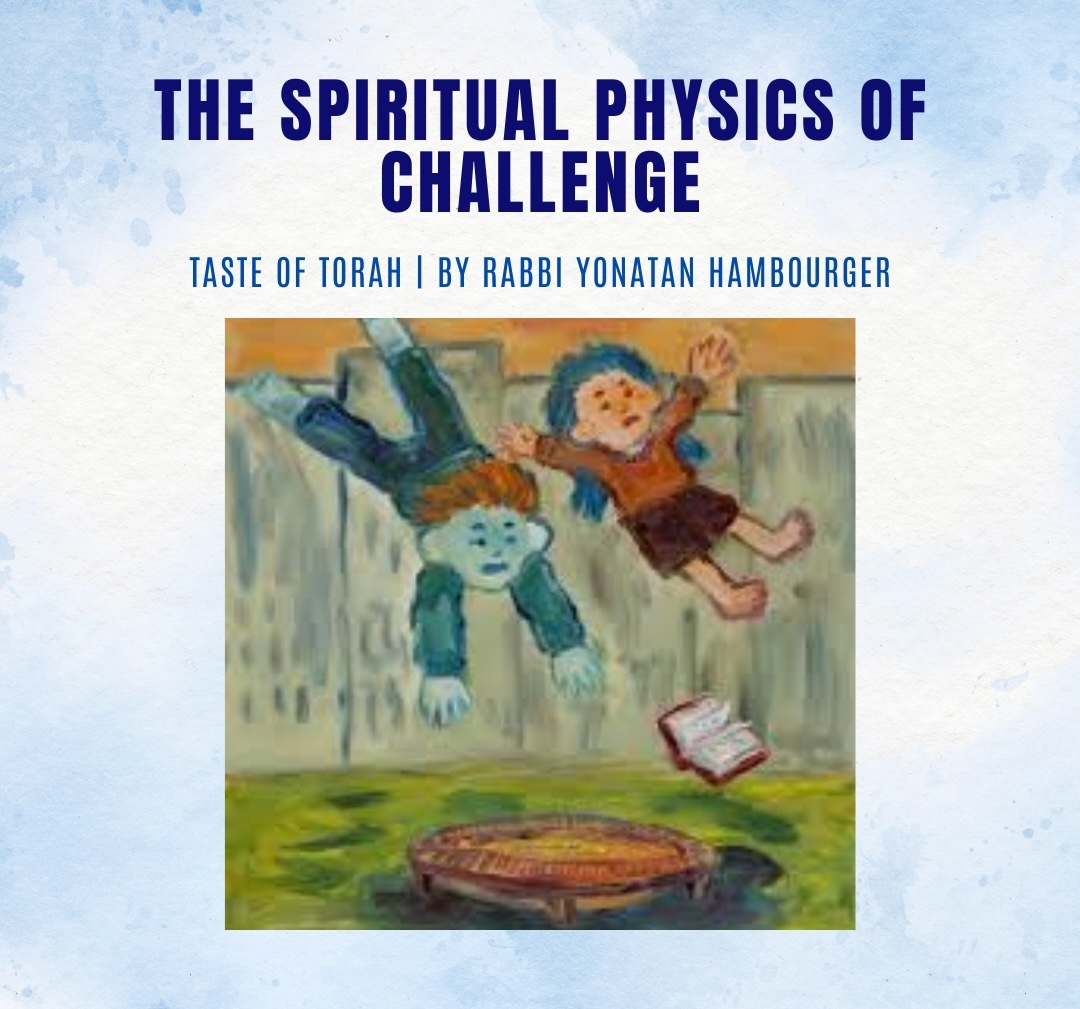
The Spiritual Physics of Challenge
When you first open this week’s Torah portion, you’re greeted with a surprising list: “These are the journeys of the children of Israel who left Egypt in their legions, under the charge of Moses and Aaron. Moses recorded their starting points for their journeys according to the word of G-d…” (Numbers 33:1-2). Forty-two stops, each named and remembered. Some sites were scenes of triumph, but many marked hardship and failure. Why, just before entering the Promised Land, does the Torah insist on recalling every difficult step along the way?
Chassidic thought teaches that every descent is for the sake of a greater ascent. The Israelites’ journey wasn’t just a string of setbacks—it was a process of transformation. Each low point, however unwelcome, laid the groundwork for growth. This isn’t just ancient history; it’s a pattern that speaks to personal experience as well.
Consider a trampoline: the only way to soar is to be pressed down first. In the moment, that downward force feels discouraging, maybe pointless. Yet it’s precisely that pressure which creates the momentum for the next leap. The Torah’s detailed list serves as a reminder that adversity is not just something to endure—it can become the very engine of progress.
Looking back at difficult moments isn’t about reopening wounds. It’s about seeing how those experiences shaped your journey, uncovering strengths you gained, and recognizing how challenges prepared you for what came next. Sometimes, reflection even brings a sense of gratitude for the wisdom and resilience born of struggle. Without this pause, it’s easy to miss the meaning in your story—or to repeat old patterns. Even the stops that seem unremarkable in hindsight may have quietly moved you forward in ways you only recognize much later.
Of course, honest reflection takes courage. It’s easy to gloss over the hard parts or focus only on how far you have left to go. But the Torah’s recounting of every stop is an invitation to look back with open eyes and appreciate the full tapestry of your journey—the setbacks and the steady marches alike.
By recounting every stop, the Torah is inviting you to revisit your own path with new eyes. The real challenge is not only to remember the past, but to reinterpret it: to recognize how your setbacks were quietly preparing you for greater heights. So if life ever feels like it’s pressing you down, consider that you might be on the verge of a tremendous growth spurt. So if life ever feels like it’s pressing you down, remember the lesson of the trampoline: it’s often the very lowest point that gives you the power to rise higher than you ever imagined.
I wish you a good week, and Shabbat Shalom!
Rabbi Yonatan Hambourger
July 17, 2025
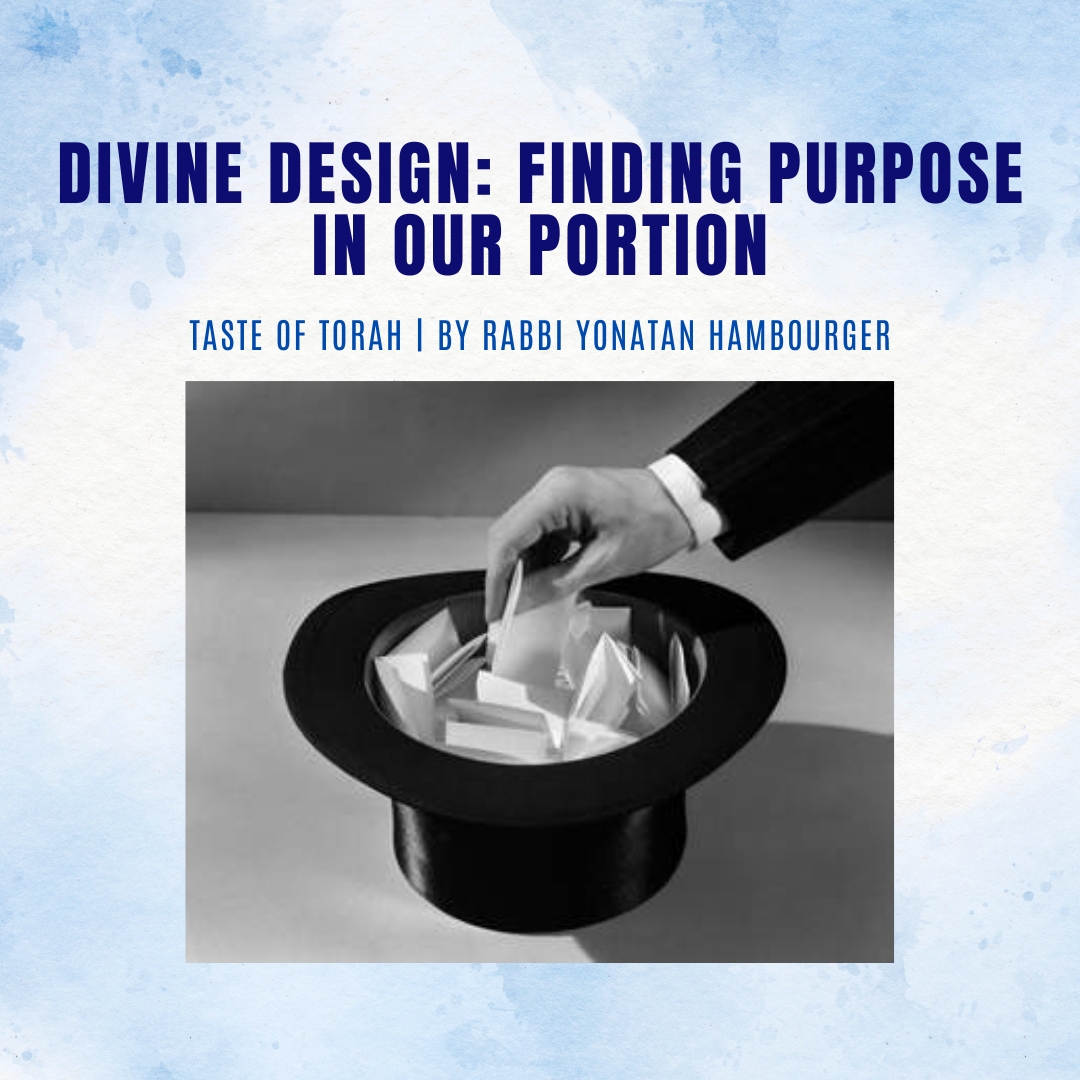
Divine Design: Finding Purpose in Our Portion
As the Israelites stood poised at the border, making final preparations to enter the Promised Land, they faced a practical—and spiritual—question: How would this sacred land be divided among the twelve tribes? Numbers 26:53 captures this pivotal moment with a deceptively simple phrase: “The land will be divided among these as an inheritance according to the number of names.”
Picture the scene: twelve tribes, each with hopes and dreams for their future, awaiting their inheritance. Instead of debates or negotiations, the Torah describes a process that, at first glance, seems almost random—a lottery. Names went into one box, parcels of land into another, and pairs were drawn. What sets this apart is what happened next: with each draw, a heavenly voice confirmed the results of the lots, declaring which tribe would receive which portion. Any doubts about fairness vanished. What looked like a game of chance became a clear expression of G-d’s will.
This episode presents a fascinating paradox. On the surface, a lottery suggests randomness. Yet, the Torah turns that expectation on its head, showing that what appears accidental can actually be the vehicle for Divine guidance. The tribes trusted that their portion wasn’t just assigned—it was chosen with purpose.
That message speaks to us today. We all encounter moments when life seems arbitrary: Why am I in this family, this community, these circumstances? Why these particular joys and struggles? It’s easy to feel as if we’ve drawn our portion from a hat, with little rhyme or reason.
But the Torah invites us to see things differently. Our circumstances—both sweet and difficult—are not random. In a real sense, they’re custom-made for us. Each relationship, challenge, and opportunity is designed to help us grow and refine our character. Those daily frustrations, unexpected detours, and even the people who test our patience—these are opportunities, handpicked by G-d, for us to become more compassionate and resilient. Our portion is suited to bring out the best in us, if we choose to see it that way.
When we internalize this perspective, it transforms how we live. We stop comparing our journey to others and start embracing our own path with confidence and enthusiasm. Just as the tribes entered the land with trust, we too can step into our portion knowing G-d’s guidance is present in every detail. Our lives are not the result of chance, but part of a Divine design—each of us entrusted with a unique role and purpose only we can fulfill.
I wish you a good week, and Shabbat Shalom,
Rabbi Yonatan Hambourger
July 10, 2025
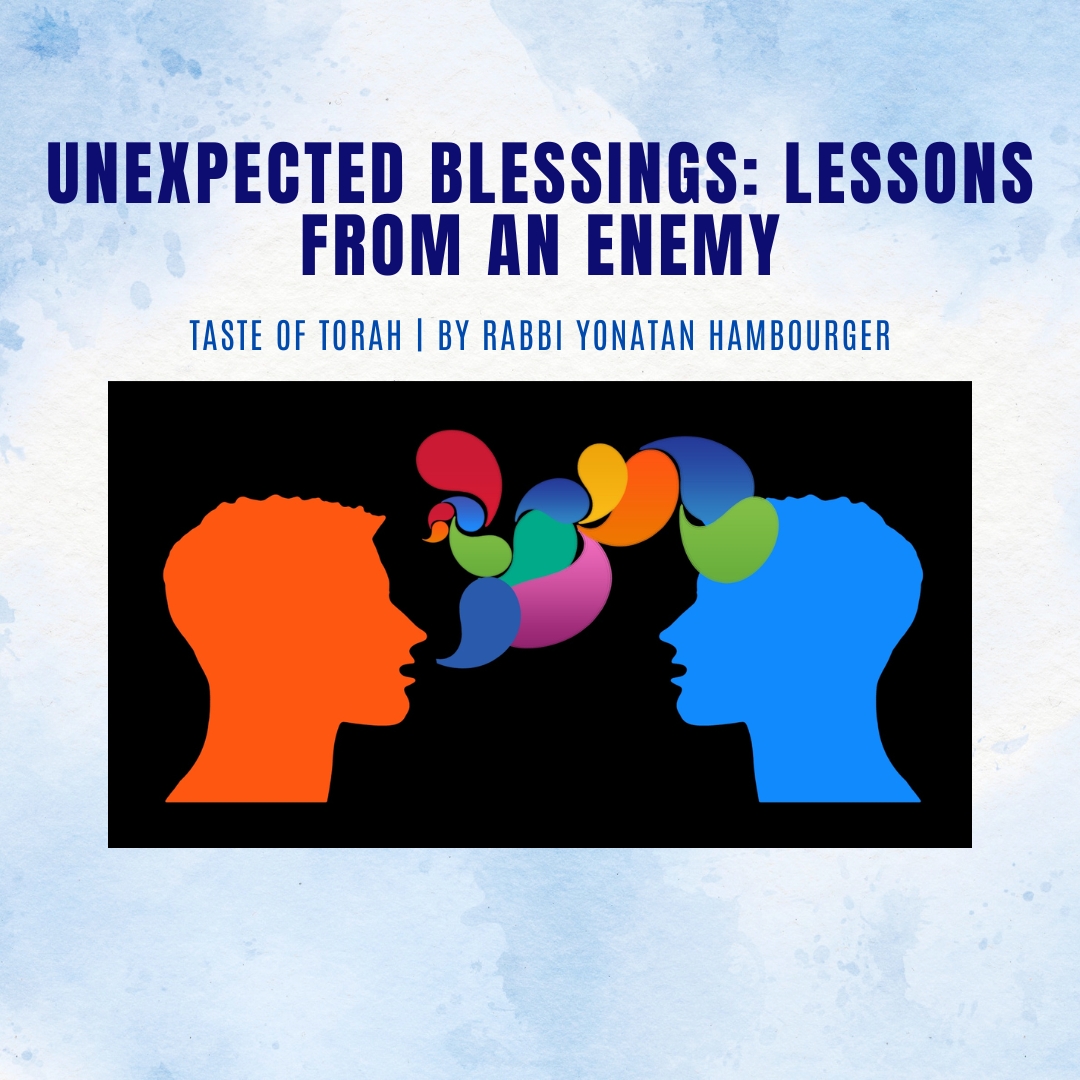
Unexpected Blessings: Lessons From an Enemy
Every week, the Torah offers something new to reflect on—sometimes a story, sometimes a law, and sometimes, like in this week’s portion, a blessing that has become woven into Jewish prayer. The words “How goodly are your tents, O Jacob, your dwelling places, O Israel!” (Numbers 24:5) are still recited daily as part of daily prayers. What’s truly remarkable is their source: not Moses, but Balaam—a heathen prophet, infamous for his deep-seated hatred of the Jewish people, who arrived with the intent to curse them.
You may recall that Balaam was summoned by King Balak of Moab, who wanted a curse placed upon the Israelites. Instead, Balaam’s mouth was filled with words of praise. The would-be enemy became the unlikely bearer of blessing.
This leaves us wondering: Why would G-d choose such a figure to deliver these beautiful words? Why not Moses, who cared so deeply for his people? In fact, Moses’s speeches are often filled with admonition and stern warnings. It seems almost backwards.
Jewish tradition explains that if Balaam had criticized Israel, his words would have been dismissed as the rantings of an enemy. And if Moses, the beloved leader, had only blessed, those blessings might not have carried weight with the other nations around them. So G-d, in infinite wisdom, ensured that correction came from love and blessing came from an outsider—each message landing where it was needed most.
This dynamic holds true in our own lives. We know that the most effective words of correction come from those who genuinely care about us. And sometimes, the most powerful affirmations come from the most unexpected places.
Before we speak, the Torah encourages us to check our hearts: “You shall not hate your brother in your heart; you shall surely reprove your fellow…” (Leviticus 19:17). Compassion must be the root of our words. It’s not always easy, but it’s something we can each work on, whether we’re responding to a loved one, a neighbor, or even a stranger.
Let’s take this lesson to heart. This week, try pausing before you speak, especially when offering criticism or advice. Ask yourself: Am I coming from a place of real care? Reach out to someone who might need encouragement and offer a sincere blessing, even if it feels unexpected. In a world quick to judge, let’s become known for our kindness, our honesty, and our willingness to build up those around us. If each of us chooses even one conversation to fill with compassion and integrity, imagine the difference we can make—in our homes, in our communities, and beyond.
I wish you a good week, and Shabbat Shalom
Rabbi Yonatan Hambourger
July 3, 2025

In the Shadow Before Sunrise
This week’s Taste of Torah shares a story that invites us to wrestle with some of life’s hardest questions. The Israelites, tired and discouraged, begin to complain. In response, G-d sends poisonous snakes into the camp, and many are bitten. Then, in a surprising twist, G-d tells Moses to make a copper snake and lift it high on a pole. Anyone who looks at it is healed (Numbers 21:5-9). That image—the snake on a pole—has even become a universal symbol for healing.
Why would G-d choose the very thing causing pain as the instrument of healing? This question goes deeper than the surface of the story. Jewish tradition teaches that nothing in creation is absolutely evil. Even what seems most destructive can, within G-d’s plan, carry the seeds of good. Sometimes, pain teaches us compassion. Sometimes it helps us see blessings we might have missed. Sometimes, it forces us to reach out to others and to G-d in ways we never would have otherwise.
Still, explanations rarely satisfy when we—or those we love—are suffering. Why must hardship exist at all? Why must healing come through hurt? These are questions that have echoed through generations. The Lubavitcher Rebbe, Rabbi Menachem Mendel Schneerson, of righteous memory, once spoke with tears about this mystery. He taught that we are not meant to accept or rationalize suffering. G-d does not want us to explain pain away. Instead, we are meant to protest against it, to pray for its end, and to do all we can to bring comfort and healing into the world. If we could truly understand suffering, perhaps we would lose our urgency to ease it.
The prophet Isaiah gives us a glimpse of future clarity: “You will say on that day, ‘Thank You, G-d, for You have been angry with me’” (Isaiah 12:1). There will come a time when we will look back and see how even the hardest moments were woven into a greater good. And Isaiah promises us, “He will swallow up death forever; and the L-rd G-d will wipe away tears from every face” (Isaiah 25:8).
For now, as long as pain remains, it’s not yet time to thank G-d for suffering. Our task is to speak up, to comfort, to heal, and to demand that G-d fulfill His promise. If things are not yet good, the story isn’t over. May we each find the strength to bring light to those around us, and may we soon see the day when every tear is wiped away, and all is truly good in the end.
I wish you a good week, and Shabbat Shalom!
Rabbi Yonatan Hambourger
June 26, 2025

When Envy Wears a Halo: The Subtlety of Jealous Motives
This week’s Torah portion introduces us to a fascinating, though tragic, figure named Korach. In Numbers 16:3, Korach confronts Moses and Aaron, asking, “Why do you elevate yourselves above G-d’s assembly?” On the surface, he sounds like an egalitarian, but in reality, he’s putting a halo on his envy—cloaking his jealousy in the language of fairness. Korach had prestige, wealth, and a respected family, yet he couldn’t stop focusing on those who had more. This disguised resentment led him to challenge the legitimacy of Moses and Aaron’s leadership.
Korach didn’t keep these feelings private. He stirred unrest, rallying others who felt overlooked and fueling an atmosphere of suspicion and dissatisfaction. The Torah describes how this movement grew, threatening the unity of the people. In dramatic fashion, the earth opened up and swallowed Korach and his followers alive—a powerful warning about where unchecked envy can lead.
But Korach’s struggle is a familiar one. Who hasn’t wrestled with envy or a longing for recognition? The sages share a telling story: A king summoned two men—one envious, the other a pleasure-seeker—and declared, “Whoever asks first will get what he wants, but the other will receive double.” The pleasure-seeker waited, hoping for twice the pleasure. The envious man, unable to bear the thought of someone else receiving more, finally asked, “Let the king poke out one of my eyes.” It’s a vivid lesson in how envy, especially when disguised as principle, can end up hurting us most.
Yet the Torah doesn’t just warn; it guides us to transform these drives. Envy can become inspiration to learn from those we admire. Desire can deepen our longing for closeness to G-d. Even the pursuit of honor can be redirected toward honoring others.
The Lubavitcher Rebbe taught that happiness can’t be built on prestige or status. True joy comes from embracing our unique place in the world—knowing, as the sages say, “There is no man who does not have his place.” Instead of longing for someone else’s blessings, we’re called to recognize our own and use them to make a difference, right where we are.
May we learn from Korach’s story to look inward, transform our struggles, and invest our gifts in service of a higher purpose. In doing so, we fulfill the mission that only we can accomplish, bringing blessing to our world and those around us.
I wish you a good week, and a good Shabbat!
Rabbi Yonatan Hambourger
June 19, 2025

Facing Giants: What to Do When the Road Looks Impossible
As the Israelites camped at the edge of the land they’d been promised for generations, they did something very human. Before marching in, they asked Moses to send scouts ahead to check things out. After speaking with G-d, Moses agreed and gave the scouts precise instructions about what to look for. The scouts explored the land, and when they came back, their report was sobering: “The people who live there are powerful, and the cities are large and fortified.” They went even further, saying, “We can’t attack those people; they are stronger than we are” (Numbers 13:28-31).
These words spread like wildfire. Overnight, the confidence of an entire nation collapsed. The people were so discouraged by the report that they wept, lost hope, and questioned the very journey they had been on. Because of this, G-d postponed their entry into the Promised Land for thirty-nine more years, and the ten scouts who brought the negative report were struck down by a plague.
But what was their crime? If Moses told the scouts to investigate the land and its people, what exactly did they do wrong? Weren’t they just doing as they were told?
Their mistake wasn’t in gathering information. Their error was in the conclusion they drew from what they saw. They looked at the daunting obstacles and decided, “We can’t do this.” They let fear dictate their response, forgetting that the mission came with a promise. Moses had wanted practical details so he could figure out the best approach. He trusted that, if miracles were needed, G-d would provide. The only real question in Moses’ mind was how—not if—they would succeed.
This story is a challenge to every single one of us. We all encounter barriers that seem insurmountable—moments that make us question our abilities and our worth. But the very fact that we face these challenges means they are within our reach. G-d doesn’t set us up for failure; He knows our strengths and our struggles, and He provides us with the tools we need, even when we can’t always see them ourselves.
So when life feels overwhelming and the odds seem stacked against you, remember the lesson of the scouts. Don’t let fear decide your future. Take stock of the challenge, make your plans, and keep moving forward—knowing that G-d, who sees your true potential, walks with you every step of the way. The Promised Land isn’t just a destination; it’s the courage to keep going, even when the road is tough.
I wish you a good week, and Shabbat Shalom,
Rabbi Yonatan Hambourger
June 12, 2025

The Step That Sets Us Ablaze
Upon examination of chapter 8 of the book of Numbers, we find a curious phrase in verse 2, when God instructs Moses about lighting the menorah (candelabra) in the Tabernacle. The Torah doesn’t just say, “light the lamps.” Instead, it uses the word “beha’alotcha,” which means “when you cause to ascend.” At first glance, it sounds a bit technical—maybe even a little odd. What does it mean to “cause the lamps to ascend”?
Jewish tradition explains that this word choice is significant. The Sages noted that the priest (the Kohen) didn’t just stand in front of the menorah and light it. There was actually a step in front of the menorah, and the priest would ascend this step as he prepared and kindled the lamps. The act of going up—of ascending—was built into the mitzvah, the commandment itself.
But the more profound meaning goes beyond just the physical action. Lighting the menorah is seen as a metaphor for igniting the divine spark within every human being—the “lamp of God,” as Proverbs 20:27 puts it: “The spirit of man is the lamp of the Lord.” In this sense, the menorah represents the soul, and to “cause to ascend” is to help someone else’s spirit burn brighter with God’s wisdom and will.
The act of helping someone else grow spiritually doesn’t just benefit them. Like the priest who steps up to light the menorah, you, too, are lifted up in the process. When you encourage, guide, or inspire someone—whether it’s a friend, a child, or even a stranger—you’re not just giving. You’re also growing, being elevated in your own walk with God.
This idea isn’t limited to one tradition: it’s a universal truth about human relationships and spiritual growth. When you help someone else grow and encourage, guide, or inspire them, you’re not just making a difference in their life. You’re also being changed yourself. Something in you is elevated in the process. It could be your sense of purpose, your understanding of others, or simply the joy that comes from seeing someone else shine a little brighter because of your support.
So, next time you find yourself in a position to lift someone else up—spiritually, emotionally, or otherwise—remember the lesson of the menorah. By helping another soul ascend, you’ll find yourself rising, too. That’s the beauty of sharing light: there’s always more than enough to go around, and every act of kindness leaves everyone a little brighter.
I wish you a good week, and Shabbat Shalom,
Rabbi Yonatan Hambourger
June 5, 2025

Perfectly Equipped: Making the Most of What We Have
We've all had those moments. Looking in the mirror and wishing we were different somehow - taller, thinner, richer, or more talented. It's human nature to focus on what we lack rather than appreciate what we've been blessed with.
The Book of Numbers (7:1-3) offers a profound perspective on this very human struggle. It tells the story of the construction of the Tabernacle - the portable sanctuary that the Israelites carried through the desert. This wasn't just any tent; it was adorned with gold, precious stones, and the finest materials available. No expense was spared in creating this holy space.
What seems paradoxical is that while the tribal leaders spared no expense in donating precious materials for the Tabernacle itself, they provided only six wagons to transport these priceless items. At first glance, one might wonder why they suddenly became frugal when it came to transportation. In fact, when ancient scholars calculated the exact dimensions of every item that needed to be transported, they found these wagons would be filled to absolute capacity, with not even a finger's width of space to spare. Such precise loading would require painstaking attention to detail.
You might wonder, wouldn't it have made sense to have some extra wagons? A little breathing room, just in case? But that's precisely what this story teaches us: G-d doesn't do excess. Everything - and everyone - has a precise purpose.
Consider that for a moment. Just as those wagons were exactly what was needed - no more, no less - each of us has been created with exactly the gifts, talents, and resources we need to fulfill our purpose in life. The question isn't whether we have enough; it's whether we're making the most of what we've been given.
In our modern world of constant comparison and endless striving for more, this ancient wisdom resonates deeply. Instead of wishing for different circumstances or abilities, what if we focused on fully utilizing the gifts we already have? After all, G-d didn't make any mistakes when He created us.
So next time you catch yourself thinking "if only I had..." remember those six perfectly packed wagons. You've got everything you need to fulfill your divine purpose. The real question is: are you using it all?
I wish you a good week, and Shabbat Shalom!
Rabbi Yonatan Hambourger
May 29, 2025

Distinctive Instruments, Collective Symphony
We encounter a fascinating picture of community and individuality as we enter the Book of Numbers. The text begins with a detailed description of how the Twelve Tribes of Israel set up camp in the wilderness, with G-d instructing them that "each man shall camp by his division with the flag of his fathers' house" (Numbers 2:2).
Picture a magnificent orchestra preparing for a grand performance. Each section has its designated place on stage, its own distinctive instruments, and its own unique part to play in the symphony. Similarly, each tribe had its own special place to camp, its own unique flag flying high, and even its own gemstone on the High Priest's breastplate.
What's particularly striking is how this setup honored both unity and individuality. G-d didn't create a one-size-fits-all approach. Instead, He recognized each tribe's unique strengths - some were natural shepherds, others gifted merchants, and still others devoted scholars. Each received land that matched their particular calling, just as each section of an orchestra contributes its own essential voice to the greater harmony.
But here's the beautiful paradox: When these same Israelites gathered at Mount Sinai to receive G-d's word, scripture tells us they stood as "one man, with one heart." Their different tribal identities didn't create division; instead, their unity as G-d's people actually strengthened their individual characteristics.
This ancient wisdom speaks powerfully to us today. In our world of endless social media feeds and carefully curated personal brands, we often emphasize individuality at the expense of community. We're more connected than ever, yet somehow more isolated.
The message from the Book of Numbers reminds us that true personal growth flourishes best within a loving community. Just as a solo violin can play beautifully on its own, it reaches its fullest potential when joined with the full orchestra, adding its unique voice to create something far more magnificent than it could produce alone.
Whether we're Jewish or Christian, this teaching resonates deeply. Our faith communities should be places where we can fully belong while becoming more authentically ourselves. When we're rooted in something bigger than ourselves - be it a congregation, a tradition, or simply our relationship with G-d - we find the security to discover and express our true individuality.
After all, isn't that what G-d intended? A beautiful symphony of unique voices, each bringing their special gifts to create something far greater than the sum of its parts.
I wish you a good week, and Shabbat Shalom!
Rabbi Yonatan Hambourger
May 22, 2025

First Things First: G-d's Blueprint for Living
Ever notice how sometimes life's biggest lessons come packaged in unexpected ways? Take this fascinating passage from Leviticus 25:1-8: "When you come to the Land that I am giving you, the Land should rest a Sabbath to G-d: you may sow your field for six years, but in the seventh year, the land should have a complete rest, a Sabbath to G-d."
At first glance, this might seem a bit backward. You'd think G-d would lead with the six years of work before mentioning the seventh year of rest, right? Especially when you're just getting started in a new land - there's so much to do! It's like moving into a new house and being told to take a vacation before unpacking your boxes.
The wisdom lies in the ordering itself. By mentioning rest first, the Torah teaches us to approach every action with G-d consciousness. Think about how we typically approach our daily tasks: we often get so caught up in the doing that we forget about the deeper purpose behind our actions. It's like spending hours scrolling through work emails without remembering that each interaction is an opportunity to bring G-dliness into the world.
This ancient text offers us timeless guidance: begin with awareness of G-d's presence, and let it permeate everything else. Sure, we need to work, eat, and take care of business - that's part of our physical existence. But when we approach these activities with awareness of G-d, they become vessels for holiness. Each mundane act transforms into an opportunity for sacred connection.
Think of it like setting your intention before starting your day. When you begin by remembering that G-d's presence fills every moment, everything takes on new meaning. Your morning coffee becomes a moment to recognize G-d's goodness. Your commute becomes time for spiritual reflection. Even those routine tasks at work can become holy when we see them as ways to serve G-d's purpose in the world.
This approach - infusing every moment with G-d consciousness - creates a life where nothing is truly mundane. It's not about finding time for spirituality between our everyday tasks; it's about discovering G-d's presence within everything we do. When we live this way, even the most ordinary moments shine with divine purpose.
Now that's what it means to truly live!
I wish you a good week, and Shabbat Shalom,
Rabbi Yonatan Hambourger
May 15, 2025

Finding Balance: Torah Wisdom on Treating Animals
There's a striking commandment in Leviticus 22:28 that forbids slaughtering a mother animal and its offspring on the same day. This law, like many others in the Torah, reveals a profound understanding of the relationship between humans and animals.
The Book of Genesis tells us that G-d commanded humanity to "subdue the earth" and granted us dominion over the animal kingdom. Yet this authority comes with profound responsibilities, for as the Talmud teaches, "Of all that the Holy One, blessed be He, created in His world, He did not create a single thing without purpose." Every creature, every resource has intrinsic value and divine purpose. This is why we are prohibited from destroying or wasting resources needlessly, and why the very existence of detailed laws about animal treatment shows that our dominion was never meant to be cruel or careless.
This balance is perfectly illustrated in Jewish law. When people use animals for food, work, or medical advancement, it is permitted, but always with clear guidelines to minimize suffering.
The Torah's compassion extends to many aspects of animal welfare, expressed as commandments which remain in effect today. One such commandment is that working animals must be given rest each Sabbath. Another, is that one’s animals including pets must be given food prior to partaking of one own’s meal. Yet another commandment prohibits hitching an ox and a donkey together to plow a field, protecting the weaker animal from strain. An ox must not be muzzled while it works, allowing it to eat from the grain it helps to thresh. The Torah requires us to send away a mother bird before taking eggs from her nest, showing sensitivity to maternal instinct. The law also requires bystanders to help unload an overburdened pack animal "as quickly as possible."
These principles don't suggest we can't use animals for human needs. Rather, they teach us to do so with consciousness and care. Whether you're a farmer tending livestock, a fisherman enjoying a peaceful day on the lake, or a family with beloved pets, these ancient guidelines remind us of a fundamental truth: showing kindness to animals reflects the divine quality of mercy.
As our sages teach, "God's compassion extends to all His creatures." In today's world, where we're increasingly aware of our impact on the natural world, this time-honored wisdom feels more relevant than ever. It reminds us that being strong doesn't mean we can't also be gentle, and being practical doesn't mean we can't also be kind.
After all, how we treat the most vulnerable among God's creatures says a lot about who we are as people.
Shabbat Shalom,
Rabbi Yonatan Hambourger
May 8, 2025

Words Matter Even When Unheard
Have you ever muttered under your breath at someone who cut you off in traffic? Or maybe whispered a not-so-nice comment about someone after they left the room? We've all been there. But there's a fascinating verse in Leviticus that made me think twice about these moments.
In Leviticus 19:14, we find what seems like an oddly specific command: "You shall not curse a deaf person." At first glance, this might strike us as strange. Of course we shouldn't curse anyone, deaf or hearing! So why single out those who cannot hear?
The great Jewish sage, Maimonides offers an insight that speaks directly to our hearts. He suggests that this verse isn't just about protecting deaf people – it's about understanding something fundamental about our own character development.
You see, we often justify our negative behavior by thinking, "Well, no one heard it, so what's the harm?" We might feel it's okay to let loose with angry words or harsh judgments as long as the target of our frustration isn't around to hear them. After all, if a tree falls in the forest and no one's there to hear it...
But G-d's wisdom runs deeper. By specifically mentioning those who cannot hear, the Bible is teaching us that the impact of our words isn't just about their effect on others – it's about their effect on us. Every time we choose anger over patience, cursing over blessing, we chip away at our own character. We become a little less like the person G-d created us to be.
The good news is that this works both ways. Every time we choose to respond with grace instead of anger, with blessing instead of cursing, we're not just affecting those around us – we're transforming ourselves. We're building spiritual muscles that make it easier to respond with love the next time we're tested.
So the next time you're tempted to mutter under your breath or curse someone who can't hear you, remember: the real question isn't whether they can hear your words – it's whether you want to be the kind of person who speaks them.
I wish you a good week, and Shabbat Shalom!
Rabbi Yonatan Hambourger
May 1, 2025

The Mirror of Imperfection
This week's Torah reading (Leviticus 12:1-15:33) might seem far removed from our daily lives. It deals with ritual purity, skin diseases, and bodily discharges – topics that feel ancient and perhaps a little unsettling. But beneath the surface, there's a profound message about recognizing imperfections and striving for wholeness that speaks directly to our modern struggles.
These chapters teach us about identifying what makes us "unclean" – whether it's a physical condition or a bodily process – and the steps needed to restore purity. But what about the "impurities" we carry within – the negative thoughts, the harsh judgments, the whispered gossip that can pollute our inner landscape?
The Baal Shem Tov, the founder of Hasidic Judaism, taught a remarkable lesson about this. He said that the world acts as a mirror – when we see faults in others, we're actually seeing reflections of our own imperfections. Modern psychology calls this phenomenon "projection" – our tendency to unconsciously attribute our own unacceptable thoughts or qualities to other people.
Just as the priests of old had to carefully examine the skin for blemishes, we too must examine our hearts and minds for these "blemishes" of negativity. That cutting remark about someone's arrogance? Perhaps it reflects our own struggle with feelings of inadequacy. Those whispered criticisms of another's shortcomings? They might be mirror images of our own insecurities. When we gossip about others' faults, we're often unconsciously revealing what we least like about ourselves.
The good news is that, just as the Torah provides a path to physical purification, it offers a path to inner purification, as well. Every time we catch ourselves about to speak ill of others or judge them silently, we can pause and ask: "What am I really seeing here? Is this about them, or is it about me?" This self-reflection turns moments of potential negativity into opportunities for growth.
True wholeness encompasses both body and soul. The question isn't just about identifying external impurities – it's about examining the "blemishes" within and striving to purify our thoughts, our words, and our hearts. When we understand that our judgments of others are often reflections of our own inner struggles, we can transform criticism into compassion – both for others and for ourselves.
I wish you a good week and Shabbat Shalom,
Rabbi Yonatan Hambourger
April 24, 2025

When Words Fail: A Lesson in Living Faith
In Leviticus 10, we encounter one of the most profound moments of acceptance in biblical history. The scene unfolds on what should have been a day of pure celebration. The Tabernacle stood complete, and Aaron and his sons were being installed as priests. Yet in a single moment, his two eldest sons, Nadab and Abihu, offered "strange fire" before G-d and were struck down.
Aaron's response was extraordinary in that shattering moment when any parent might have cried out in anguish or demanded answers. The Torah tells us simply, "Vayidom Aaron" – "Aaron was silent" (Leviticus 10:3). This silence wasn't a passive response or a stunned speechlessness, but rather an active expression of profound faith.
At the heart of Aaron's response lies the concept of emunah. While often translated simply as "faith," emunah represents something far more profound – a deep-seated faithfulness that manifests in action. The Hebrew word shares its root with "imun," meaning training or practice, suggesting that true emunah becomes woven into the fabric of one's being through consistent cultivation.
Emunah is both innate and cultivated. Like a seed planted in soil, it exists within us naturally, but requires nurturing to truly flourish. Without proper cultivation through study, contemplation, and lived experience, it may remain superficial – present in thought but absent in action. The Talmud illustrates this through a striking example: a thief who, before breaking into a home, sincerely prays to G-d for success. He believes in G-d enough to pray, yet fails to recognize that the same G-d who hears his prayers could provide for him through honest means.
True emunah grows through exercise, like a muscle strengthened through use. Each time we choose to see G-d's hand in our daily lives – in both our successes and challenges – we strengthen this spiritual muscle. When we make difficult choices to uphold our values, when we sacrifice immediate comfort for deeper meaning, our emunah deepens. Most profoundly, it grows when tested, much like Aaron's did in his moment of incomprehensible loss.
In our modern world, we often feel compelled to explain everything, to find reasons or assign blame. Aaron's example reminds us that some things transcend explanation. His silence teaches us that acceptance doesn't diminish our pain – it gives us the strength to carry it with dignity and continue forward, guided by an unwavering trust in G-d's greater purpose.
Perhaps the most powerful lesson from Aaron's silence is that emunah isn't just about what we believe – it's about how we live those beliefs. In our moments of greatest challenge, when no words can possibly suffice, it's this lived faith that carries us forward, transforming even our deepest trials into sources of spiritual strength.
Shabbat Shalom,
Rabbi Yonatan Hambourger
April 17, 2025

The Butcher and the Rabbi: A Tale of Deeper Meaning
We discover fascinating guidelines regarding permissible and impermissible animals that can be consumed in Leviticus 11:1-32—commonly referred to in Jewish tradition as "kosher" laws. These dietary rules extend beyond simple do's and don'ts; they impart profound lessons about mindful living and our connection with creation.
The concept of kosher (meaning "fit" or "proper") isn't just about following rules. It suggests that everything in creation has a purpose, a sacred potential waiting to be unlocked. When we eat with awareness and gratitude, we're doing more than just satisfying hunger - we're participating in something deeply spiritual.
This reminds me of a touching story:
A successful butcher once sought the counsel of a renowned rabbi (the Alter Rebbe) with a dilemma. He'd slaughtered a cow but wasn't sure if it met the proper standards because of an infection in the animal’s lung. The rabbi began carefully studying various religious texts to make a decision. The butcher, feeling guilty about taking up the rabbi's valuable time, offered to simply discard the meat.
The rabbi's response was surprising: "I'm not doing this for your sake - I'm doing this for the sake of the cow."
This simple statement carries a powerful message for all of us, regardless of our faith tradition. Every creature, every object, and every moment has inherent worth and purpose. When we treat the world around us with reverence and consideration, we elevate the ordinary to the extraordinary.
Think about it: What separates us from animals isn't just our ability to think - it's our capacity to infuse meaning into our actions. Before we eat, speak, or act, we can pause and ask ourselves: "Am I just going through the motions? Or am I bringing something higher to this moment?"
This ancient wisdom speaks to modern life. In a world of fast food and instant gratification, it reminds us to slow down and consider the deeper purpose of our choices. Whether we're eating a meal, having a conversation, or making a decision, we can choose to act with intention and awareness, transforming everyday moments into opportunities for spiritual growth.
Shabbat Shalom,
Rabbi Yonatan Hambourger
April 10, 2025

Sacred Sparks: How Small Deeds Fan Great Flames
Ever wonder how to keep your spiritual spark alive when life feels like it's stuck on repeat? There's actually a fascinating insight about this in Leviticus 6:5, where G-d gives a seemingly simple instruction to the Jewish people: "A continuous fire shall burn upon the altar; it shall not go out."
Today, if you walk into any synagogue, you'll spot something called the "Ner Tamid" - an eternal flame that hangs above the holy ark. It's a beautiful reminder of that ancient altar fire. But there's more to this story than meets the eye.
The Chassidic masters saw something deeper here. They taught that this eternal flame isn't just about keeping a physical fire burning - it's about maintaining our inner spiritual fire. Think of it as your personal pilot light, always there, waiting to burst into full flame when you need it most.
You see, each of us has our own inner sanctuary, a special place within our hearts where that divine spark lives. Sure, we might not think about it during our daily rush of errands and responsibilities, but it's always there, quietly flickering. The trick is learning how to fan that flicker into a brilliant fire.
Our inner flame is like a faithful pilot light - steady, reliable, ever-present. But give it a bit of spiritual fuel - even something as simple as a kind word or thoughtful deed - and watch what happens. That modest flame can surge into something powerful, transforming from a quiet flicker into a torch that illuminates every corner of our lives.
Maybe it's taking five minutes to read something inspiring from Scripture or going a little out of your way to help someone who's struggling. These might seem like small things, but they're actually profound when it comes to nurturing our inner fire. In fact, Jewish wisdom teaches that even one positive action can tip the scales for the entire world, bringing us all a step closer to that dream of universal peace and prosperity we're all hoping for.
So next time you're feeling spiritually drained, remember your eternal pilot light. It doesn't take much to fan the flame - just one small act of kindness, one moment of connection, one step in the right direction. Who knows? Your simple good deed today might just be the spark that ignites a greater light for all.
Shabbat Shalom,
Rabbi Yonatan Hambourger
@tasteoftorah.org
April 3, 2025

When Less Is More: A Biblical Insight into True Greatness
Have you ever noticed how the smallest details can carry the deepest meanings? In the Hebrew Bible, even the size of a single letter can tell a fascinating story. Let me share with you an intriguing detail from the book of Leviticus that speaks volumes about human nature and our relationship with G-d.
The very first word of Leviticus, "Vayikra" (meaning "And He called"), contains a curious feature: its final letter, Aleph, is written smaller than all the others. This wasn't a scribal error – it was intentionally written this way, and the reason behind it offers us a beautiful lesson about humility.
This verse tells us that G-d called to Moses, singling him out for divine communication. Now, imagine being in Moses' sandals for a moment. The Creator of the universe wants to speak with you personally! Yet, tradition tells us that this diminutive Aleph represents Moses' humility in the face of such extraordinary divine attention.
Contrast this with another interesting detail from the Bible: in the book of Chronicles, when writing about Adam (the first human), his name is spelled with an oversized Aleph. This larger-than-life letter symbolizes Adam's awareness of his own greatness – after all, he was created directly by G-d's hand and breath and given dominion over all creation. But as we know from the Garden of Eden story, this awareness of his special status eventually led to his downfall.
Moses, on the other hand, showed us a better way. Despite being the greatest prophet who ever lived, despite performing miraculous signs and leading an entire nation to freedom, he remained remarkably humble. This wasn't false modesty – Moses knew his capabilities well. The difference was that he never saw these gifts as his own accomplishments.
Here's where it gets practical for us today: true humility isn't about denying our talents or abilities. It's about maintaining a healthy perspective about our gifts while remembering their source. Whether you're leading a company, raising a family, creating art, or serving your community, remember that you're both Adam and Moses. You have that "big Aleph" within you – the divine spark that makes you capable of amazing things. But cultivating that "small Aleph" of Moses – that humble recognition of where our gifts come from – that's what helps us use those capabilities wisely and well.
Shabbat Shalom,
Rabbi Yonatan Hambourger
March 27, 2025

Sacred Pauses, Sacred Motion
This week’s Taste of Torah focuses on the final three verses of Exodus, which tell us something fascinating about how the ancient Israelites traveled through the desert. They didn't just wander aimlessly - they followed a divine cloud. When the cloud lifted from the Tabernacle, they'd pack up and move. When it settled, they'd make camp.
What's particularly interesting is that they had no control over this schedule. They couldn't say, "Hey, this is a nice spot; let's stay here longer," or "Come on, let's get moving already!" They had to synchronize their lives with a rhythm that wasn't theirs.
This divine choreography holds a profound lesson for our own lives. Sometimes, we're full of energy and momentum, ready to tackle new challenges and move forward. Other times, we need to stay put, reflect, and gather our strength. Both movement and stillness serve their purpose in our personal growth, even when we can't see the bigger picture.
We face similar challenges in finding our own rhythm today. Life has a way of testing our natural inclinations. Sometimes, we hesitate when we should leap into action, making excuses to stay in our comfort zone when the opportunity beckons. Other times, we resist necessary pauses, filling our days with constant motion when wisdom calls for stillness.
In these moments, we can learn from the ancient Israelites' trust in divine timing. Perhaps that long-delayed decision needs our immediate attention, or that relationship needs our active engagement rather than passive presence. Conversely, what feels like life slowing down might actually be an invitation to notice the depth and richness we missed while rushing. The children of Israel learned this lesson well - their journey was being guided with purpose, even when the timing didn't make sense to them.
When we feel pressured to move while our inner wisdom says "stay," or when we're hesitating while something inside urges action, we can remember this ancient wisdom: both our periods of movement and our periods of rest are equally sacred, each serving its unique purpose in our journey.
I wish you a good week and Shabbat Shalom,
Rabbi Yonatan Hambourger
March 20, 2025

Create Vessels for Blessing
Picture the entrepreneur who lands the deal after a year of pitching, or the artist who finally sells a painting after countless rejections. In that moment of triumph, we face an ancient paradox: does our success spring from relentless effort, or flow from a higher source? This question challenges everything we believe about work, faith, and human potential.
The Torah provides an intriguing perspective on this tension. In Exodus 35:2, instead of commanding, "You shall work for six days," it states, "Work may be done for six days." This passive phrasing suggests something profound: perhaps we aren't entirely in control of our success.
Consider a farmer's relationship with their land. They can pray for rain endlessly, but without planting seeds, nothing will grow. Conversely, they might plant perfect rows, use premium fertilizer, and follow every agricultural best practice, but without rain and sunshine – elements entirely beyond their control – the field remains barren.
This pattern repeats throughout our lives. Think of our work as creating a vessel to receive blessing – much like choosing the right container to collect rainwater. A vessel too small limits what we can receive, while one too large might lead to unnecessary strain and worry. A merchant once asked his rabbi why, despite working longer hours than his competitor, his business struggled while his rival thrived. The rabbi observed that his competitor closed his shop for the Sabbath without worry, trusting that six days sufficed to create his vessel for blessing. The struggling merchant, however, kept his shop open seven days a week, constantly anxious about making ends meet. The more he worried, the more elusive success became. The lesson? Create an appropriate vessel through honest work, maintain it through ethical practices, and trust that G-d will fill it with exactly what we need.
The next time success or failure hangs in the balance, remember: our effort matters, but it's not the complete story. We're all creating channels for blessings to flow through. And often, the real blessing lies hidden within the work itself.
I wish you a good week and a Shabbat Shalom,
Rabbi Yonatan Hambourger
March 13, 2025
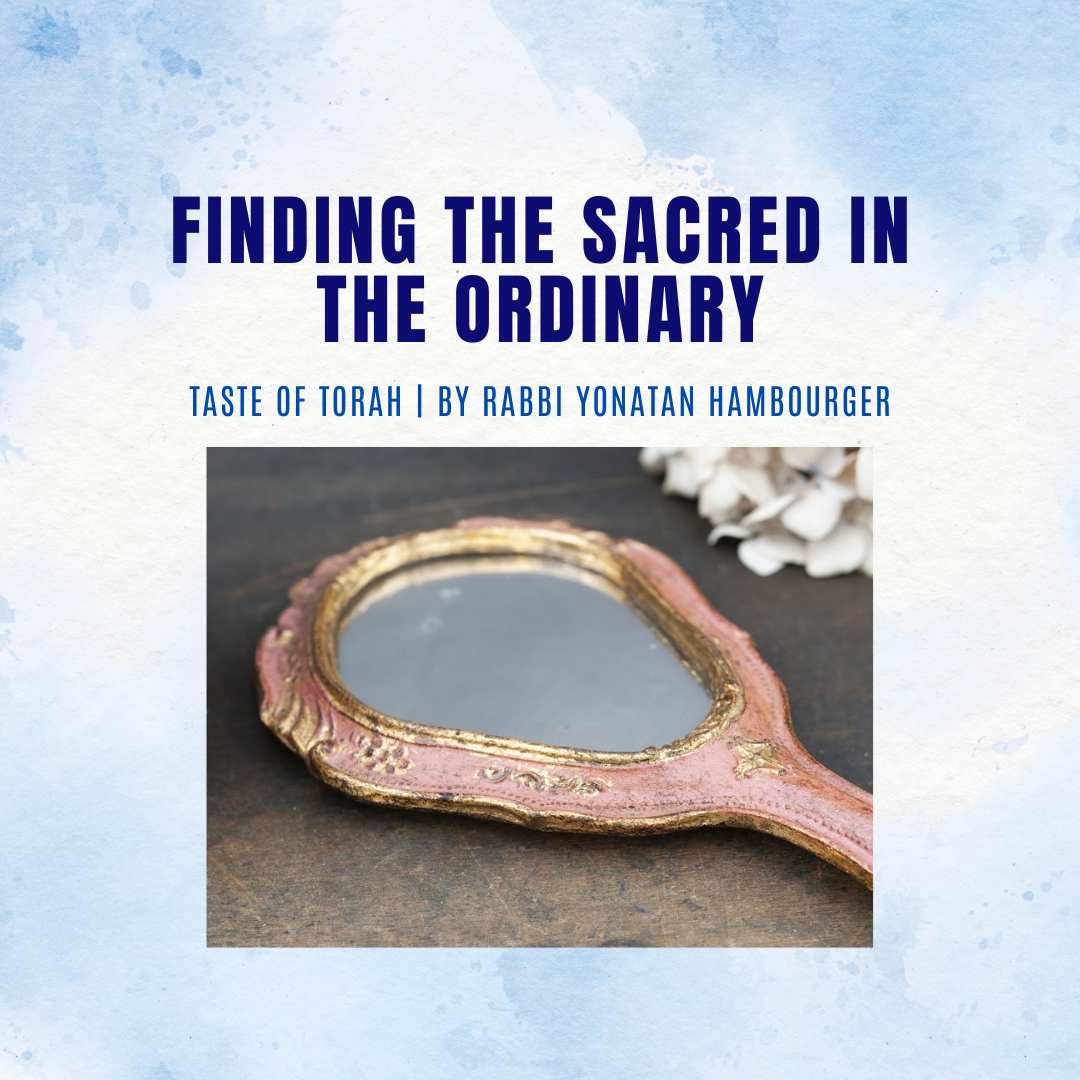
Finding the Sacred in the Ordinary
We often think of holiness as something distant and otherworldly – confined to Houses of Worship, or moments of profound spiritual experience. But Exodus 30:18 reveals a surprising truth about where sanctity can be found.
When the ancient Israelites built their tabernacle in the desert (think of it as a mobile spiritual center), G-d mandated a special washing station for the priests. But here's the surprising part: this station was made from women's used copper mirrors – the same mirrors these women had used during their harsh slavery in Egypt.
Moses initially hesitated to accept these mirrors. In his mind, they represented vanity and physical desire – after all, they were used for beautification. But G-d's response was unexpected and profound: "These mirrors are more precious to Me than anything else."
Why? Because these mirrors tell an extraordinary story of faith and resilience. During the brutal times of slavery, when Jewish men were too exhausted and dispirited to think about family life, their wives refused to give up hope. They used these very mirrors to make themselves attractive, encouraging their husbands to maintain their relationships and ensure the Jewish people's future. What might have seemed like a purely physical act was, in fact, deeply spiritual.
This teaches us something remarkable about how G-d views our world. Sometimes what appears mundane or questionable on the surface can be transformed into something sacred. However, it's crucial to understand that this principle only applies to permissible things used with holy intent. Anything that goes against G-d's will cannot be elevated to holiness, no matter our intentions.
Those mirrors weren't just beauty accessories – they were instruments of survival, hope, and continuity. G-d's message to Moses was clear: true holiness doesn't mean rejecting the physical world. Instead, it means finding ways to elevate ordinary things for higher purposes. Consider something as basic as eating: we can consume food like any other creature, focused only on satisfying our hunger, or we can transform that act by making a blessing, eating mindfully, and using the energy from that meal to perform acts of kindness. Even a simple steak dinner can become a gateway to serving a higher purpose.
In our modern world, where we often separate the "spiritual" from the "mundane," this ancient lesson reminds us that holiness can be found in the most unexpected places – even in a beauty mirror.
Shabbat Shalom,
Rabbi Yonatan Hambourger
March 13, 2025

Second Chances: A Timeless Message
Have you ever wished for a do-over in life? This week's Taste of Torah, drawn from the Book of Exodus (chapters 32-34), offers a fascinating perspective on second chances that speaks to all of us, regardless of our religious background.
At Mount Sinai, the entire people of Israel experienced the most profound divine revelation in history, experiencing G-d directly as He gave the Ten Commandments. Yet, shortly after this extraordinary moment, some turned to worship a golden calf. G-d tells Moses He's going to start over with a new group.
Next, Moses does something unexpected - he breaks the tablets, setting in motion Moses' atonement on behalf of his people, leading to G-d's forgiveness and His decision to provide a second set of tablets.
The first tablets represented a gift from above - pure divine wisdom that embodied G-d's direct instructions to us. But the second tablets incorporated something more: they included the process by which we expound and apply these teachings to our lives. This made the Torah a true partnership between divine revelation and human understanding, teaching us how to actively engage with divine wisdom in our daily lives.
Mountain-top moments might inspire us, but lasting change comes through the steady work of building a relationship. The second tablets symbolize this deeper connection - one we actively create, step by step, using our own understanding and effort.
Interestingly, both the broken and whole tablets were preserved in the Ark of the Covenant. This teaches us something powerful about handling life's failures. Instead of either despairing or trying to start from scratch, we can embrace a third path: carrying our past experiences with us - even the broken pieces - and using them as foundation stones for future growth.
This story carries a powerful message for all of us: it's never too late to start again. We all make mistakes - some small, some significant. But the door to redemption is always open. Whether it's mending a relationship, correcting a wrong, or changing our path in life, a genuine desire to change can create beautiful new beginnings.
I wish you a good week and a Shabbat Shalom,
Rabbi Yonatan Hambourger
March 6, 2025

The Power of Pure Oil: Finding Faith in Difficult Times
This week’s Taste of Torah examines Exodus 27:20, in which G-d commands the Israelites to bring "pure olive oil, crushed for lighting." This seemingly simple instruction carries a profound message that resonates with ancient wisdom and modern life.
Think about olive oil for a moment. Unlike water or wine, it refuses to mix with other liquids – it always rises to the top. Yet paradoxically, it also has the unique ability to seep into almost anything it touches. This dual nature mirrors the Jewish people's historical role: maintaining their distinct identity while profoundly influencing human civilization through values, ethics, and innovation.
But an even deeper lesson here speaks to all people of faith. The finest olive oil only emerges when the olive is crushed. This process mirrors our own spiritual journeys. Often, it's during life's toughest moments – when we feel most "crushed" - that our true character and faith shine brightest.
For my Jewish friends, this might remind you of how our ancestors maintained their identity despite centuries of persecution. For my Christian friends, this reflects the biblical truth that trials and tribulations often reveal the depth and authenticity of one's faith. Both traditions understand that pressure often reveals our hidden potential.
Today, many of us are blessed to live in relative peace and prosperity. We're no longer "crushed" by external forces like our ancestors were. This presents a new challenge: How do we maintain our spiritual identity and purpose when we are not compelled to defend it?
The answer lies in making conscious choices to keep our faith alive. Whether we attend services, study scripture, or simply take time for prayer and reflection, we must actively work to let our inner light shine. Just as pure olive oil kept the eternal flame burning in the Tabernacle and the Temple, we, too, must keep our spiritual flames alive through daily acts of kindness, faith, and purpose.
In these complex times, may we all find the strength to be like pure olive oil—staying true to our beliefs while positively influencing the world around us.
Shabbat Shalom,
Rabbi Yonatan Hambourger
February 27, 2025

Finding G-d in Our Daily Lives
Parshat Terumah 5785; Exodus 25:1-27:19
In the Book of Exodus (25:8), we find a fascinating instruction from G-d to the children of Israel. "They shall make for Me a sanctuary, and I will dwell within it," He tells them. But here's something interesting: in the original Hebrew, the word for "within" is actually plural, suggesting that G-d would dwell not just in the sanctuary, but "within them" – within each person.
This teaching speaks directly to our lives today. Just as those ancient travelers carried their portable sanctuary—the Tabernacle—through the desert, we, too, carry something sacred within us wherever we go. Whether we’re heading to the grocery store, visiting friends, or simply taking an evening stroll, G-d’s presence journeys with us.
Think about that for a moment. The Creator of the universe isn't confined to sanctuaries or formal prayer services. He's with us as we go about our daily routines, available for conversation and connection at any time.
The Jewish sages teach that G-d's purpose in creating the world was for us to make His presence evident in our world. It's like building a home – not just a physical structure but a spiritual one. Each kind word we speak, every helping hand we extend to a neighbor, and all the moments we choose to do what is right: these are the building blocks of our personal sanctuary.
This ancient wisdom reminds us that we don't need to wait for the Sabbath to connect with G-d. He has already given each of us a special place in our hearts where He resides. Whether working in our garden, sharing a meal with family, or simply sitting on the front porch watching the sunset, we can turn any moment into a sacred conversation with our Creator.
So, the next time you wonder if G-d is listening, remember: He's not just listening – He's right there with you, dwelling in the sanctuary of your heart, ready to be a part of every step of your journey.
Shabbat Shalom,
Rabbi Yonatan Hambourger
February 20, 2025

Hidden Wisdom in the Torah’s Laws of Torts and Damages
In this week’s Taste of Torah, we encounter what might seem like a simple set of property laws in the 21st and 22nd chapters of Exodus. At first glance, these ancient statutes about damages and responsibilities might appear purely practical. But as our sages teach us, the Torah's wisdom runs deep, with layers of meaning that speak to our very souls.
The text presents four fundamental types of damages for which we must take responsibility. Picture this: your neighbor's ox wanders into your field and tramples your crops. Or perhaps you've left a hazard on your property that causes injury to a passerby. Maybe you've directly caused harm to another's possessions, or you've let a fire spread beyond your control.
Our sages teach that these four categories – the wandering animal, the hazardous pit, direct human action, and the spreading flame – represent more than mere property law. They mirror the spiritual challenges we face daily.
Consider the wandering animal. Just as we must take responsibility for our livestock's behavior, we must also guard against our own untamed impulses. That hazardous pit? It represents the damage we cause through simple neglect – when we know better but fail to act. Direct damage reminds us that even our most well-intended actions must be guided by wisdom and restraint. And the spreading flame teaches us about the responsibility we bear for influences that begin with us but spread far beyond our immediate reach.
The ancient rabbis understood that these laws serve as a blueprint for refining our character. They knew that by studying these seemingly mundane rules, we would discover profound truths about human nature and our sacred obligations to one another.
In our modern world, where responsibility often seems optional and consequences distant, these timeless teachings remind us that true spiritual growth comes through mindful attention to our actions and their effects on others. They teach us that every deed, no matter how small, carries moral weight and spiritual significance.
May we merit to learn from these ancient wisdoms and apply them in our daily lives.
Shabbat Shalom,
Rabbi Yonatan Hambourger
February 13, 2025

Honoring Parents: A Divine Bridge Between Heaven and Earth
Parshat Yitro 5785; Exodus 18:1-20:23
This week’s Taste of Torah explores the Ten Commandments in the Book of Exodus, Chapter 20—serving as a timeless moral foundation that guides human behavior and promotes ethical principles across various cultures and religious traditions.
The Ten Commandments were inscribed on two tablets, divided into two sets of five: the first deals with our relationship with G-d, and the second with our relationship with fellow humans. Yet something seems out of place.
The fifth commandment - to honor our parents - appears in the first set. At first glance, this seems like a misplacement. Indeed, respecting our parents is about human relationships. Wouldn't it fit better alongside prohibitions against stealing or bearing false witness?
But there's profound wisdom in this placement. By including parental honor among the G-d-focused commandments, the Torah teaches us something remarkable about both parenthood and our relationship with the Divine.
Think about it: our parents are the closest thing we have to experiencing God's creative power. They brought us into existence, nurtured us when we were helpless, and sacrificed countless hours of sleep, personal time, and resources for our well-being. In many ways, they were our first glimpse of what unconditional love looks like.
Yet here's the challenging part - we're commanded to honor them regardless of whether we feel they "deserve" it. This isn't about reciprocating love or repaying kindness. It's about recognizing something more profound: the divine role parents play in the cosmic order of creation.
This placement teaches us that honoring parents isn't just about maintaining healthy family relationships. It's about acknowledging our place in a chain of existence that stretches back to Creation itself. When we honor our parents, we're not just fulfilling a social obligation but participating in something sacred.
This perspective offers both challenge and comfort to those struggling with complex family relationships. The commandment acknowledges that honoring parents isn't always easy—that's precisely why it was commanded. But it also reminds us that when we make this effort, we connect to something larger than ourselves.
In honoring our parents, we honor the very concept of creation and our own role in continuing its legacy.
Shabbat Shalom,
Rabbi Yonatan Hambourger
February 6, 2025

Faith in Action: Four Responses to Life's Challenges
Parshat Beshalach 5785, Genesis 13:17-17:15
This week’s Taste of Torah highlights the 14th chapter of the book of Exodus. The Jewish people stood at the Red Sea, with the Egyptian army closing in behind them. They divided into four groups, each symbolizing different approaches we might adopt when facing obstacles in our own lives.
The first group cried out in despair, willing to surrender and return to Egypt. How often do we also give up when challenges appear insurmountable? The second group readied for war, choosing to fight against impossible odds. The third group began to pray, believing that only divine intervention could save them. The fourth simply wanted to jump into the sea in desperation.
Moses' response to all of them was profound: "Move forward."
But moving forward into a sea seemed illogical, even crazy. This is where Nachshon, the prince and military leader of the tribe of Judah, enters the story, teaching perhaps the most crucial lesson about Jewish leadership and personal growth. While others debated and despaired, Nachshon walked into the sea. Step by step, the water rose to his ankles, knees, waist, and neck—until finally, at the last possible moment, the sea split.
In our modern lives, we often encounter our own "Red Seas" – seemingly impossible situations in our careers, relationships, or personal growth. Like those four groups, we might feel tempted to give up, fight blindly, wait for miracles, or resort to desperate measures.
But Nachshon's example presents a different path: when we have a clear moral imperative and a goal, we must move forward with unwavering focus. Whether it's starting a new business, rebuilding a relationship, or deepening our connection to tradition, the key is to keep moving ahead, even when we can't see the path before us.
The sea didn't split until Nachshon was nearly submerged, reminding us that breakthroughs often come at the moment of greatest challenge. What matters isn't the obstacle in front of us but our determination to take the next step forward.
Shabbat Shalom,
Rabbi Yonatan Hambourger
January 30, 2025
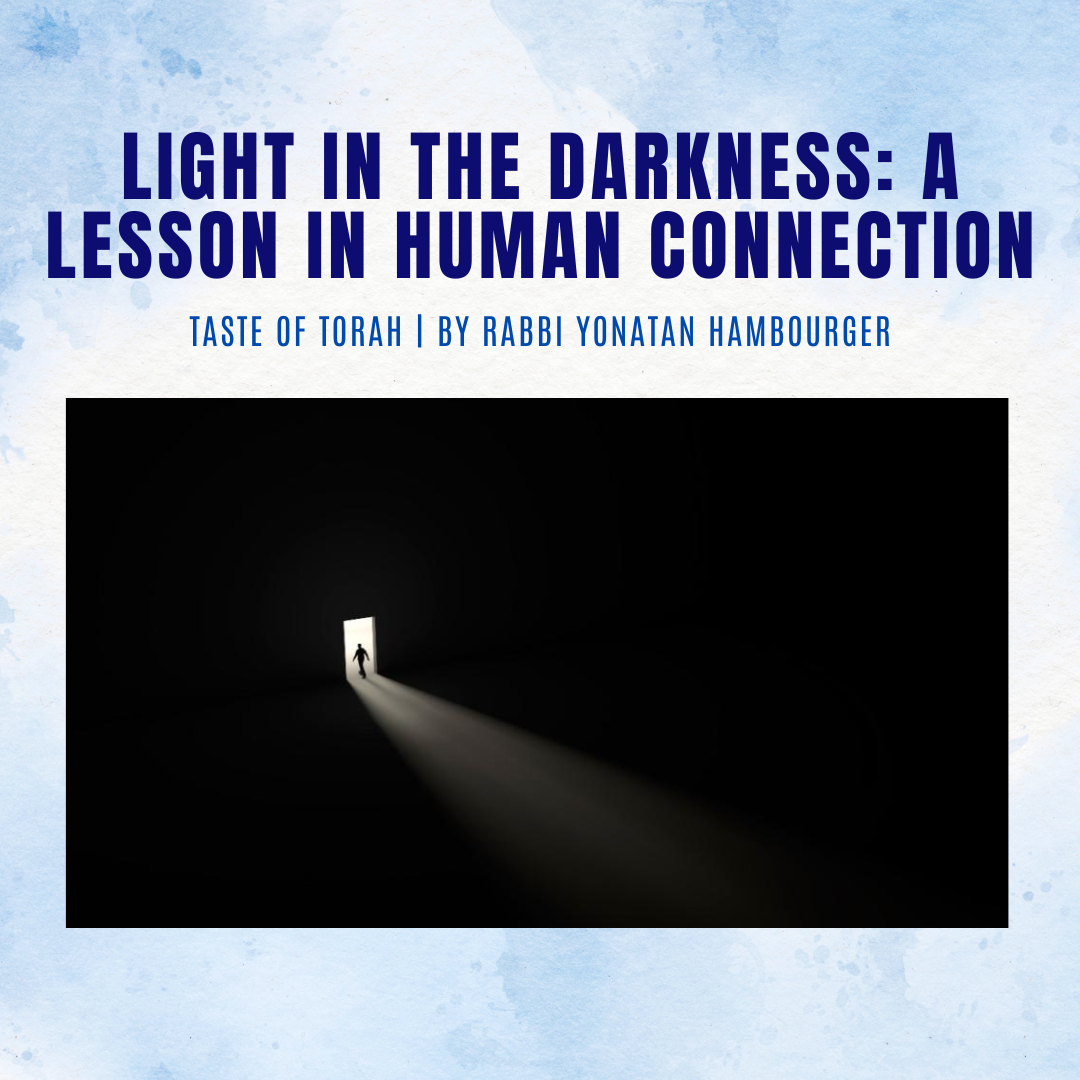
Light in the Darkness: A Lesson in Human Connection
This week’s Taste of Torah examines Parshat Bo (Exodus 10:23), where we encounter one of the most striking contrasts in the Torah: "No one could see anyone else or move about for three days. Yet all the Israelites had light in the places where they lived." This passage, describing the ninth plague in Egypt, provides profound insight into the human condition and our spiritual journey.
The darkness that enveloped Egypt was not merely a physical absence of light. According to Chassidic teaching, an extraordinarily dense and intense darkness immobilized the Egyptians, while the ancient Israelites experienced a remarkably bright environment. This contrast serves as a powerful metaphor for our own lives.
In our modern world, we often find ourselves surrounded by light – the glow of our devices, the brilliance of our achievements, the illumination of our knowledge. Yet paradoxically, many of us live in a different kind of darkness: the inability to truly see those around us. Like the Egyptians who "could not see anyone else," we too can become blind to the needs and struggles of our fellow human beings.
This spiritual darkness can afflict anyone. We might not notice when a friend needs comfort, a family member requires attention, or a colleague seeks understanding. We might become so focused on our personal "light" that we fail to share it with others.
The Torah teaches us that true illumination comes not only from having light but also from seeing and responding to others. The Children of Israel didn't merely have light in their homes; they could see and connect with one another. This serves as a powerful reminder that our most significant achievements mean little if we remain insensitive to those around us.
As we navigate our daily lives, let us remember that the antidote to darkness is not just the presence of light but the willingness to share it. When we extend ourselves beyond our personal concerns to illuminate the lives of others, we fulfill the deeper meaning of this biblical passage – transforming darkness into light through human connection and compassion.
Shabbat Shalom,
Rabbi Yonatan Hambourger
January 23, 2024

The Stubborn Pharaoh Within: Why Knowing Isn't Enough for Real Change
We've all been there. Three weeks into January, those shiny New Year's resolutions already gathering dust. The gym membership card untouched, the garage still cluttered, the late-night snacks still calling our names. And in those quiet moments of honesty, we face an uncomfortable truth: knowing what to change isn't the same as changing.
Our most significant obstacle to transformation isn't lack of knowledge—it's our resistance. Like the ancient Exodus saga we read this week in Parshat Va’era (Exodus: 6:2-9:35), we often see the truth but can't quite bring ourselves to act on it. Like Pharaoh, our hearts become hardened against change, even when we know it's exactly what we need. Pharaoh knew that he could stop G-d from decimating his country by freeing the Children of Israel from their bondage, but he couldn’t bring himself to do it.
Think about it. We're masters at the game of self-deception. We congratulate ourselves for merely recognizing our flaws as if awareness alone deserves a medal. We mistake good intentions for actual progress. But real change? That's a different story.
The secret to breaking free from the habits and fears that hold you back lies in moving beyond pure logic, which transcends reason. Stop trying to outsmart yourself. Instead, connect your desired change to something bigger than yourself. Make it about fulfilling your purpose, about becoming who you're meant to be.
When you align your goals with your deepest values and highest vision for yourself, excuses lose their power. It's no longer about willpower or logic but commitment to your destiny.
So next time you feel that pull toward change, don't just make a mental note. Make a soul-deep commitment. Because when you're answering the call of your highest self, no inner Pharaoh can stand in your way.
After all, true transformation isn't just about changing what you do—it's about becoming who you were always meant to be.
Shabbat Shalom,
Rabbi Yonatan Hambourger
January 16, 2025
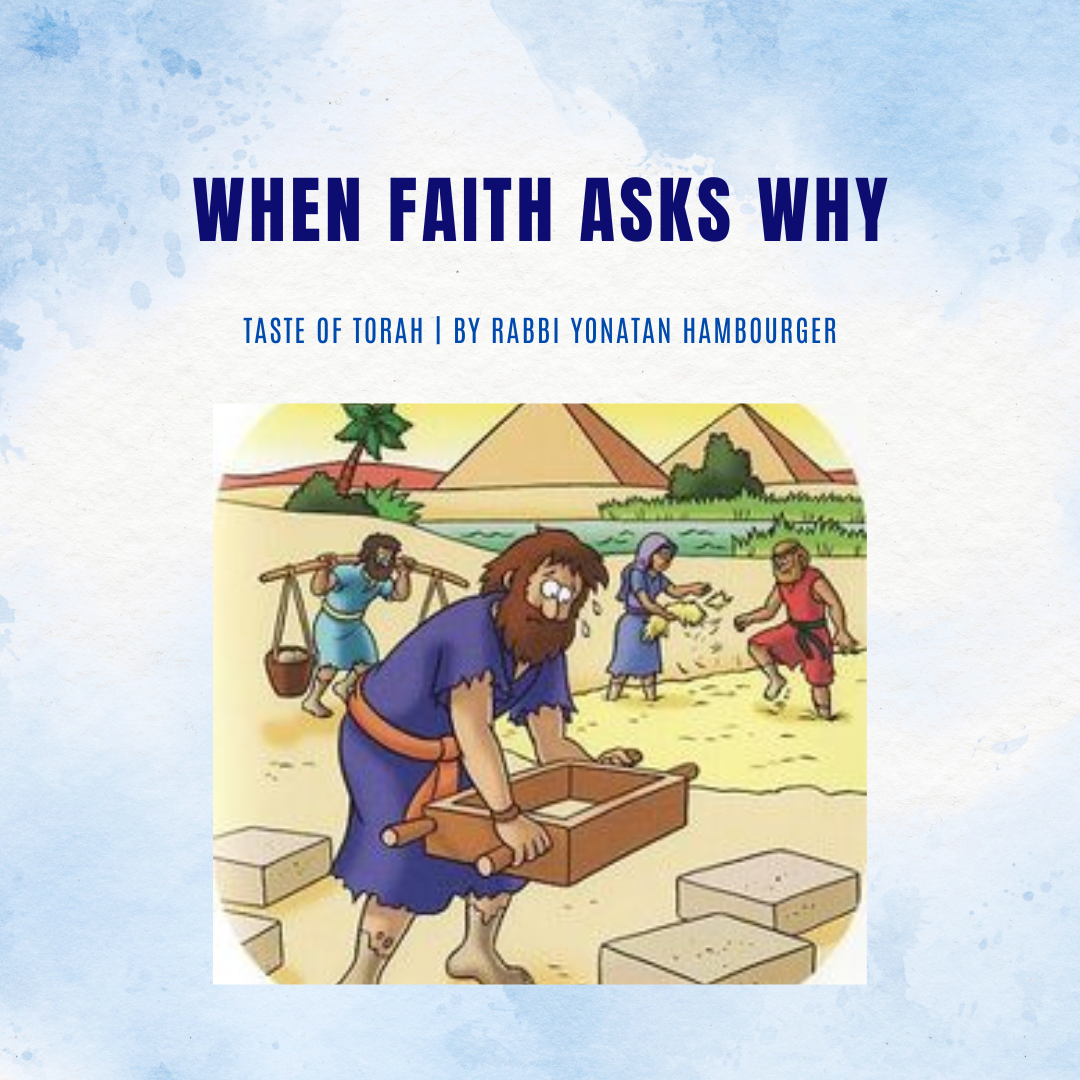
When Faith Asks Why
Parshat Shemot 5785, Exodus 1:1-6:1
In this week’s Taste of Torah, we examine the opening of the book of Exodus, 1:1-6:1, with the Israelites crying out from beneath the weight of Egyptian slavery. God chooses Moses to demand their freedom. But when Moses confronts Pharaoh, things get worse. Much worse.
The Egyptians stopped providing straw for brickmaking yet demanded the same quota. This is akin to your boss doubling your workload while removing your computer. The people who once regarded Moses as a savior now see him as the cause of their suffering.
And that's when Moses does something remarkable. In chapter 2:22, he turns to God and asks, "Why have you mistreated this people?" This isn't the quiet doubt of a skeptic or the angry challenge of a rebel; it is the question of someone who believes so deeply that he needs to understand.
The Jewish people inherited their faith from Abraham, Isaac, and Jacob. But inherited faith is like a hand-me-down coat—it needs to be tailored before it truly fits. Sometimes, that tailoring comes through questions that feel almost too dangerous to ask.
God's response to Moses reveals something profound: the exile wasn't just suffering to endure—it was a crucible for transformation. The people needed more than their ancestors' stories—they needed their own.
Years later, the prophet Jeremiah would capture this tension perfectly. You can believe with every fiber of your being that God's plan is perfect, he suggested, while still crying out, "You are right, yet I still complain!" That's not faithlessness - it's faith growing more mature through honest questioning.
Ultimately, this story isn't just about Moses or ancient Egypt. It's about everyone who has ever looked up to the stars with absolute faith and burning questions. It's about the courage to stand in that space between certainty and doubt, trusting that the very act of wrestling with hard questions can strengthen our faith.
After all, only someone who truly believes in answers dares to ask the most challenging questions.
Shabbat Shalom,
Rabbi Yonatan Hambourger
January 9, 2025
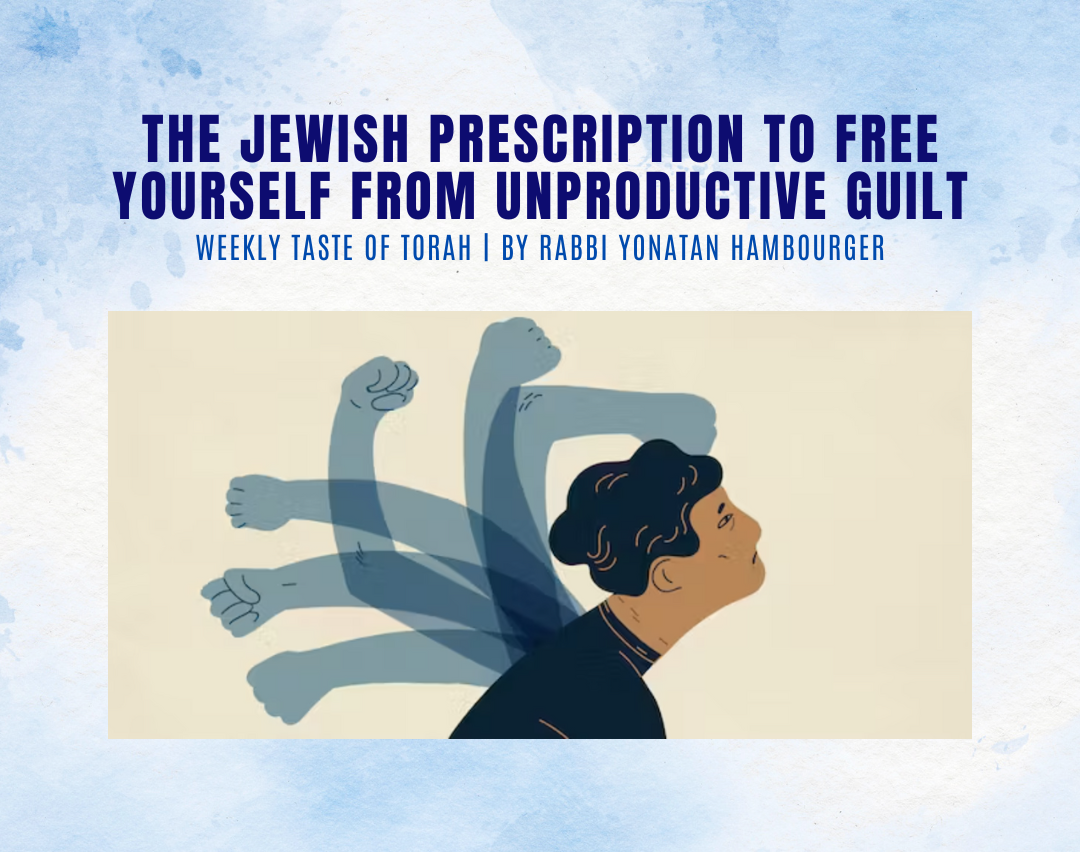
The Jewish Pathway to Liberation from Unproductive Guilt
This week’s Taste of Torah highlights Parshat Vayechi, Genesis 49:15-20. For many years, Joseph had generously cared for his brothers and their families, allowing everyone to thrive. However, when their father Jacob passed away seventeen years later, the brothers were consumed by fear, thinking, "What if Joseph harbors resentment and seeks revenge for the wrongs we inflicted upon him?"
Their hearts were so heavy with guilt that they devised a plan to ensure Joseph would continue to show them kindness. In response to this distressing display of insecurity, Joseph was moved to tears and reassured them with compassion that he would always provide for them.
Is there any value in holding onto guilt and shame over the years? Absolutely not!
At the heart of Judaism lies a profound principle that invites us to rectify our wrongs—no matter how daunting—and move forward. This principle served Adam and Eve after their transgression in Eden and guided the children of Israel after they strayed with the golden calf. Likewise, it can empower you!
Here is your guiding light to liberate yourself from unproductive guilt:
- Articulate your wrongdoings: Clearly express to G-d what you regret and acknowledge your mistakes. Hearing your own voice helps release the burdens that weigh on your spirit so you can let them go once and for all.
- Make amends: Take steps to apologize sincerely to those you've hurt, offering restitution where it’s possible. If forgiveness isn’t granted immediately, persist by trying two more times (after which you are free from obligation according to Jewish law).
- Increase your generosity: Give more charity than you're accustomed to giving. Acts of charity heal not just the world around us but also nourish your own soul.
- Transform your actions: Compensate for past mistakes by striving for improvement—be kinder in your interactions and commit yourself to learning more.
As we embark on this New Year, I urge you to embrace a fresh beginning!
Shabbat Shalom,
Rabbi Yonatan
January 1, 2025

Keep Your Eye on the Ball
This week’s Torah portion of Vayigash can be found in is the book of Genesis, Chapter 44:18-47:27, which deals with the life of Joseph and his brothers…
Envision, for a moment, G-d forbid, a scenario where your own family harbored such deep resentment towards you that they actively sought to undermine your happiness and success during your formative years.
Despite the odds stacked against you, you rise to extraordinary heights of achievement and fulfillment. In stark contrast, your siblings find themselves in dire straits, grappling with poverty and despair. Now, you possess the resources to assist the very family that once treated you so unjustly.
Would you seek vengeance and repay their wrongs in kind? Let us reflect on how our forefather Joseph responded when he ultimately revealed his true identity to his brothers—those who had nearly taken his life and sold him into slavery over two decades prior.
Genesis 45:5-8 beautifully captures Joseph's response in Genesis Chapter 45: 5-8, “Do not be upset with yourselves,” he reassures them. “It was not you who sent me here, but G-d. It has all been ordained from Above to save us, and the entire region, from famine…So now you can understand that it was not you who sent me here, but G-d.”
Indeed, while Joseph’s brothers were responsible for their bad actions before G-d, it is crucial to recognize that had they chosen differently, G-d would have found another way for Joseph to fulfill his purpose.
Joseph grasped an essential truth—that every occurrence in life, no matter how negative it may appear, is woven into G-d’s larger design.
Our lives gain depth and richness when we direct our energies toward our mission rather than nurturing bitterness from perceived slights by others. Their actions are theirs alone—between them and G-d.
By embracing this profound message—even if just partially—we can liberate ourselves from the shackles of unproductive negativity. Let us release the habit of tallying grievances and instead commit ourselves to a greater number of acts filled with goodness and kindness.
Shabbat Shalom,
Rabbi Yonatan
December 26, 2024
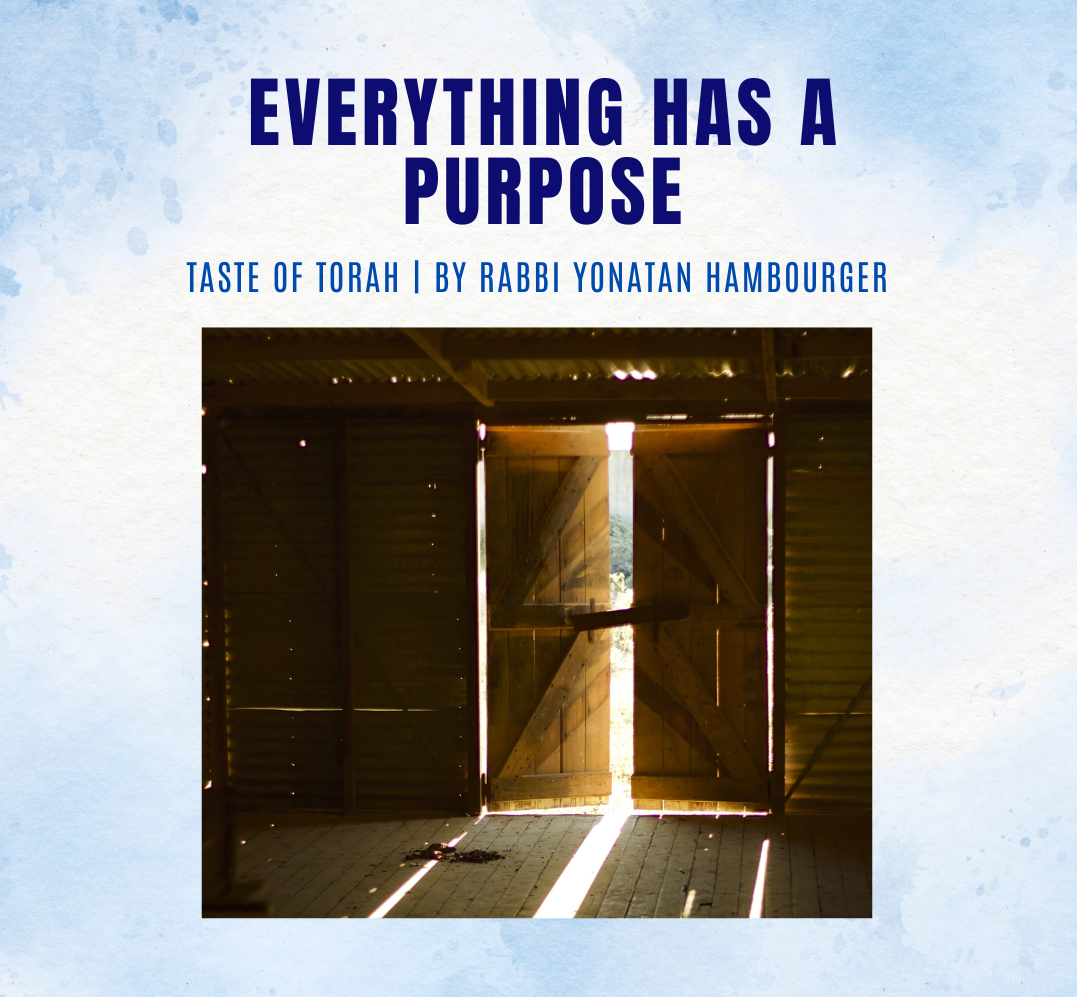
Everything Has a Purpose
This week’s Torah portion, Mikeitz (Genesis 41:1-44:17), unfolds a remarkable story in which the Pharaoh of Egypt elevates Joseph to the position of Viceroy. This decision follows Joseph’s prophetic insight that foretells seven years of plentiful harvests followed by seven years of famine. With wisdom and foresight, Joseph crafts a brilliant strategy to safeguard the nation from impending disaster. Impressed by his brilliance, Pharaoh entrusts Joseph with the crucial task of gathering and distributing grain to sustain the entire country, ensuring that neighboring nations can also purchase any surplus.
In nearby Israel, when famine strikes, Jacob sends ten of his sons to Egypt in search of food—unaware that Joseph is alive and holds power as Egypt's leader. When they encounter Joseph, they fail to recognize him as their brother whom they had sold into slavery two decades earlier.
In a dramatic turn, Joseph accuses them falsely of espionage. In that pivotal moment, the brothers grasp that there must be a higher purpose at play; they come to understand that G-d governs all events, affirming that nothing occurs without divine intention. Reflecting on their past actions, they realize they are enduring consequences for their grievous sin against Joseph—selling him into slavery and deceiving their father into believing he was killed by wild animals.
As they connect these painful memories with their present plight, repentance floods over them, leading to redemption. Eventually, Joseph reveals his true identity to his brothers, and Jacob and the entire family are invited to settle in Egypt’s most fruitful lands as honored guests.
The profound takeaway for us lies in recognizing that every event is imbued with meaning; nothing is merely coincidental. When faced with adversity, it may signify an opportunity from G-d for introspection and repentance regarding past misdeeds—even those long forgotten. Acknowledging our errors and seeking forgiveness can transform our circumstances toward a brighter future.
Happy Holidays, Chanukah Samayach, & Shabbat Shalom,
Rabbi Yonatan
December 19, 2024
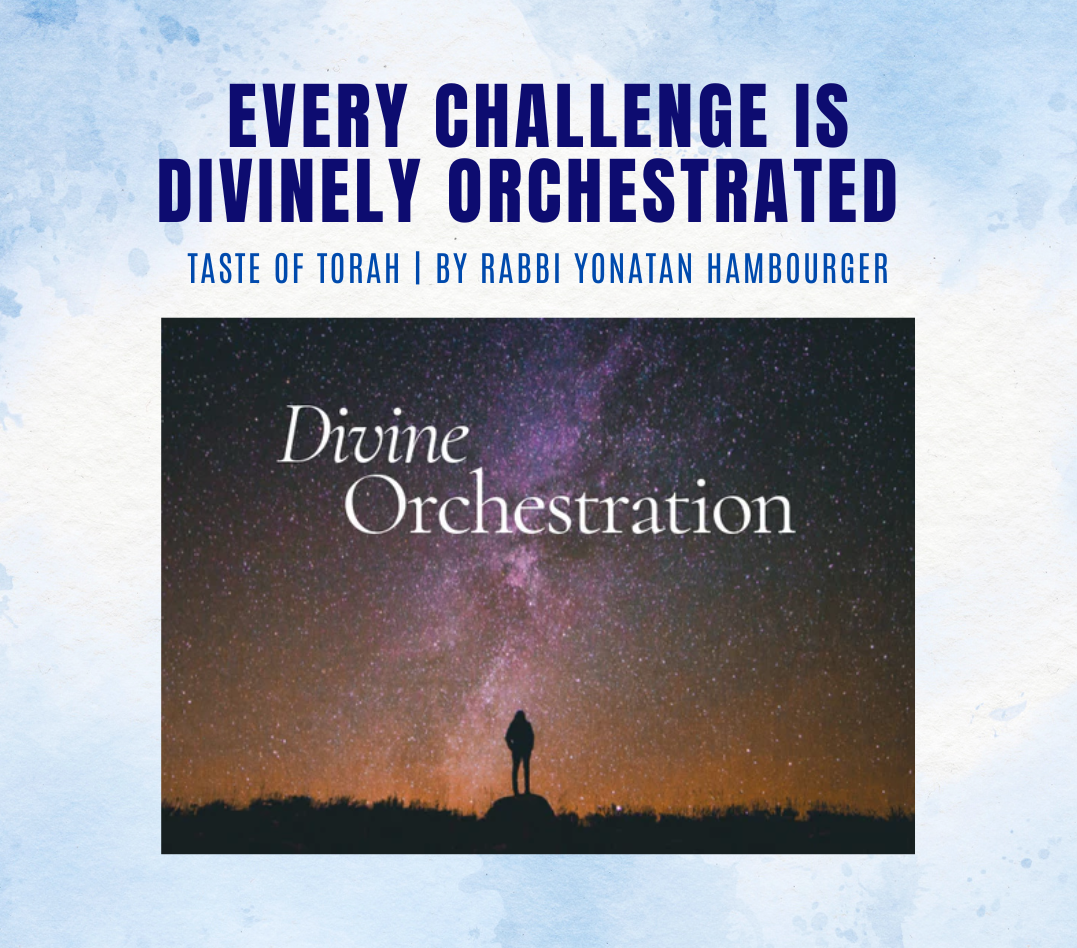
Every Challenge is Divinely Orchestrated
In this week's Torah portion of Vayeshev (Genesis 37:1-40:23), we read the remarkable story of Joseph. Despite being loathed by his brothers, who sell him to a group of Ishmaelite nomads, his journey turns for the worse as he is sold at an Egyptian slave auction to serve Pharaoh's royal butcher. When faced with the seductive advances of his master's wife, Joseph's steadfast refusal leads to his unjust imprisonment in a dungeon for twelve long years.
During his time behind bars, he encounters two fellow inmates—the royal butler and the royal baker—whose dreams he interprets with remarkable insight. This very gift becomes crucial when Pharaoh summons him to unravel his own troubling dreams, paving the way for Joseph’s liberation and rise to Pharaoh's trusted second-in-command. He goes on to save Egypt as well as his own family from starvation.
I would like to focus on a tiny but remarkable detail: While in prison, Joseph observes that the wine steward and the baker appear despondent. “Why are your faces looking so sad today?”
Why does Joseph care if these guys are having a bad day? They were not his friends. But to Joseph, the fact that G-d had arranged for him to notice someone in need indicated that it was his duty to help.
Joseph lived with an understanding that all events unfold for a purpose, believing wholeheartedly that each challenge was divinely orchestrated. In every circumstance, he embodied the belief that Divine Providence guides us toward our true path.
Let us draw upon this lesson as we face our own trials and tribulations. May we muster the courage to confront any adversities that may arise in our lives by recognizing that everything originates from G-d and serves a greater purpose. Rather than succumbing to feelings of victimhood, let us strive to seize the opportunities granted by Divine Providence with gratitude and determination.
Shabbat Shalom,
Rabbi Yonatan
December 12, 2024

Blessed Beyond Merit
This week's Torah portion, Vayishlach (Genesis 32:4-36:43), reveals one of the most poignant stories in scripture. Jacob had escaped his brother Esau’s temper more than thirty years prior. Now, Esau approaches with a formidable army of 400 men.
Decades earlier, following his mother Rebecca's command, Jacob had taken with ‘guile’ two blessings meant for Esau from their father, Isaac. It is crucial to differentiate this act from the Abrahamic blessing Isaac deliberately granted to Jacob, ensuring that the spiritual legacy of Avraham would remain with the Jewish people through him.
As the encounter loomed closer, Jacob devised a three-part strategy to ease Esau's hostility. He sent a generous gift to win Esau’s favor, turned to G-d in heartfelt prayer, and prepared himself for conflict if necessary.
G-d blessed Jacob, transforming what could have been a fierce clash into a moment of deep if fleeting, reconciliation with his brother.
Upon examining the essence of Jacob's prayer, we recognize that despite his many merits and prior divine promises of support and success, Jacob's heart was still weighed down by fear. In Genesis Chapter 32:4-13, he earnestly cries out to G-d, humbly admitting, “I am no longer worthy, due to all the acts of kindness and trustworthiness that You have done for me...” Jacob sought G-d’s help by placing his faith solely in divine mercy rather than in his own achievements.
Following Jacob’s example, when we reach out for G-d’s assistance, we too should appeal to His infinite kindness and compassion. If we anchor our requests in our own sense of worth, even with our many merits, G-d’s response may be limited to those very accomplishments. However, when we humbly relinquish our sense of entitlement and rise above our narrow viewpoints, as Jacob did, G-d can shower us with blessings that transcend the ordinary limits of the world.
Shabbat Shalom,
Rabbi Yonatan Hambourger
Click on the button to subscribe and receive an update each week!
December 5, 2024

Ladders Over Bridges
In this week's Torah reading, Vayetze (Genesis 28:10-32:3), we accompany Jacob as he departs from his hometown of Beersheba in Israel, embarking on a journey to Charan, which lies in present-day Turkey. During his travels, he arrives at “the place” (Jerusalem) and experiences a profound dream of a ladder that unites heaven and earth, with angels gracefully ascending and descending upon it (28:12).
The Torah employs the metaphor of the ladder to illustrate the connection between the divine and the earthly realms, allowing us to comprehend the essence of transformation.
As we stand at pivotal moments in our lives, we often attempt to bridge the distance from our current situation to where we aspire to be. However, even as we strive for change in location, true growth within may not occur. Remaining at a constant level can prevent us from rising above our existing state.
On the other hand, by climbing or descending the rungs of a ladder, we experience gradual shifts in elevation. We are perpetually either ascending or descending; stagnation is not an option. Our viewpoint expands as we rise higher, or it constricts as we descend.
We can utilize Jacob’s ladder as a tool for measuring our spiritual progress. Each rung represents our spiritual altitude at any moment—whether one is on a lower rung making strides upwards or perched high but slipping downwards. One thing remains clear: there is no static existence; we are either climbing towards our aspirations or sliding away from them.
Jacob’s ladder serves as a spiritual compass, guiding us to realign our thoughts, words, and actions toward positivity. You have the power to begin this journey right now by evaluating your position on your ladder concerning your own mindset. And always remember: should you find yourself sliding down a rung, you possess the strength to ascend even higher than before.
Shabbat Shalom,
Rabbi Yonatan
November 28, 2024
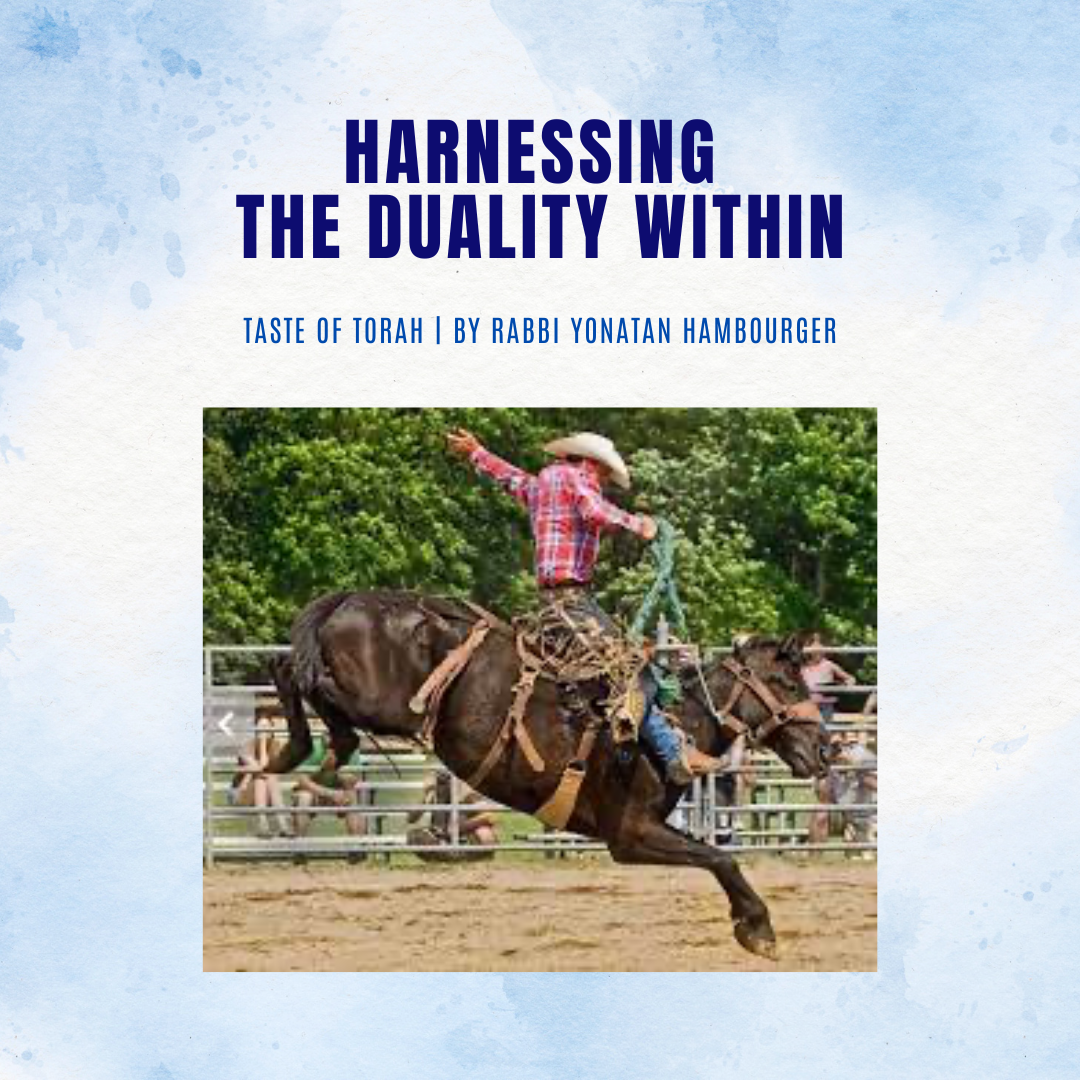
Harnessing the Duality Within
This week’s Torah portion, Toledot (Genesis 25:19-28:9), unfolds the narrative of Isaac and Rebekah's twin sons, Jacob, and Esau. From the very beginning, even while still in their mother’s womb, it is evident that these brothers will embody stark contrasts—both physically and spiritually. Their journeys through life are destined to intersect in a way that one’s achievements often come at the expense of the other’s. Yet, there lies a profound truth: despite being the firstborn, Esau is foretold to serve his younger brother, Jacob.
In a metaphorical sense, Esau symbolizes our animalistic instincts, while Jacob embodies our aspirations toward morality and spiritual growth. Just as Esau was born before Jacob, so too do our raw, animalistic impulses emerge ahead of our moral compass; our values develop gradually over time, while our base instincts are fully formed from birth.
Chapter 25:26 illustrates this dynamic beautifully with the image of “Jacob’s hand grasping Esau’s heel.” This signifies how our inner Jacob—the divine aspect within us—seeks to elevate and refine our inner Esau, which represents our base inclinations. The heel of Esau signifies the most materialistic dimensions of existence.
Essentially, our divine essence endeavors to uplift even those facets of life that may seem distant from holiness. When we allow our higher selves to shine forth, we diminish the grip of materialism on our lives.
Our inner "animal," though capable of wrongdoing, is not inherently evil; rather, its strength provides us with essential material sustenance. However, it is up to our inner "adult" to tame this “animal within,” channeling its power towards a greater purpose aligned with G-dly values.
Just as light effortlessly dispels darkness without struggle, so too does our higher self conquer animalistic urges. When we invite holiness into our lives through Torah study and adherence to G-d's commandments, we illuminate the shadows cast by selfishness and awaken a more profound goodness within ourselves.
Shabbat Shalom,
Rabbi Yonatan
November 21, 2024

The Torah’s Prescription for Aging Well
This week's Torah portion, Chaya Sarah, is drawn from Genesis 23:1–25:18. Let us hone in on chapter 24:1, where it states, “Avraham grew old, and he came in days.”
At first glance, the expression “he came in days” may seem redundant; it simply conveys that he grew old. However, Jewish mystics interpret this phrase as a testament to someone who maximizes each day by engaging in good deeds—these acts become a ‘garment of glory for his soul.’
Delving deeper, “he came in days” reflects not only the achievements of one’s life but also the mindset with which we approach our daily experiences.
In our youth, we often perceive endless possibilities within every interaction and moment. Yet as we face disappointments and setbacks over time, even our successes can start to feel monotonous. The joys of life lose their vibrancy while the sorrows dull.
When we consider that Avraham “grew old and he came in days,” we recognize a man who immersed himself fully in each moment rather than merely existing through them.
Earlier in Genesis 18:11, we find a similar description stating that “Avraham and Sarah were old, coming in days.” The repetition of this sentiment—forty years later—underscores how time did not lessen Avraham's zest for life.
What made Avraham truly remarkable was his ability to continue embracing each day as he aged. A lifetime filled with challenges and victories did not quench his desire for existence. He lived each day with full engagement, possession, and celebration.
Let us draw inspiration from Patriarch Avraham and embrace the wisdom of the phrase “Carpe Diem”— “Seize the day!”
Shabbat Shalom,
Rabbi Yonatan
November 14, 2024

No Man is an Island
In this week's Torah portion of Vayera, we find the Bible’s first illustration of the Value of Social Responsibility as articulated vis a vis Avraham in the book of Genesis (Chapter 18:20-33). While ancient civilizations prioritized individual survival at the expense of the vulnerable, the Torah introduced a transformative principle: the moral obligation to care for every member of society.
While Noah and Avraham stand as pivotal figures in the narrative of humanity, their different responses during times of crisis serve as powerful lessons for us today.
When faced with the impending destruction of the wicked, Noah complied with divine instruction, constructing the Ark to ensure his and his family's safety. Yet, he showed no empathy for those condemned around him, believing that since G-d had already decreed their fate, there was no reason for further concern. However, G-d had hoped for Noah to intercede on behalf of these lost souls.
In stark contrast, Avraham exhibited profound compassion for the wicked inhabitants of Sodom and Gomorrah. Their sin lay not only in neglecting the poor and needy but also in committing unspeakable acts of cruelty against guests and those who sought to help.
Avraham fervently advocated for these individuals despite their wickedness, engaging in a remarkable dialogue with G-d. Ultimately, his pleas did not alter their fate, but his determination was not in vain; G-d valued that commitment, even if it did not yield a tangible reward.
This exemplifies how the core of Social Responsibility is intricately woven into the fabric of Jewish identity. As Christianity adopted and spread this principle, the message to aid those in need resonated with a broader global audience.
Cultivating a sense of responsibility for others is vital, and we must act on it. Let us commit ourselves to caring for those around us, showing genuine interest in their well-being, and offering assistance in any way we can. Embrace the opportunity to uplift the person beside you!
Shabbat Shalom,
Rabbi Yonatan
November 7, 2024
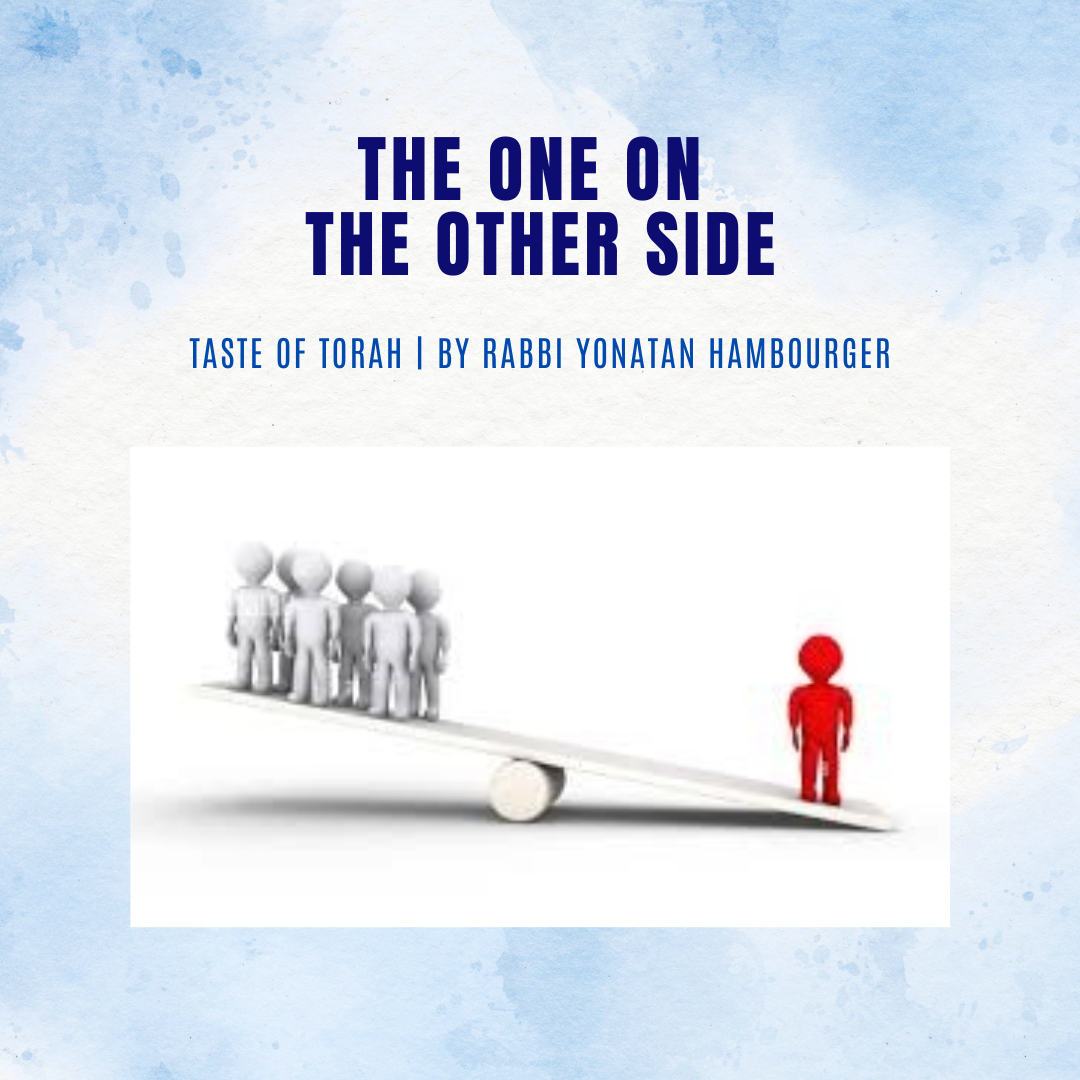
The One on The Other Side
In this week’s Torah portion, Lech Lecha (Genesis 12:1-17:27), we encounter Avraham, the founding father of the Jewish people, who brought forth the concept of ethical monotheism to humanity. This profound idea serves as the cornerstone for the religious beliefs that shape much of our world today and has significantly influenced how Western, secular societies perceive life in general.
Around 3,800 years ago, during Avraham's time, paganism dominated the world with a worldview that creation stemmed from multiple competing forces that remained indifferent to human affairs. In contrast, Avraham unveiled the truth of a singular Creator and embarked on a mission to eradicate idolatry. This is perhaps why the Torah designates him as “Ha’Ivri,” translated as “the Hebrew,” which means “the one on the other side,” symbolizing his position apart from a world steeped in cruelty and corruption.
Avraham introduced a revolutionary perspective: that Creation is a deliberate act by a unified and loving God, instilling within civilization a sense of purpose for our existence. With this understanding comes not only fulfillment but also an invigorating motivation to live life fully.
In contrast to the nihilistic tendencies of today’s neo-pagan philosophies—where life’s goodness seems merely contingent upon chance—Judeo-Christian values affirm that God embodies inherent goodness. He possesses infinite capabilities and cares deeply for His creations. This belief nurtures our trust in a positive outcome for our lives.
Does this imply that every situation unfolds as we wish? Not necessarily. However, regardless of life's twists and turns, we can face each moment without fear because we are in His capable hands; He understands what is truly best for us.
Understanding the Creator is not merely a goal; it embodies the essence of our very being. Inspired by Avraham's legacy, let us strive to share this profound truth with everyone we encounter.
Shabbat Shalom,
Rabbi Yonatan
October 31, 2024
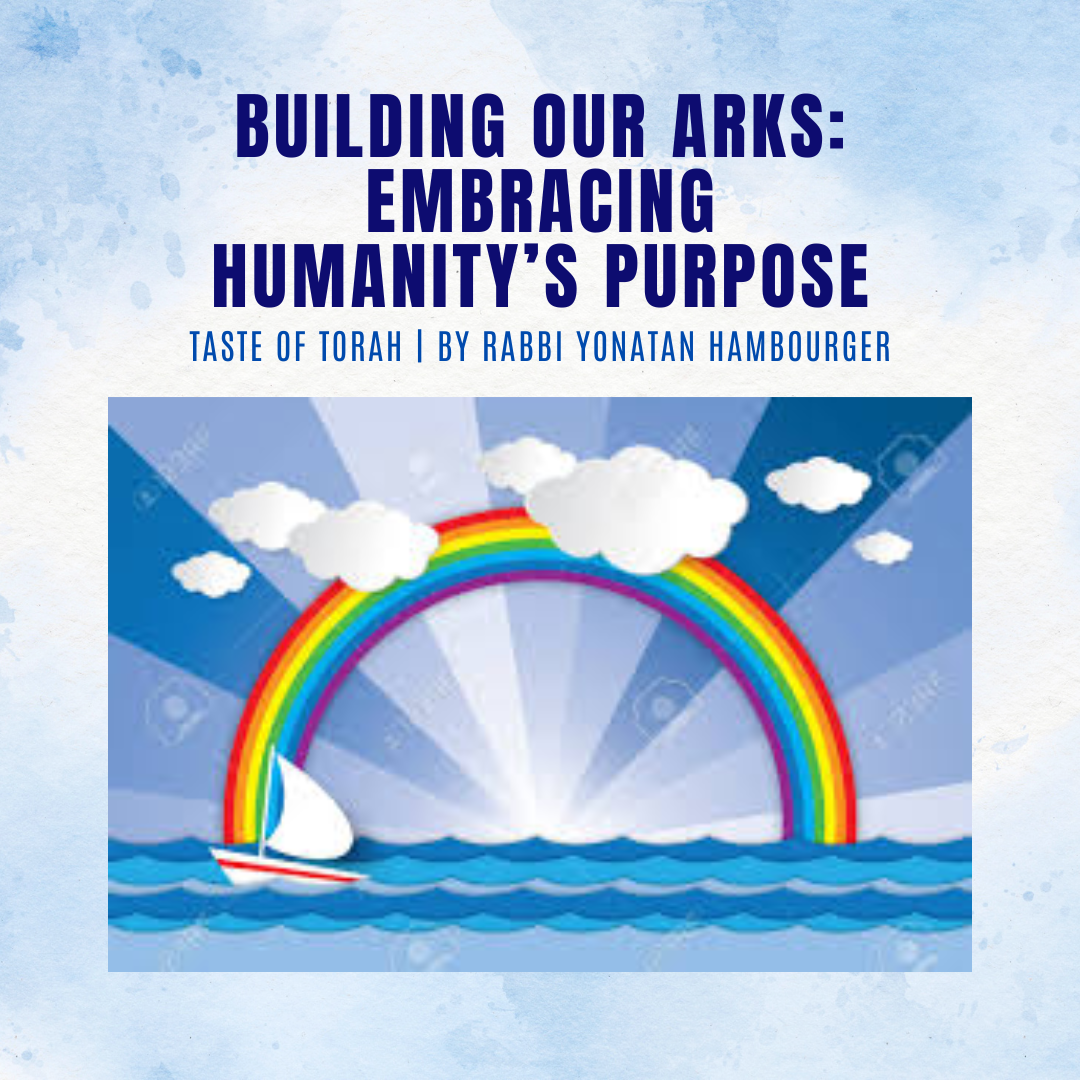
Building Our Arks: Embracing Humanity’s Purpose
This week we read in the story of Noah and the Ark, how humanity had sunk into an abyss of moral depravity. The one notable exception was Noah, “perfect in his generations,” who was tasked by G-d to build an ark to save his family as well as every species of animal from the coming deluge.
What you may not know is that even after G-d decided to flood the Earth, he gave everyone ample opportunity to change their ways and live. Even after the downpour started people could have transformed the destructive storms into rains of blessing, but they remained hard-hearted.
Upon leaving the ark, Noah and his family were charged with re-building humanity based on G-d’s original plan for Adam and Eve. They were provided with a set of ethical laws for all human society, for all time.
These universal laws include: (1) expressing gratitude to the Divine; (2) striving to improve the lives of others; (3) respecting the sanctity of human relationships, particularly within family life; (4) embracing a life of generosity and contentment; (5) being accountable for the welfare of all of creation, including animals and the planet; and (6) promoting a system of genuine justice and charity, encouraging others to act with fairness and generosity.
There are destructive rains in every generation, representing various anti-spiritual influences. They may appear harmless at first, but ultimately can destroy the very fabric of society.
Each person, each family, each community must make sure that their ark is watertight, by embracing G-d’s wisdom as established in these laws. But it’s not enough to keep darkness out. Each of us must encourage the light within to shine outward and transform the surrounding darkness into G-dly light.
All that’s missing is to embrace the common ground found in G-d’s message of humanity’s purpose.
Shabbat Shalom,
Rabbi Yonatan
October 22, 2024
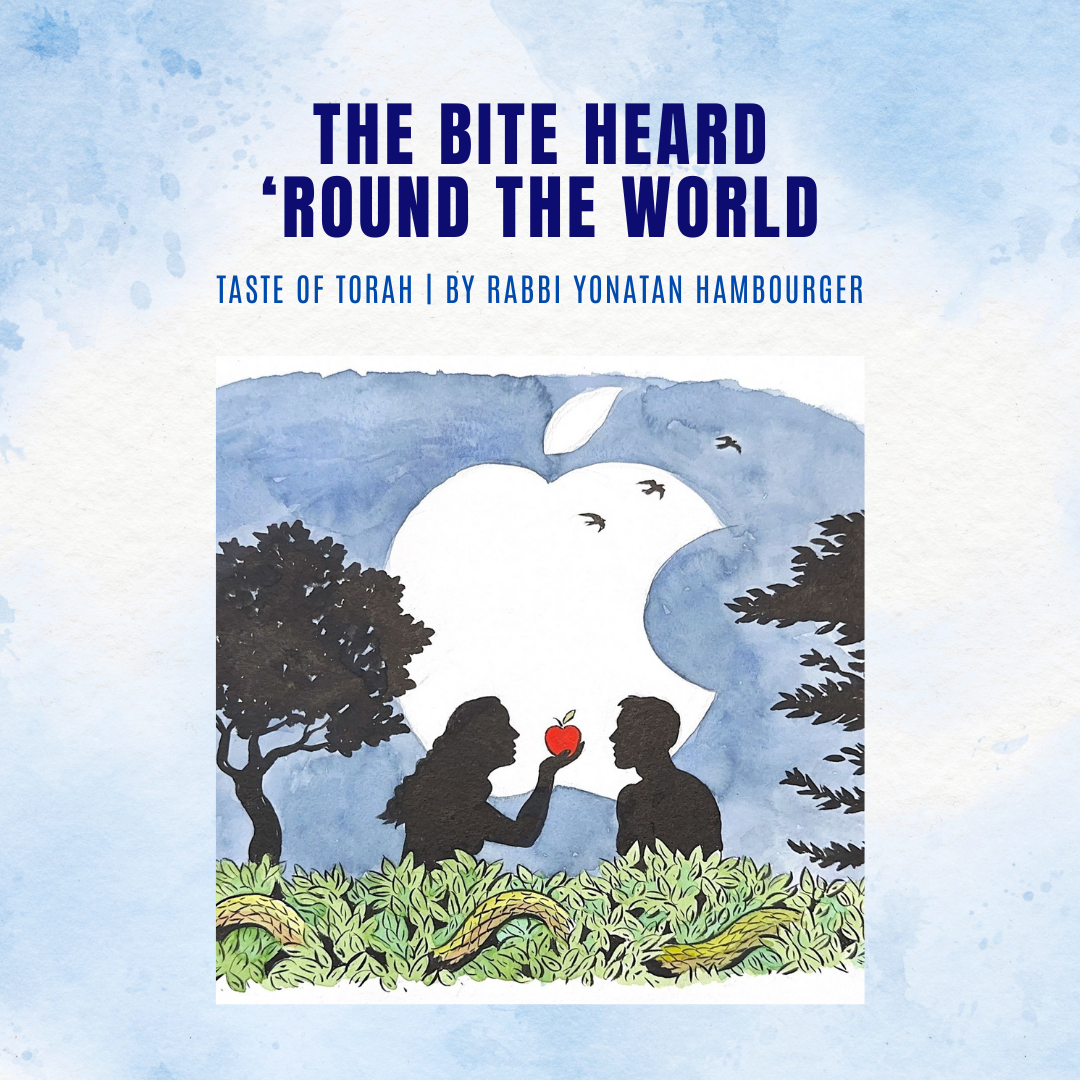
The Bite Heard ‘Round the World
This week, we start the Torah from “the beginning,” and we revisit the Garden of Eden with the bite heard ‘round the world, still reverberating through the present day.
Despite being furnished with everything they needed to live in paradise, with just one little condition not to eat the fruit from the tree of the knowledge of good and evil, Adam and Eve seemingly couldn’t resist!
But weren’t these perfect human specimens fashioned by G-d himself? Couldn’t they control their desires?
But what if they made a fully informed decision to trade paradise for toil, struggle, and certain death, not just for themselves and their family but also for all of humanity?
What if Adam and Eve didn’t want a perfect life given to them and all their descendants? What if they willingly chose a life challenged relentlessly by darkness, lust, and envy?
Maybe they knew what they were doing, and maybe they chose wisely, for people handed life on a silver platter seldom realize their full potential.
Thanks to Adam and Eve, humanity was gifted with a mission to bring heaven down to earth and transform G-d’s creation back into a garden. Yes, there are thorns and thistles, struggle, and pain, along the way but also the satisfaction of one’s own efforts on his way to accomplishing ultimate good.
Only with the coming of Moshiach (speedily in our days) when the world reverts to the perfection of the Garden of Eden, will we fully appreciate the fruits of our labor.
Most definitely a more challenging path, but also incomparably more rewarding.
Shabbat Shalom,
Rabbi Yonatan
October 15, 2024
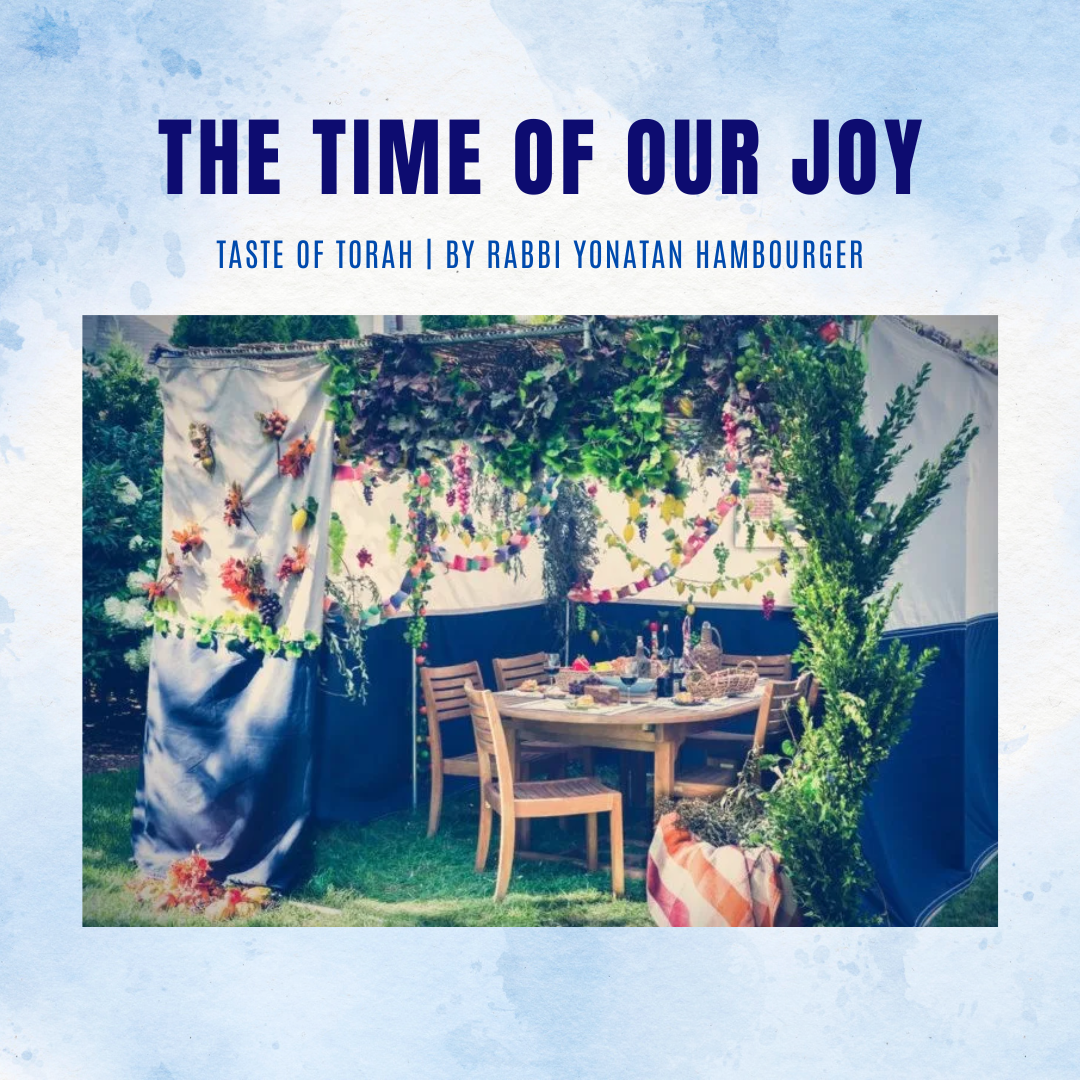
The Time of Our Joy
This coming Wednesday evening, October 16th, we begin the weeklong celebration of Sukkot, also known as the Feast of Booths. Sukkot is referred to in the Torah as “the time of our joy.”
We began this Jewish month of Tishrei on Rosh Hashanah by making good resolutions, giving extra charity, accepting G-d as our King, and pleading to be written into the Book of Life, Health, and Prosperity.
As soon as we finished with Rosh Hashanah, we entered the solemn period known as the Ten Days of Repentance, when we examined and improved our ways.
Then, last week, we experienced the holiest day of the year, Yom Kippur, when neither food nor drink passed our lips for 26 hours as we cried out and atoned by articulating our misdeeds and resolving to do better.
Immediately after breaking our fast, with one hand grasping a bagel and cream cheese, we began building a flimsy, thatched hut in our backyard, known as a Sukkah.
Every night of the week, we invite friends and strangers to our sukkahs, where we eat yummy holiday delicacies, drink plenty of wine, sing, and dance.
Why do we move so quickly from the formality and solemnity of the High Holidays to what best could be described as a Jewish Hootenanny?
More important than whatever we promised while pleading and fasting is how we are going to apply all the good resolutions we made and turn them into reality.
We seldom accomplish our goals by “white knuckling”; quite the opposite, the only way to create lasting change is through joy!
There are thirty-two Chabad Shluchim (Rabbis) throughout Georgia, and each one is waiting to welcome you to their sukkah. Please let me know if I can help facilitate a fun and spiritual experience for you and your family.
Good Yom Tov, Happy Holidays!
Rabbi Yonatan
October 10, 2024
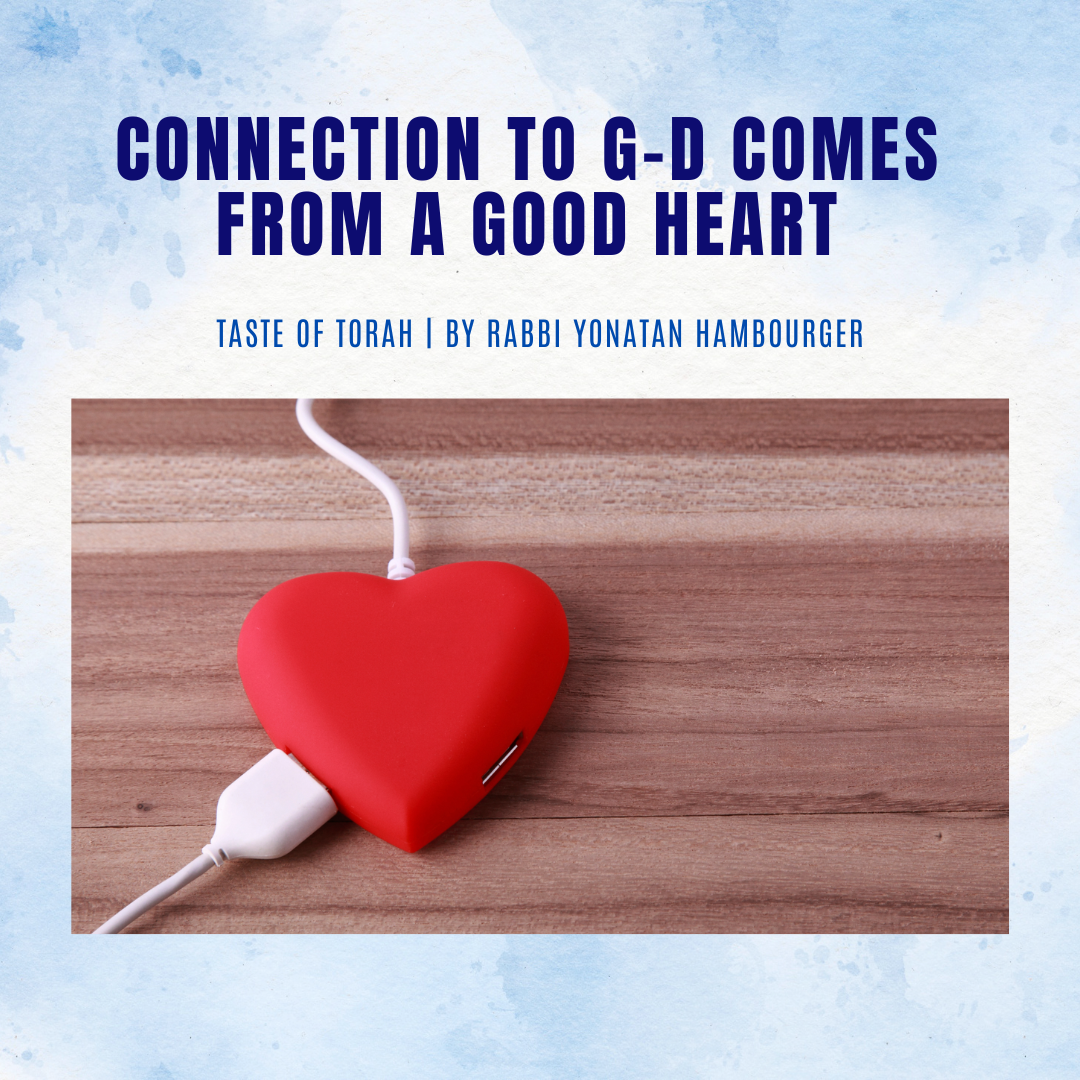
Connection to G-d Comes From a Good Heart
Friday evening, October 11th marks the onset of Yom Kippur which is known in English as the day of repentance. Neither food nor water passes our lips for 25 hours, until Saturday night.
There are several means to strengthen or re-establish our connection to our Father in Heaven. One such way is to practice the well-known dictum to love your neighbor as yourself because “anyone with whom his fellowmen are pleased, G-d is pleased with.”
To illustrate, I would like to share a well-known story: One Yom Kippur eve, the Alter Rebbe took his place in the synagogue, put on his prayer shawl, and began his preparations for the solemn opening (Kol Nidrei) prayers. Suddenly he stopped, removed his tallis, and left the synagogue.
He walked to the end of the town and entered a dilapidated cottage, where a young mother was lying with her newborn child. He chopped wood, made a fire to warm the house, and prepared her some soup. He returned to the synagogue only when he was sure she had everything she needed.
Now, there were other people in the synagogue at that time. Nevertheless, the Alter Rebbe did not instruct someone else to help the woman: he went to help her himself. And when did he do so? When he was deep in meditation before prayer, while intensely bonded with G-d. At that time, too, he was sensitive to her distress.
To “love your neighbor as yourself” is the path to connection and re-connection to G-d that comes from a good heart—wishing you an inspiring and uplifting Yom Kippur and a new year filled with an abundance of G-d’s revealed blessings in all domains of your life!
Shabbat Shalom & Good Yom Tov (Happy Holiday)!
Rabbi Yonatan
October 3, 2024
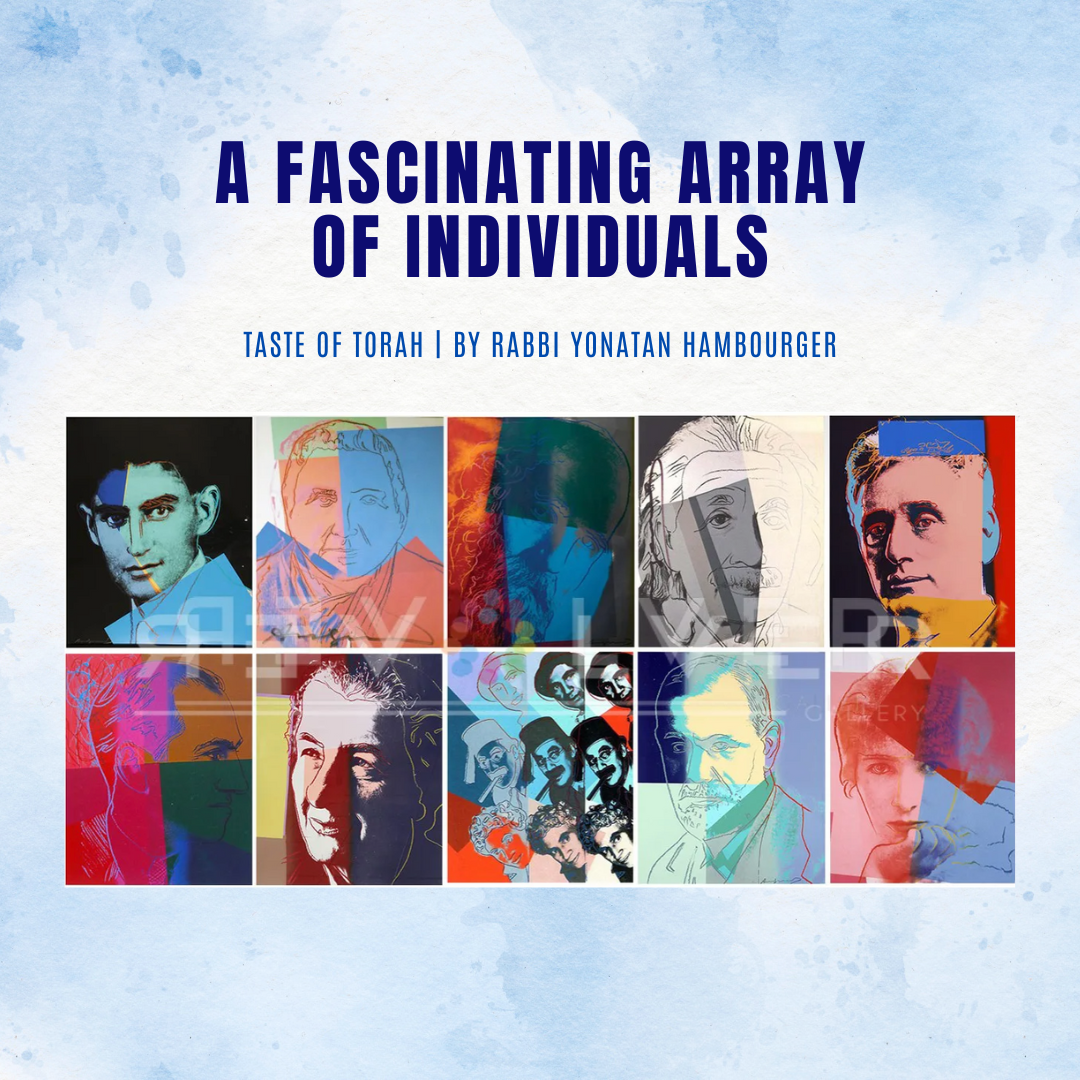
A Fascinating Array of Individuals
Going to synagogue during Rosh Hashanah, which falls on Thursday, October 3rd, and Friday, October 4th, offers a wonderful opportunity for observing the rich tapestry of humanity around us.
You'll encounter plenty of "observant" Jews, who always know the correct page in the prayer book. But the real excitement lies beyond that...
As you look around, you’re likely to meet a fascinating array of individuals: Jewish atheists, JINO’s (Jews in Name Only), Jewish Buddhists, Jews who embrace diverse pronouns, and Jews adorned with piercings and tattoos.
What binds this eclectic group together, and what do they hope to gain from the experience?
The Rebbe poignantly captured this sentiment when he shared a vivid scenario:
“Imagine a non-observant Jew who awakens on Rosh Hashanah morning, shaves, brews a cup of coffee, and tunes in to the radio only to hear the announcement, ‘Today is Rosh Hashanah.’ In a rush, he dashes out of his house, hops into his car, and speeds to the synagogue. Once inside, he finds his seat and opens his prayer book for a brief fifteen minutes. Suddenly, he realizes he’s late for a business meeting, slaps his forehead, closes the prayer book, and rushes out.”
The Rebbe concluded, “You cannot fathom the joy G-d experiences from those fifteen minutes he spent in the synagogue.”
Jews are inspired not out of fear of consequences, but rather because they sense that G-d—whom some may claim not to believe in—has unwavering faith in their potential to grow and to foster a better world!
We are all born as believers, descendants of those who received the divine revelation at Mt. Sinai. Although we may sometimes feel detached from our essence, the hearts of all remain receptive to the profound truths of the Torah.
May you be inscribed in the Book of Life for a good and sweet new year!
Rabbi Yonatan
September 26, 2024
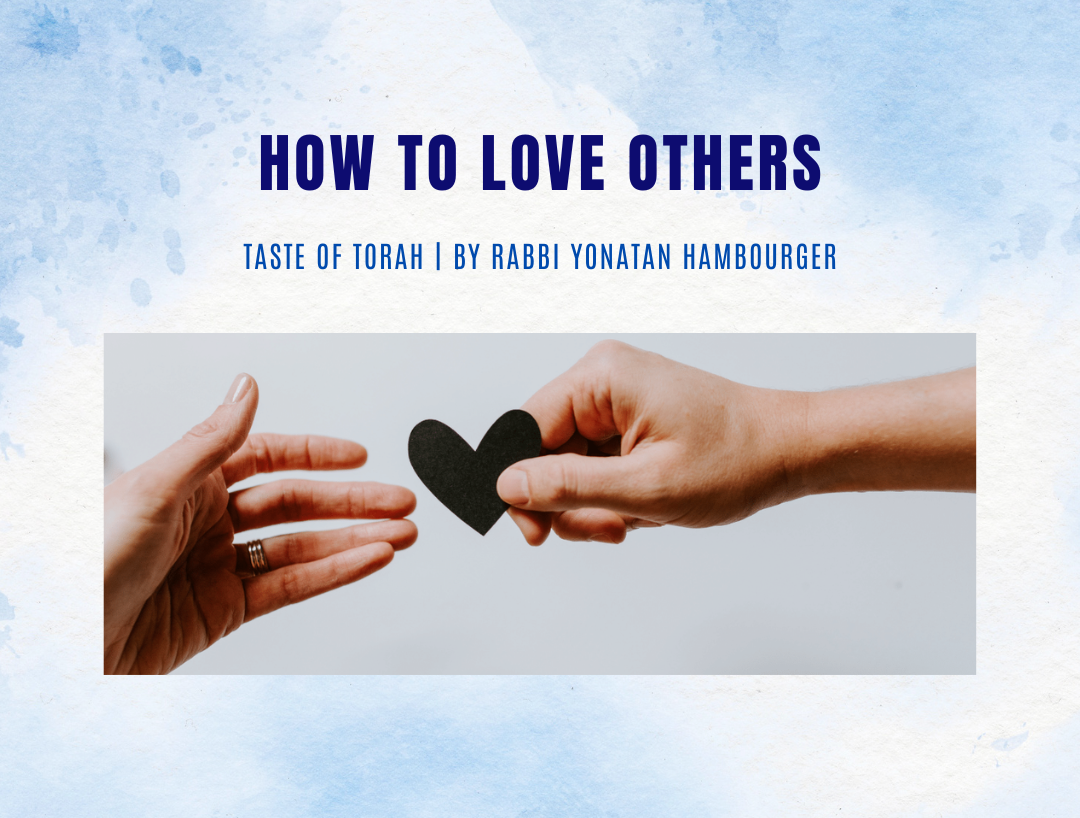
How To Love Others
Today's message is derived from this week's Torah portion, Nitzavim, found in the Book of Deuteronomy (29:9-11). In this passage, Moses addresses the Children of Israel, stating, “You are all standing today before G-d… the leaders of your tribes, your elders, your sheriffs… from your woodcutters to your water drawers.”
Essentially, Moses conveys that to receive G-d’s unconditional love, we must extend unconditional love to one another.
Reflecting on the 1969 Woodstock festival brings to mind the lyrics: “Come on people now, smile on your brother; everybody get together; try to love one another right now.” This sentiment represents a noble aspiration that has often fallen short of reality.
So how can we strive toward such an ambitious objective? It is important to recognize that some individuals may be seen as "leaders," while others may fulfill roles such as "water drawers." What common ground can exist among people with such diverse social standings?
Firstly, who determines who ranks higher in terms of achievement? We often find ourselves overestimating our own value and undervaluing others. Furthermore, even if our self-assessment is accurate, excelling in one area does not preclude others from surpassing us in different domains.
Every individual holds leadership potential in a particular area; thus, our collective success hinges on each person's unique contributions.
Moreover, the disparity between our Creator and any other being is immeasurable. Understanding our relative insignificance compared to G-d's absolute reality helps dissolve any perceived superiority we might harbor over others. After all, G-d fashioned all humanity from a single individual—Adam—thereby negating claims of superiority among people.
By taking these considerations into account, we can genuinely unite—not only through feelings of affection for one another but also through actions that reflect the authenticity of those sentiments.
Shabbat Shalom,
Rabbi Yonatan
September 19, 2024
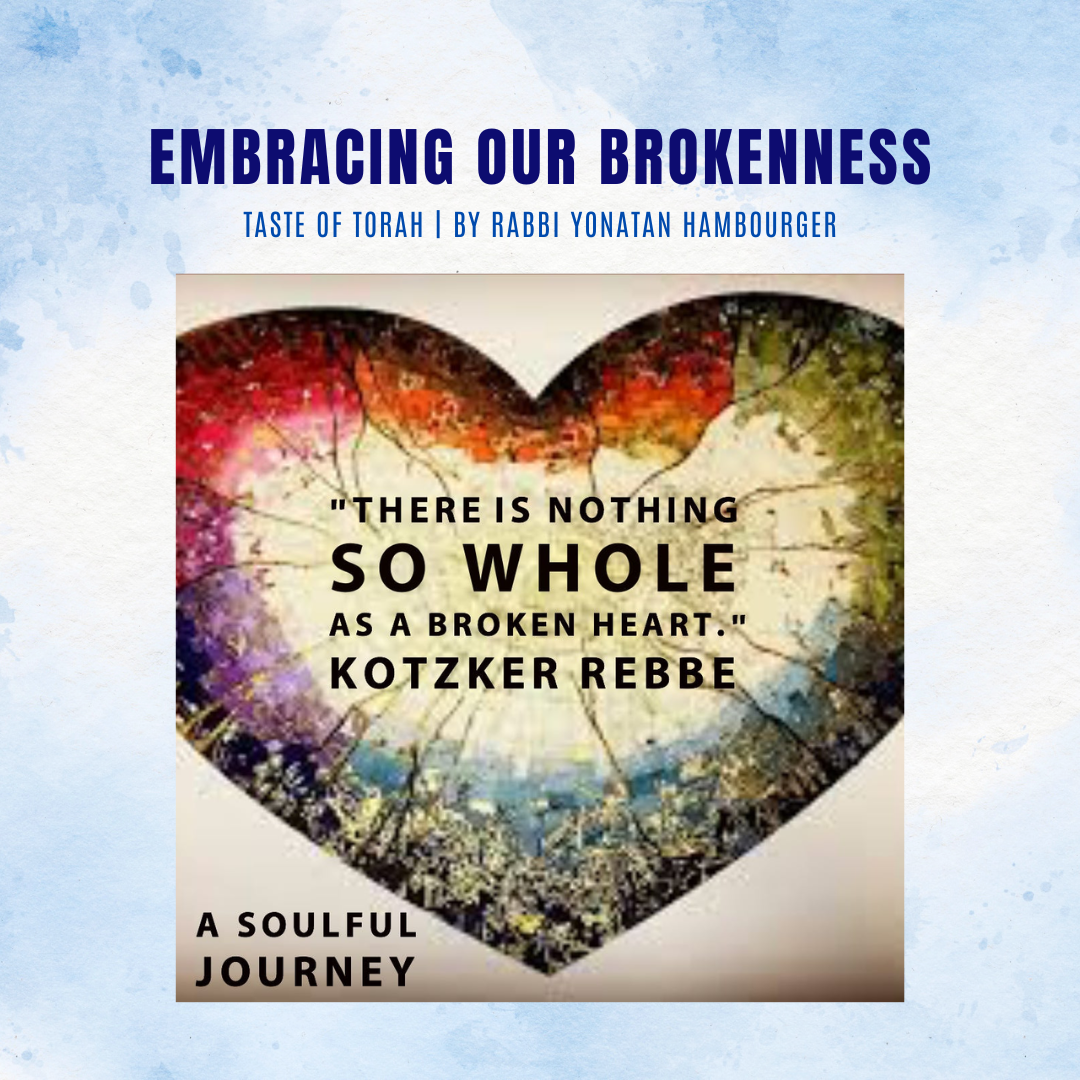
Embracing Our Brokenness
If you had the chance to transform your very essence, inviting a flow of blessings into your life, would you seize it? The time leading up to Rosh Hashanah presents this remarkable opportunity for renewal.
It was at this very time that Moses sought and secured divine forgiveness for the Children of Israel after the transgression of the Golden Calf. G-d also gave Moses a formula for generations to come, empowering them to realign with their true path and access the flow of divine goodness.
We too can harness this precious period to find compassion and forgiveness—for ourselves and others.
We begin this journey by releasing any lingering negativity. This doesn’t mean dismissing our feelings of hurt or anger; rather, it calls us to transcend these emotions by recognizing the limitations of both our own character and that of others.
In doing so, we cultivate the compassion we yearn for from G-d.
Next, we embark on a spiritual inventory that allows us to reconnect with what truly matters in life. This involves acknowledging our missteps and lost opportunities while also celebrating our positive contributions over the past year.
While it may seem simpler to focus exclusively on future goals, true progress requires us to reflect deeply on our past because in the words of the Kotzker Rebbe, “there is nothing so whole as a broken heart.”
The journey toward wholeness begins with embracing our brokenness; thus, every pain we endure serves as a hidden blessing.
May each one of us welcome an abundance of revealed blessings into our lives in this New Year and beyond!
Shabbat Shalom,
Rabbi Yonatan
September 12, 2024
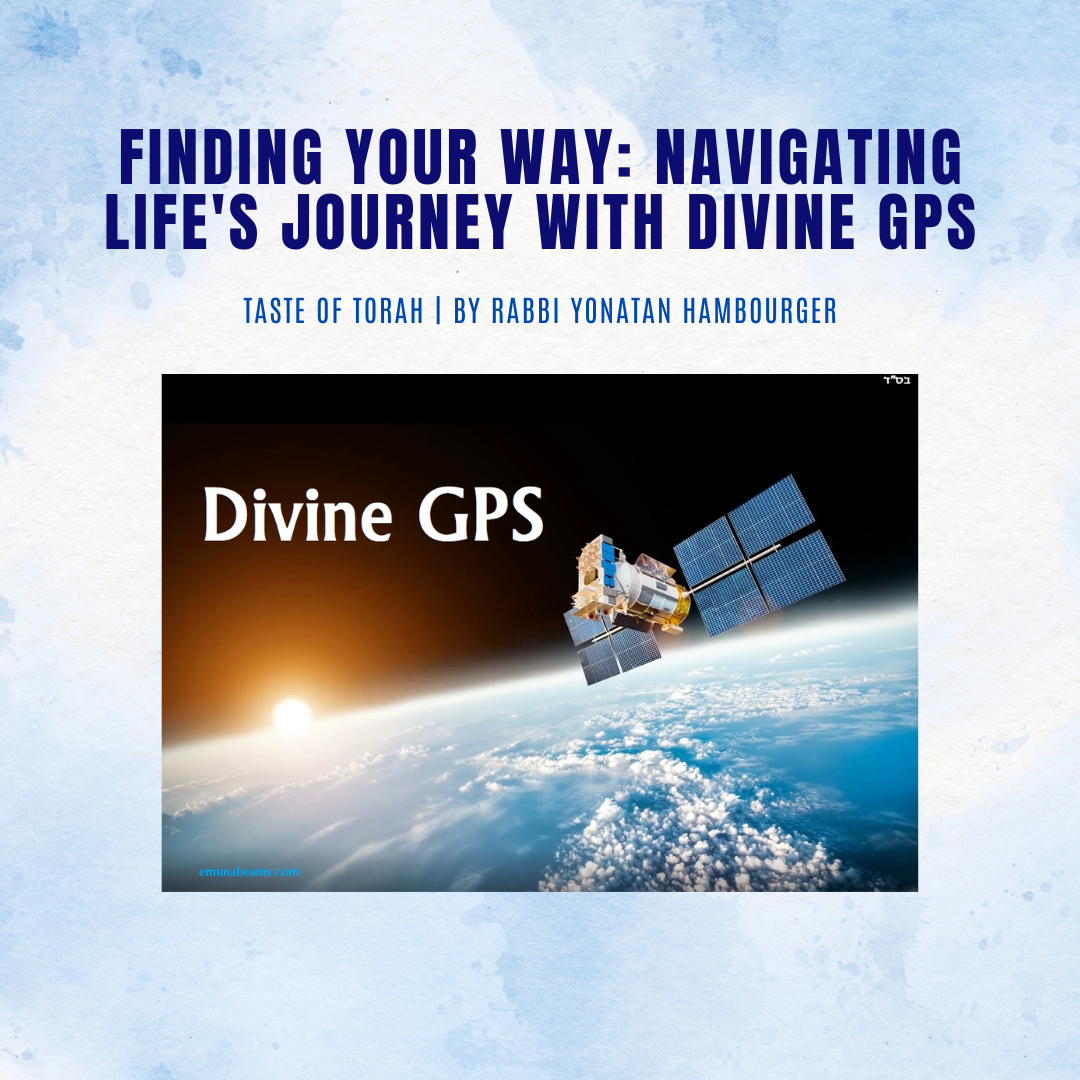
Finding Your Way: Navigating Life's Journey with Divine GPS
Have you ever experienced the unsettling feeling of driving confidently, only to realize you’re hopelessly lost? In a world before GPS technology, people would wander aimlessly, relying on the advice of strangers, often leading them astray.
Today, however, we live in an age where a simple voice command can set us back on the right path. “Rerouting,” your device chirps, offering a new direction and hope for the journey ahead.
Yet it’s fascinating how many of us only take those vital course corrections in life when we reach a breaking point. As despair mounts, we may turn to sources that don’t truly understand our needs, leaving us feeling even more stuck.
Fortunately, there’s a powerful tool available to us: what we might call “GPS for the Soul.” This divine navigation system is activated by inviting G-d into our lives to help us find our true path. But what happens when our spiritual signal is weak?
During the spiritually charged month leading up to Rosh Hashanah, our connection to G-d is stronger than ever, with little effort required on our part. All we need to do is make the “first move!”
God loves you unconditionally and is eagerly waiting for you to reciprocate that love. So let go of any doubts that may be weighing on your heart. Activate your spiritual GPS by simply reaching out. Remember, this connection is as simple as a heartfelt plea—truly voice-activated!
Now is the perfect time to strengthen this bond before the grandeur of Rosh Hashanah commences, when God returns to His celestial throne. Let us seize this moment to realign ourselves, fostering a deeper connection that will guide us through the coming year.
Embrace the journey ahead, for with every step taken in faith, we can navigate the twists and turns of life with divine assurance. Your destination awaits!
Shabbat Shalom,
Rabbi Yonatan
September 5, 2024
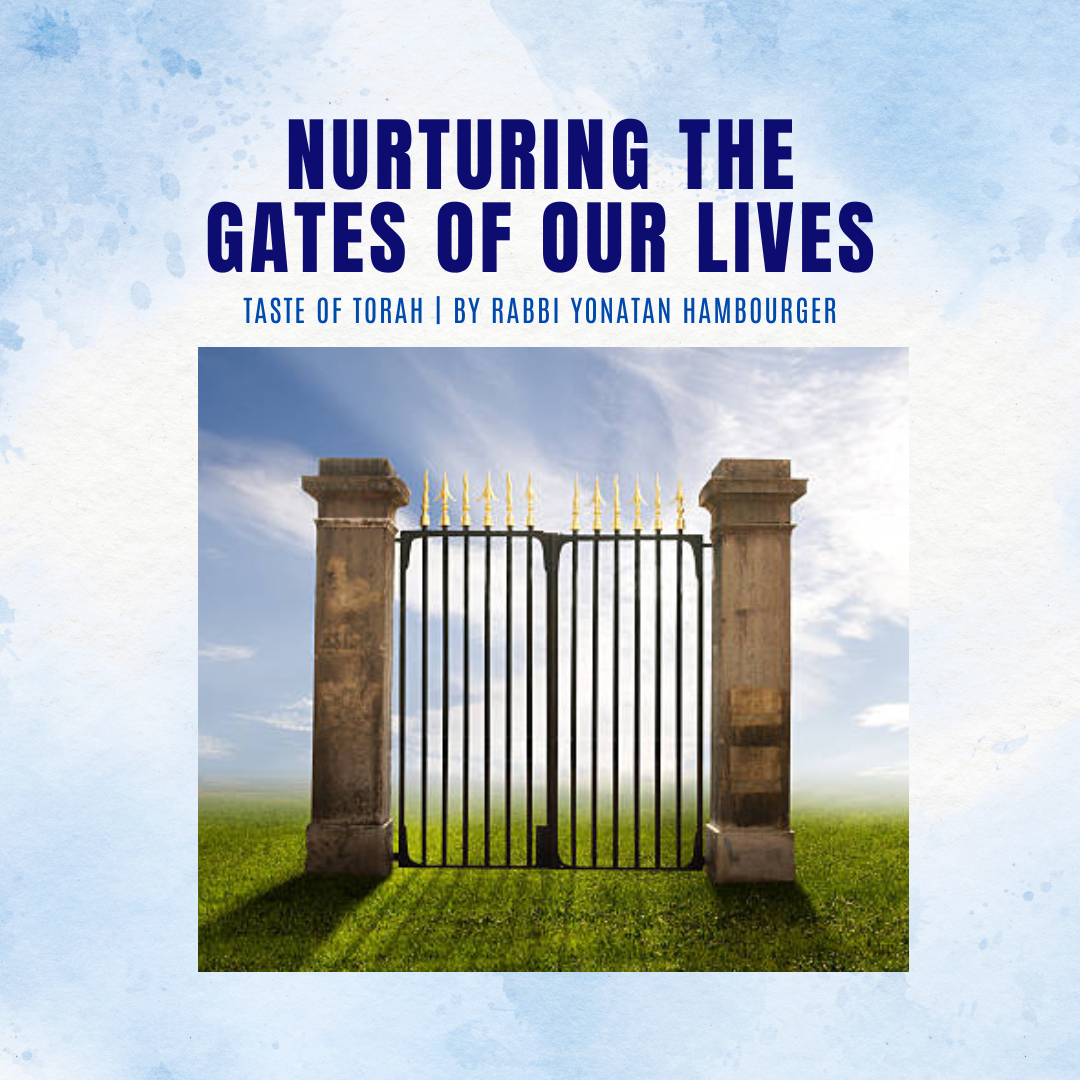
Nurturing the Gates of Our Lives
This week's Torah portion of Shoftim is from the book of Deuteronomy, Chapters 16:18 to 21:9. Therein, Moses conveys a fundamental instruction to the Children of Israel stating: “You must appoint judges and officers for yourself in all your cities.”
The Hebrew word for “cities,” she’arecha, literally translates to “gates.” These gates serve as a metaphor for our senses—our ears, eyes, nose, and mouth—acting as conduits through which we interact with the world around us. This imagery serves to remind us how these sensory experiences shape our internal lives.
This teaching underscores the importance of appointing judges and officers who will safeguard these gates from negative influences that could compromise our spiritual health. By learning scripture and consulting with our spiritual advisors, we become adept at distinguishing between influences that enrich our souls and those that pose a threat to our true selves.
The role of the officer is to execute the decisions made by the judge. Analogously, our internal officers symbolize the coping strategies we develop to counteract the temptations and distractions that challenge the wisdom of our inner judges.
The Prophet Isiah tells us that in the Messianic future, G-d promises to "restore your judges as in former times." Notably absent from this promise is the mention of restoring officers, because in that future time, negativity will lose its power over us. Thus, we will not require protective measures to align ourselves with G-d’s intentions. May this occur speedily, in our days.
By nurturing our spiritual gates and developing our internal judges and officers, we can aspire toward a future of justice, peace, and divine connection.
Shabbat Shalom,
Rabbi Yonatan
August 29, 2024
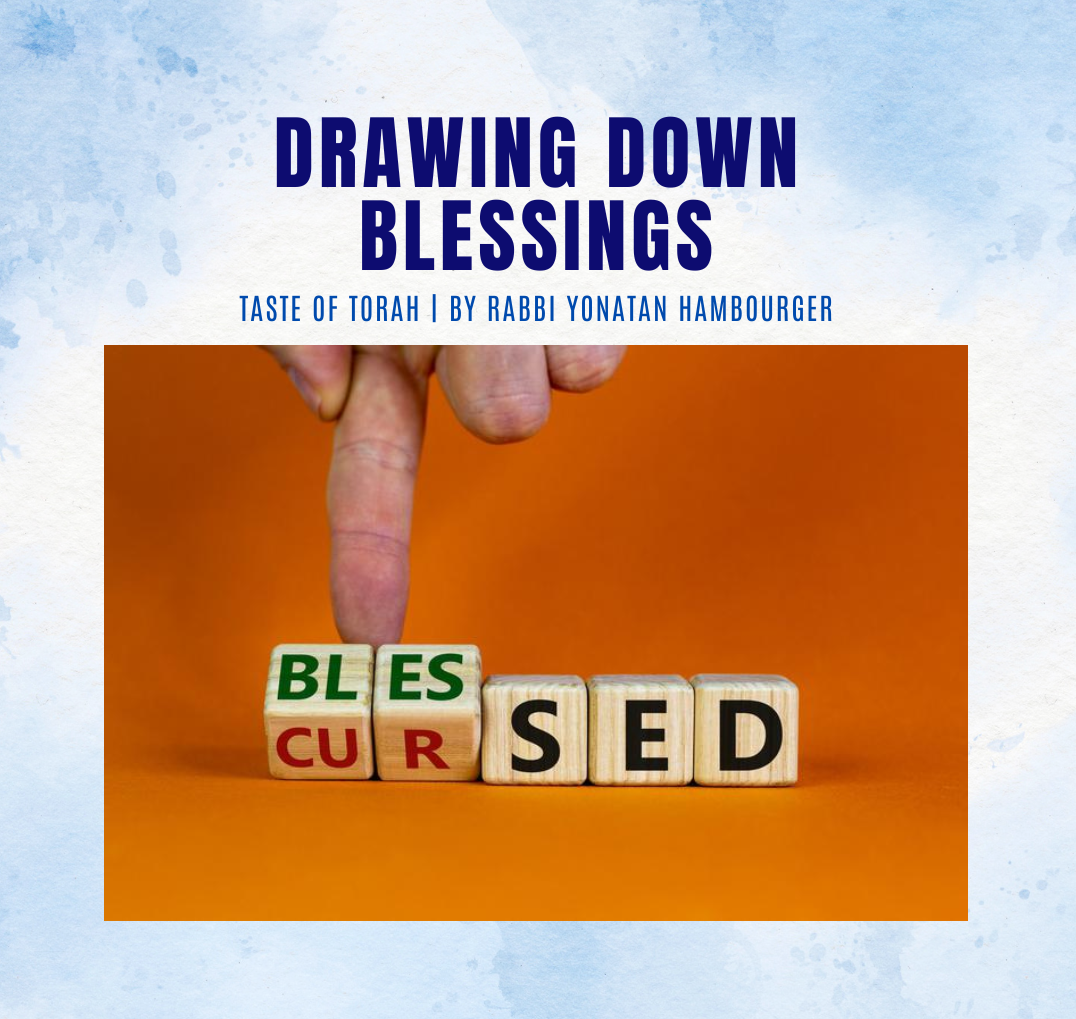
Drawing Down Blessings
In this week’s Torah portion of Re’eh, Moses inspires the Children of Israel to recognize the profound gift of choice bestowed upon them by G-d, which allows them to choose between good and evil. This pivotal decision leads either to a life enriched with blessings or one shadowed by curses.
G-d embodies goodness and desires nothing but the best for all His creations, equipping us with everything necessary to fulfill our purpose in this world. He wants us to use His gifts of vibrant health, joyful families, and financial abundance, inviting us to partner with Him in a divine mission.
Yet, despite these divine gifts intended for us, obstacles may arise that hinder their arrival. It is not that G-d holds back; rather, our own actions can obstruct the flow of blessings from potentiality into reality. In such moments, we find ourselves in need of a “blessing,” to open a channel to receive His goodness in an open and revealed way.
A blessing does not bring something new into existence; instead, it clears away barriers so we can embrace what G-d has always envisioned for us. When G-d proclaims in Deuteronomy 11:26, “Behold, I set before you today a blessing and a curse,” He empowers us to realize that our choices dictate how much of His stored blessings will manifest in our lives.
And it gets better still! As we align ourselves more closely with our divine purpose, G-d generously amplifies the resources available to help us achieve our aspirations. Not only do we gain access to the treasures He has set aside for us, but we also have the opportunity to expand the abundance flowing into our lives.
Shabbat Shalom,
Rabbi Yonatan
August 22, 2024

The Battlefield
The children of Israel lived an idyllic life in the desert for 40 years with their every comfort provided for in miraculous fashion. And, with Moses at the helm, they handily beat all their enemies.
But in this week’s Torah portion of Eikev, The Israelites are poised at the border of Israel as fear and dread set-in.
For the people understood that Moses would not accompany them into the Promised Land, to manipulate nature, nor was G-d going to perform any Hollywood style miracles. They would seemingly have to confront the enemy all by themselves, on an even playing field.
Therefore, Moses prepares the Israelites in Deuteronomy 7:17-21, “will you say to yourself that these nations are more numerous than us; how will we be able to drive them out? You shall not fear them…for the L-rd your G-d is in your midst and is great and awesome.”
Moses didn’t deny that the enemy was vastly superior. Rather he reassured the people that G-d would insure their victory. They only needed to do their part on the battlefield, and G-d would arrange a favorable outcome.
So too, we each face intrapersonal and interpersonal battles which seem unconquerable. Whether overwhelmed by life’s troubles, or enslaved by our own impulses, we’d be foolish to underestimate their significance.
It might be true that we do not have the ability to succeed based only on our own power. So, here Moses reminds us that we are not alone on life’s battlefield, when he says in Deuteronomy 7:22, “The L-rd, your G-d, will drive out those nations from before you, little by little.”
It’s true that the process can be slow, but with consistent effort and determination, we can vanquish our “enemies.” Gd wants us to put forth the effort, but when we do so, He personally guarantees our victory.
Shabbat shalom,
Rabbi Yonatan
August 15, 2024

Sometimes a Step Backwards Becomes a Giant Leap Forward
A foundational belief in Judaism asserts that every descent is for the sake of an even greater ascent. Since the Almighty wants only good for us, a setback becomes a springboard for greater achievement.
We are now learning the final book of the Five Books of Moses. Whereas the first four books are spoken by G-d, the book of Deuteronomy is written in Moses’s voice, wherein he retells the story of the ancient Israelites and their journey from Egypt.
The children of Israel were concerned about the challenges that awaited them in the Holy Land where they would have to deal with preparing meals, earning a living, and the like. Afterall, in the desert, G-d provided all their needs, while they remained immersed in spirituality exclusively.
It looked like a descent. Yet, Moses reassured them that although it would be a departure from the comforts and G-dly revelation they enjoyed in the desert, it was specifically through embracing physicality, that they could connect the mundane with the divine.That Moses speaks rather than G-d, also seems like a descent. But it signifies that we must internalize the word of G-d, making it our own. He wants our connection to be relevant, and for us to embrace even His loftiest concepts, but in a natural and recognizable way.
Remember, if confronted with what appears to be a descent, it is actually a gift from G-d to lead you to a higher place.
G-d wants that you and I should use the materiality in our lives to create a world so holy, that He will dwell amongst us. We do this by acting kindly to everyone, regardless of differences. Let us bridge the current cultural and political divide one genuine smile at a time.
Shabbat Shalom,
Rabbi Yonatan
August 8, 2024
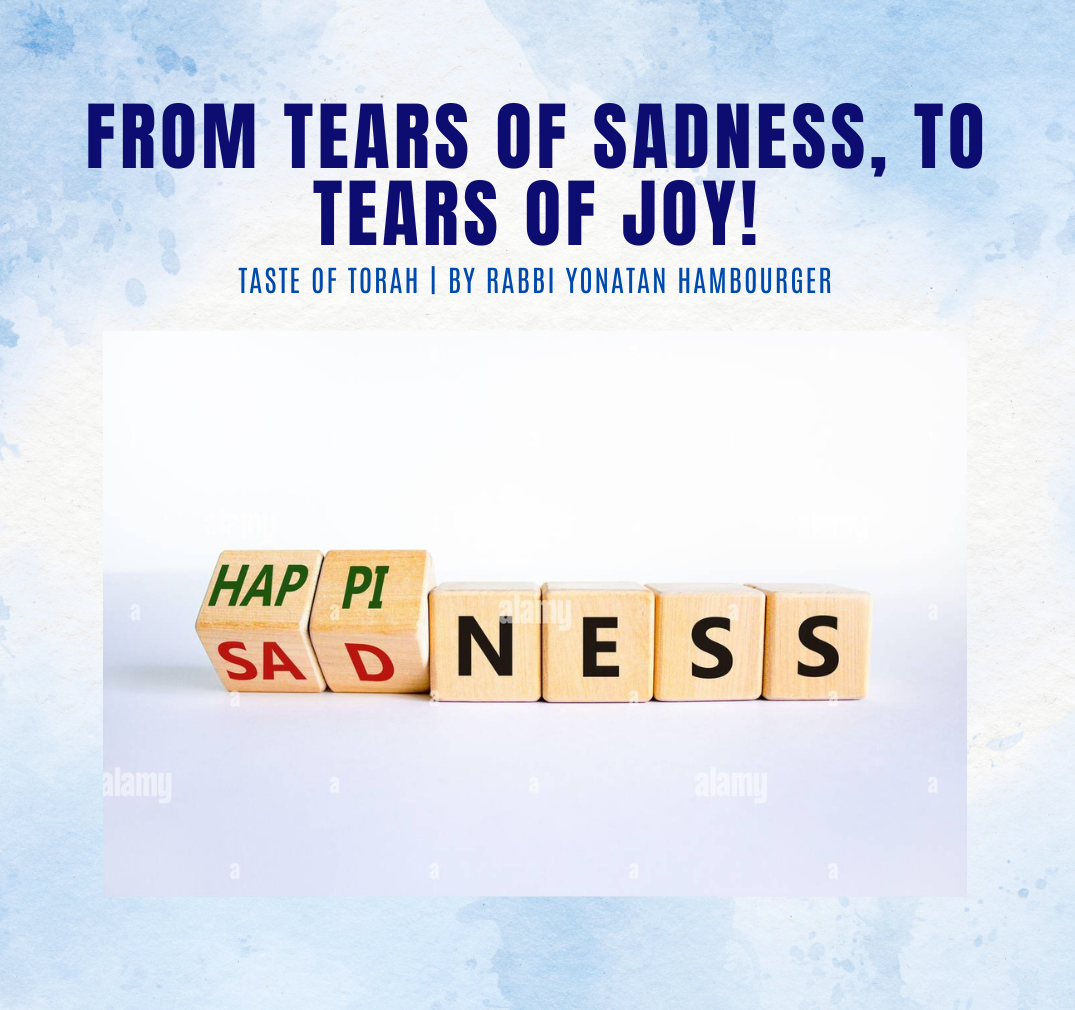
From Tears of Sadness, To Tears of Joy!
The Code of Jewish Law instructs the Jewish people to decrease in joy during their nine-day period of national mourning, leading up to the saddest day of the year, known as Tisha B’av.
The first of the Nine Days of mourning began last Monday, August 5th, and culminates on “Tisha b’Av,” marked by 25 hours without food or water beginning next Monday evening, August 12th.
Tisha b’Av memorializes many historical tragedies that befell the Jewish people on this date, including the destruction of both the First and Second Holy Temples, in 586 B.C.E. and 70 C.E. respectively.
In addition to fasting on Tisha b’Av, it is custom to sit on the floor in the synagogue with the lights dimmed low, reciting the book of Lamentations, while tears and cries of anguish flow without inhibition.
A story is told that on the night of Tisha b’Av, Napoleon Bonaparte was strolling in his capital city of Paris. Low and behold he heard crying and sobbing coming out of a dimly lit synagogue.
When told that the Jews were mourning the loss of their Holy Temple, Napoleon was so moved that he offered to personally provide the funds to rebuild their Temple.
When the Emperor learned that the Holy Temple was in Jerusalem, and was destroyed over 1,700 years ago, he replied:
“If indeed this people is mourning their Temple after almost two millennia, such a people so attached to their history, will indeed be restored to their land and their Temple rebuilt.”
May the third and final Holy Temple in Jerusalem be speedily rebuilt and usher in an era of peace and plenty where humanity will be solely focused on learning and practicing the ways of G-d.
Wishing you a Shabbat Shalom,
Rabbi Yonatan
August 1, 2024
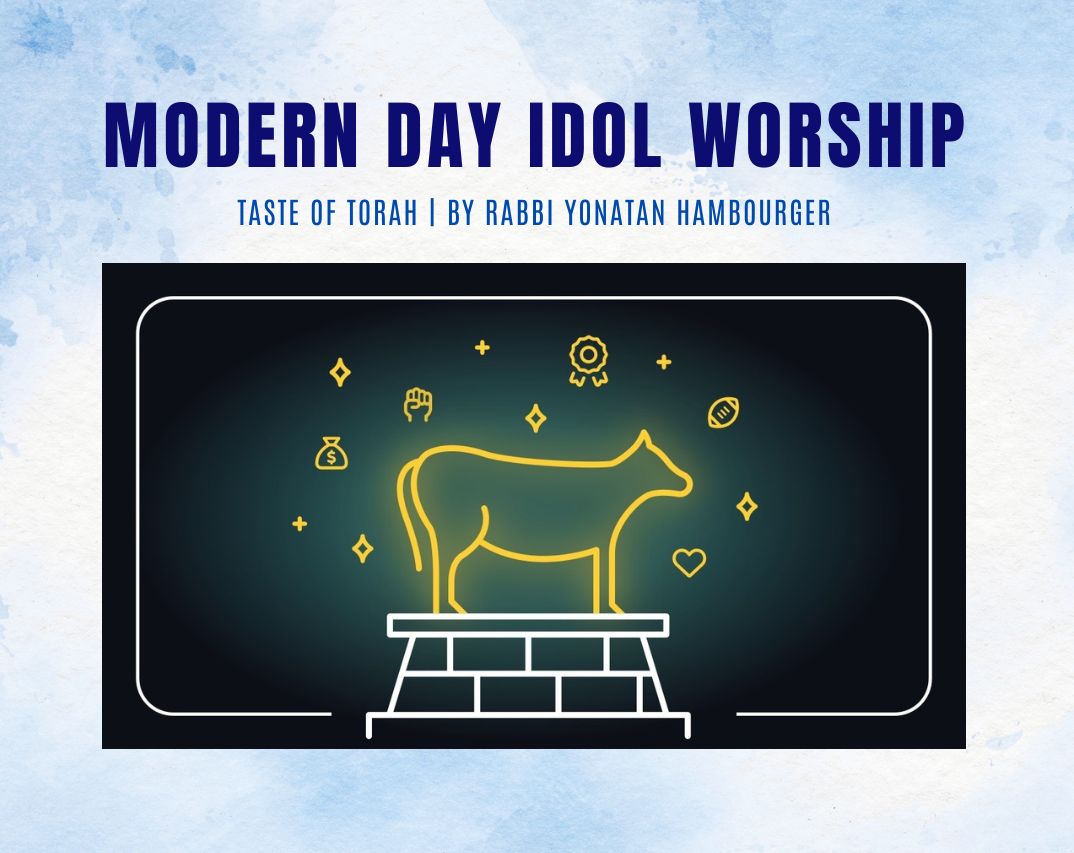
Modern Day Idol Worship
In this week’s Torah portion, upon entering our Promised Land G-d instructs Moses to tell the Children of Israel to destroy all remnants of idol worship, even the most subtle forms left by the previous inhabitants.
The word for idolatry in Hebrew can be translated as “foreign servitude.” I am not aware of many people today bowing down to graven images, but many do indeed serve foreign gods in their insatiable quest for money, success, beauty, control, and fame.
The Torah teaches us that all our choices in life fit into three broad categories: the holy, the forbidden, and the permissible.
Though not necessarily easy, the holy as well as the forbidden are relatively simple, notwithstanding all the “thou shall’s”, and “though shall nots.”
But our mission is to take what’s permissible (the third category), and turn that into something holy. For example, what about a steak dinner?
How do you turn a grilled ribeye (kosher ribeye if you’re Jewish) into something holy? You thank G-d before and after you partake, and then use your added vitality to engage in even more acts of goodness and kindness.
Our goal is to develop the simple awareness that everything comes from G-d!
When we learn to orient even our most mundane, permitted activities towards holiness, we live free of the inner conflicts that take their toll on the physical, mental, emotional, and spiritual health of so many people.
Our job is to become spiritual samurai and smash our inner idols. What awaits us is the Promised Land of joy and peace that comes from G-d oriented living!
Wishing you a Holy Shabbos,
Rabbi Yonatan
Enter your text here.
